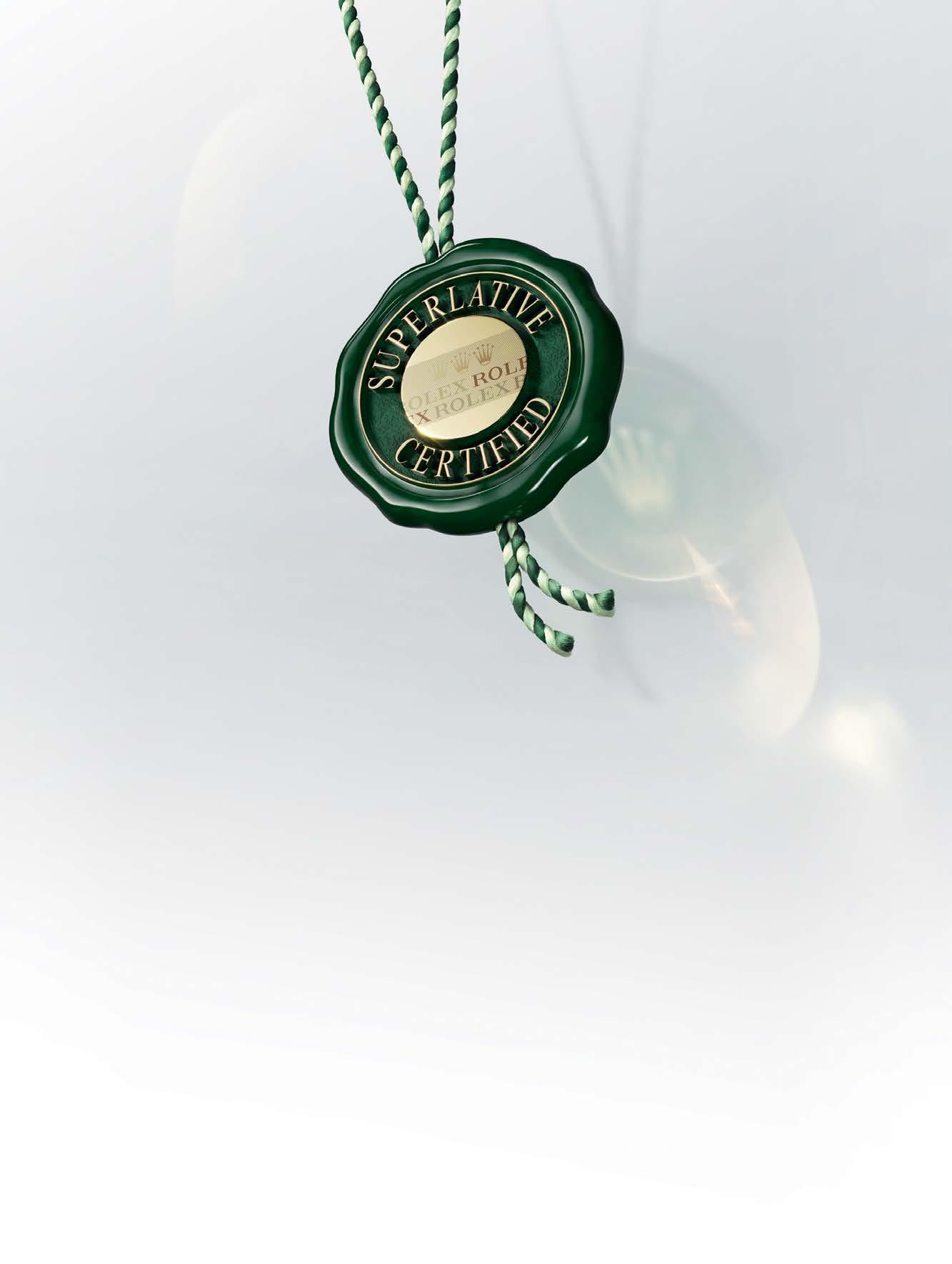LIFE, LOVE, AND LEGACY/ Veronica Berti Bocelli P.15
FORMULA FOR SUCCESS/ The portrait of a (truly) great founder P.65

H.E. ALIA BINT ABDULLAH AL MAZROUEI UAE Minister of State for Entrepreneurship/ P28

LIFE, LOVE, AND LEGACY/ Veronica Berti Bocelli P.15
FORMULA FOR SUCCESS/ The portrait of a (truly) great founder P.65

H.E. ALIA BINT ABDULLAH AL MAZROUEI UAE Minister of State for Entrepreneurship/ P28

Bringing luxury seaside living to Sharjah for the first time, owners at the Anantara Sharjah Residences enjoy access to the Anantara Sharjah Resort’s world-class amenities, including an infinity pool, five distinctive restaurants, an Anantara Spa and a state-of-the-art gym. As an investment, owners can enjoy the benefits of a rental management scheme operated by Anantara Hotels, Resorts & Spas, allowing them to maximize their returns when they are not resident in the property.
To register your interest, visit arada.com
LIFE IS A JOURNEY.
→ Briar Prestidge is the founder and CEO of Prestidge Group.

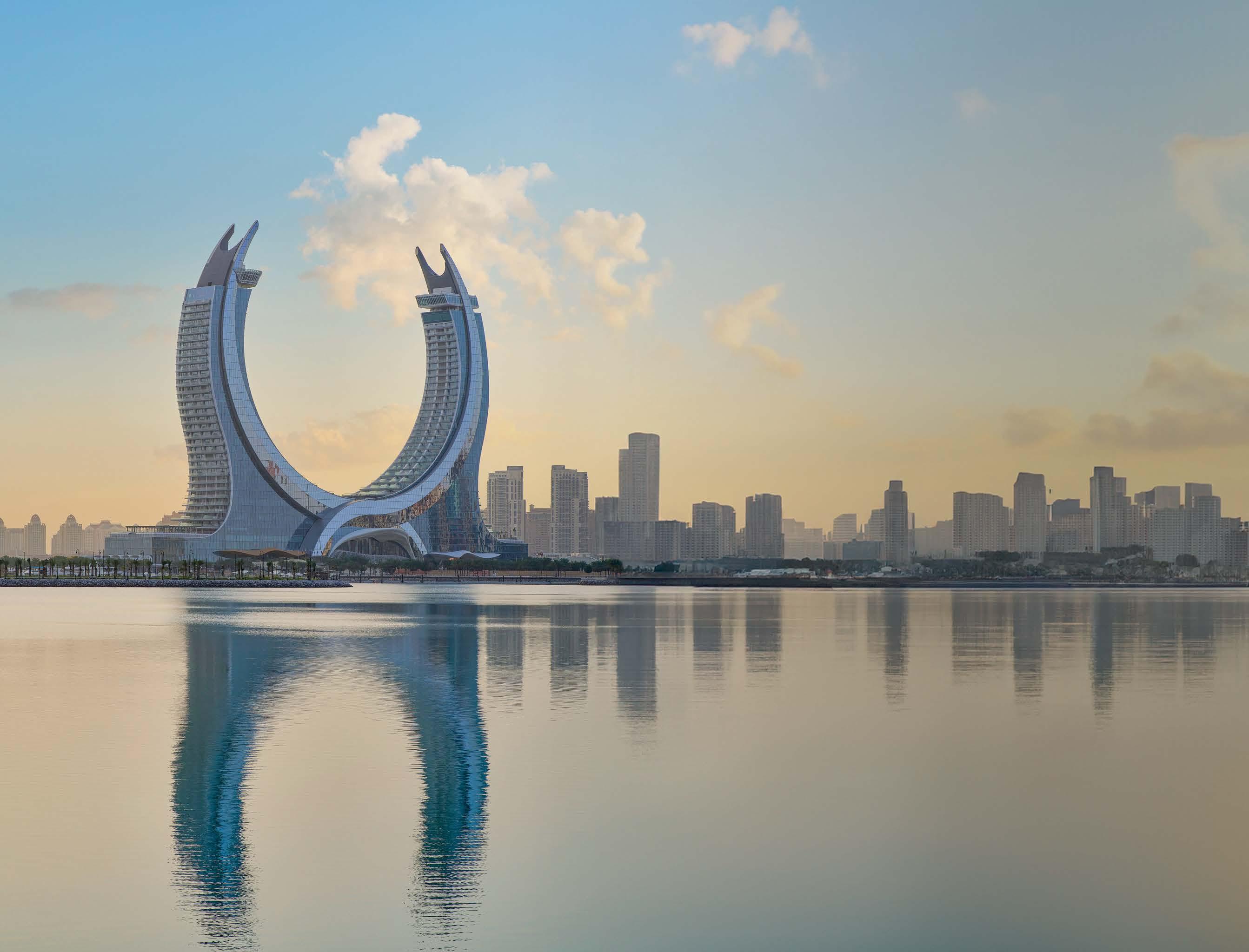
Nestled by the coast of Lusail sits the splendor of Raf es and Fairmont Doha, where luxury is rooted in even the smallest details. Open the doors to mesmerizing hospitality and make memories in a world of sophistication.



Step into a world of opulence when you book a Suite at Raffles Doha.
Experience the added luxury of QAR 750 credit to spend on dining in the hotel, and QAR 500 towards any Spa treatment.
Children aged 12 and below are welcome to indulge in the enchantment of complimentary dining.
Rates starting from QAR 3,500 per night
For reservations, please call +974 4030 7100 or email reservations.doha@raffles.com


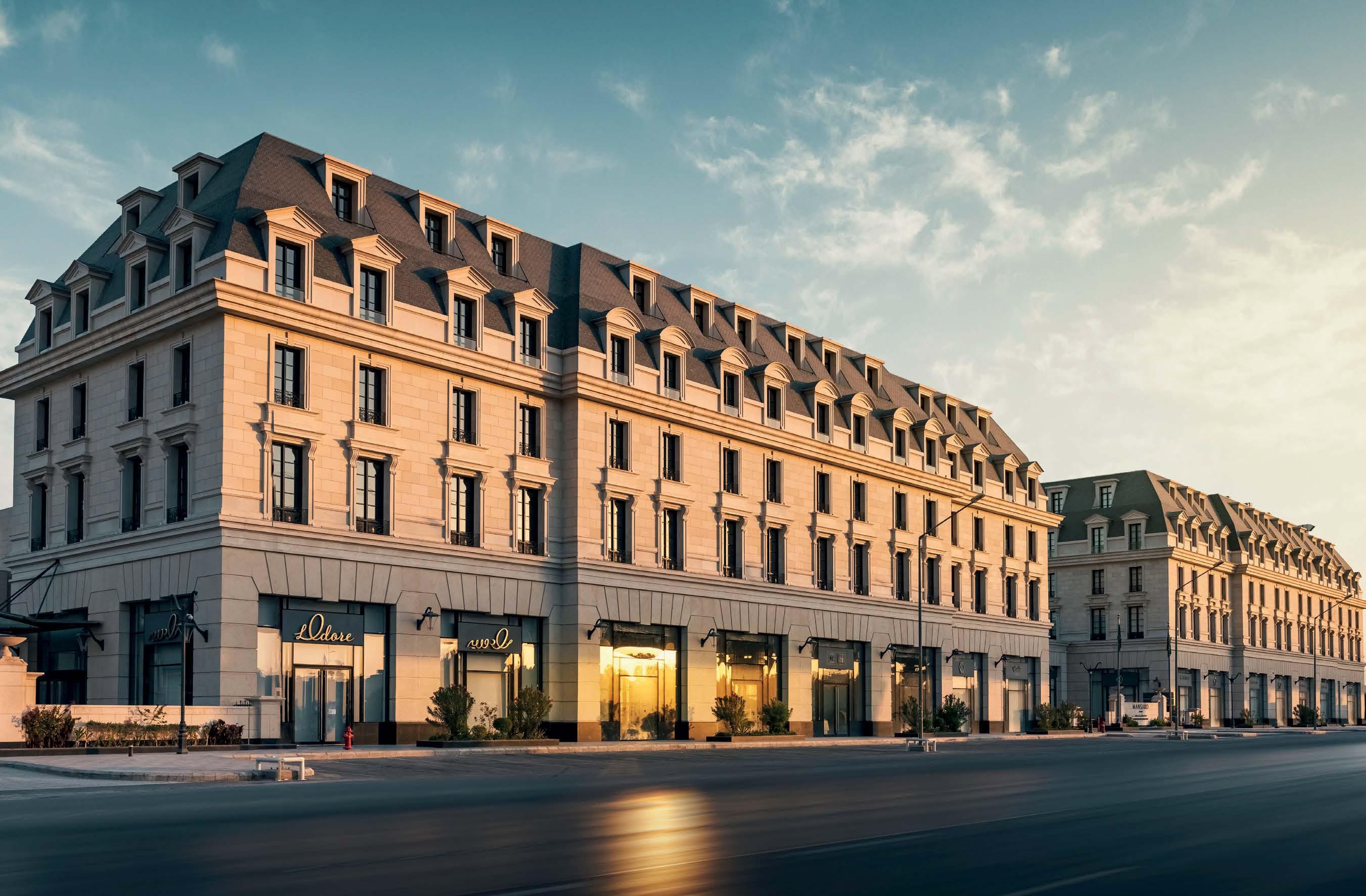




71 Converging Insights
GITEX GLOBAL 2024, running from October 14-18, 2024, at Dubai World Trade Centre, is set to feature a stellar lineup of speakers.
94 “In The Loop”
UAE-headquartered E DADDY raises US$15 million in a funding round.
15 In Harmony
How VERONICA BERTI BOCELLI balances life, love, and legacy.
20 For a Greener Future
Meet the MENA startups in the MEGA GREEN ACCELERATOR program that are developing disruptive solutions to pressing sustainability challenges.
60 Mastering the Art of Shirting
Ascot & Chapels’ GARY SWEENEY offers the tailor’s guide to wearing shirts right.
77 Catalyzing Change
Holo co-founders MICHAEL HUNTER and ARRAN SUMMERHILL believe their startup can transform the process of buying a home in the UAE (and beyond).
82 IN FOCUS
Check out a selection of the companies enrolled in the MOHAMMED BIN RASHID INNOVATION FUND (MBRIF) accelerator program.
90 Doomsday or Dawn?
JONATHAN LABIN analyzes artificial intelligence’s radical reinvention of software as a service.
72 Everyone’s Talking, but Nobody’s Listening
PURVA GROVER lists how you can make yourself stand out as a thought leader.
EDITOR IN CHIEF Aby Sam Thomas aby@bncpublishing.net
CEO Wissam Younane wissam@bncpublishing.net
MANAGING DIRECTOR Rabih Najm rabih@bncpublishing.net
ART DIRECTOR Simona El Khoury
MANAGING EDITOR Tamara Pupic tamara@bncpublishing.net
FEATURES EDITOR Aalia Mehreen Ahmed aalia@bncpublishing.net
DIGITAL SOLUTIONS DIRECTOR Mahdi Hashemi mahdi@bncpublishing.net
DIRECTOR OF INNOVATION
Sarah Saddouk sarah@bncpublishing.net
GROUP SALES DIRECTOR – B2B GROUP Joaquim D’Costa jo@bncpublishing.net
COLUMNIST Tamara Clarke
CONTRIBUTING WRITERS
Fida Chaaban, Devina Divecha, Purva Grover, Jonathan Labin, Gary Sweeney, Khaled Talhouni, Nadine Zidani
SUBSCRIBE
Contact subscriptions@bncpublishing.net to receive Entrepreneur Middle East every issue
COMMERCIAL ENQUIRIES sales@bncpublishing.net
ENTREPRENEUR.COM
Access fresh content daily on our website
Entrepreneur-me
If you want to stay innovative, you’ve got to have perspective
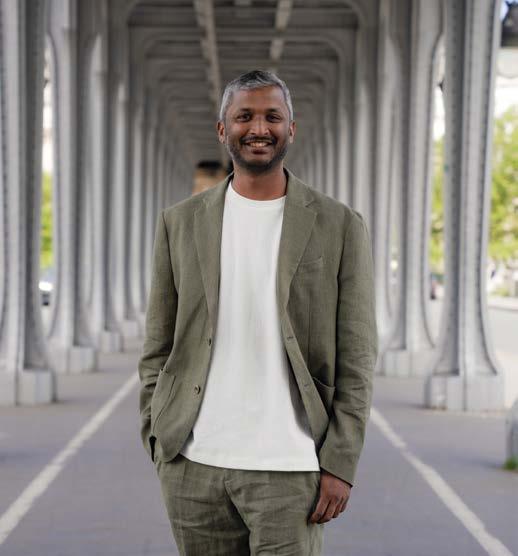
Ihave always said that even the most innovative leader, the most decisive founder, and the smartest CEO all need perspective. And I always endeavor to apply what I preach—so, to stay on top of my game, and in support of keeping a great publication fresh, I have decided to step down from my role as the Editor in Chief of Entrepreneur Middle East. After nearly a decade of working with this brand, I’m sure you can understand that it was not at all easy for me to make this decision. Not only has it been an absolute privilege for me to work on this platform that celebrates the entrepreneurial spirit, it has also been one of the most fulfilling experiences I’ve had in my career trajectory.
Of course, it’s been a rollercoaster ride being at the helm of Entrepreneur Middle East—I’m happy to admit here that as exhilarating as the highs were, there were plenty of lows too. And yet, looking back on all of it now, I just know that I’ll remember this journey only in the fondest of terms.
The opportunity to witness and document the growth of the region’s entrepreneurial ecosystem has been a profound honor, and I am supremely grateful for all the people I’ve been able to interact with along the way— from the innovators who chose to trust me with their stories, to the incredible members of my team who’ve always had my back.
As I now step away from my role at Entrepreneur Middle East, I do so with a deep sense of appreciation for everyone who has supported my work on this brand through the last 10 years. Your belief in our mission has been invaluable, and I’m truly proud of what we’ve accomplished together; now, I look forward to seeing how Entrepreneur Middle East will continue to impact and inspire.
As for me, rest assured that I shall remain a proponent for the region’s entrepreneurs—I don’t see myself ever stopping in my efforts to champion you and your stories. My commitment to this vibrant community will certainly continue, and I’m excited to explore the opportunities ahead.
Publications, for those of you who have lived it with us, have personas, and to stay innovative, sometimes, both magazines and editors need fresh takes. I’ll see you all soon—and thank you again for your support these many years.

Aby Sam Thomas Editor in Chief @thisisaby aby@bncpublishing.net











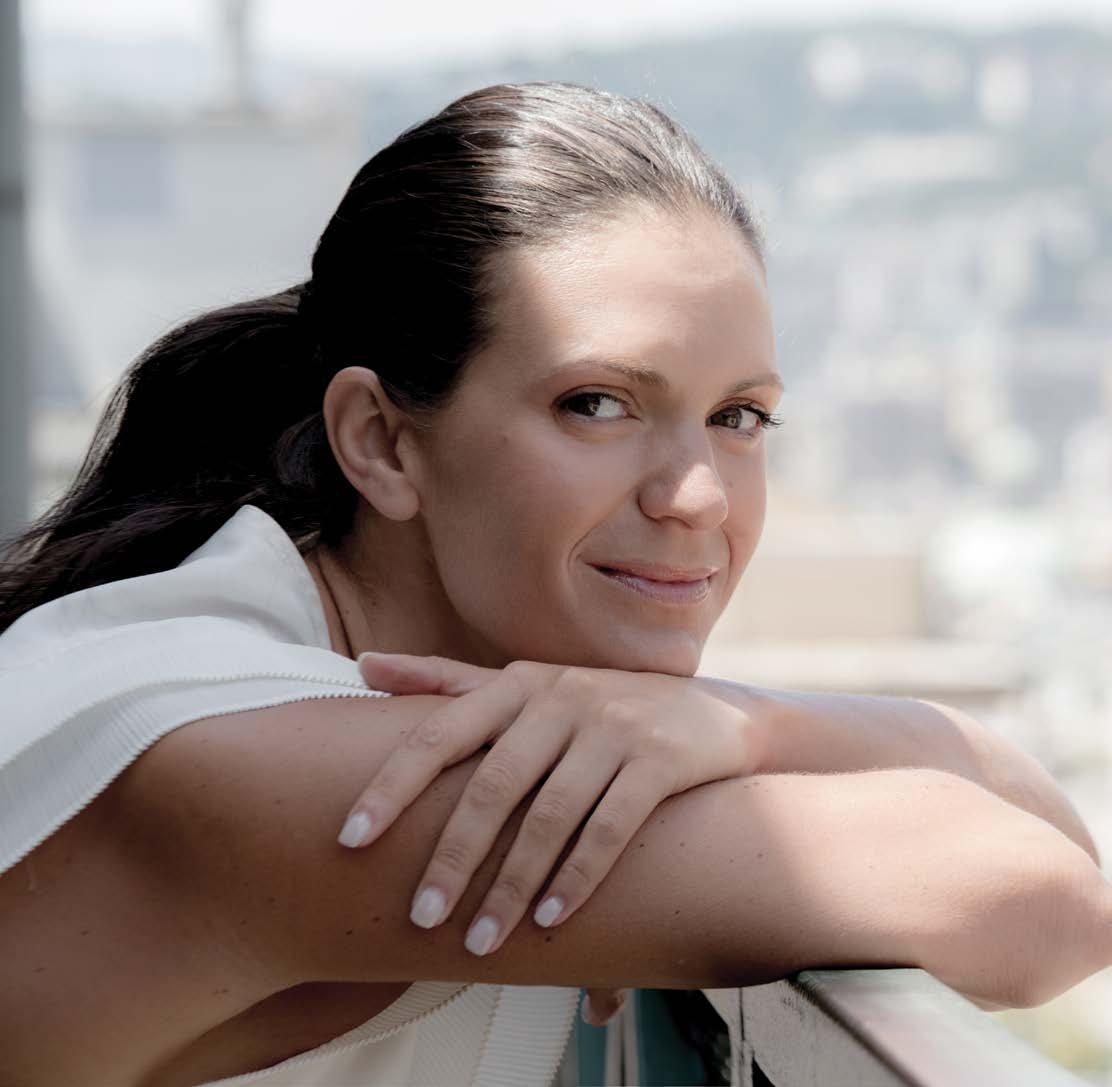
When I got the opportunity to interview Veronica Berti Bocelli at the Women’s Empowerment Convention that was staged in Dubai earlier this year, I went into it with the hope that I’d be able to craft a piece that focused solely on her, i.e., her work, her achievements, her journey, distinct from her role as the wife of one of the world’s most beloved tenors, Andrea Bocelli. But I soon came to realize that this would be a futile exercise—and that’s because besides being the spouse of the Italian maestro, the 43-year-old Veronica is also his profes-
sional manager (she is the CEO of Almud, aka the Andrea Bocelli Business Management Office), as well as the Vice Chair of his philanthropic undertaking, the Andrea Bocelli Foundation, and therefore, discussing her without mentioning him is practically impossible. As Veronica herself put it: “I began to exist as Veronica Berti Bocelli the moment I met Andrea… Yes, we’re a couple, and there are two of us, but at the same time, we are one single thing as well.”
}Veronica met Andrea in 2002, and though the two wed each other only in 2014, her husband has told The Guardian that “effectively, the marriage began when we
met.” But before their paths crossed, Veronica had— much like Andrea—been raised in the Italian countryside, where she grew up in an opera-loving family that made sure she was trained in classical music as well. Then, after a high school diploma from a scientific institute, Veronica went on to pursue a university education in literature and philosophy, and she eventually graduated with honors in the management of music and entertainment. While this moment kickstarted her foray into the business of music, it was a few years after she embarked on a relationship with Andrea—in 2006, to be exact—that he asked her to become his manager. At the
YOU CAN EITHER BE THE PERSON WHO SOLVES THE PROBLEM, OR THE PERSON WHO MAKES THE PROBLEM. THERE IS NOTHING IN THE MIDDLE.”
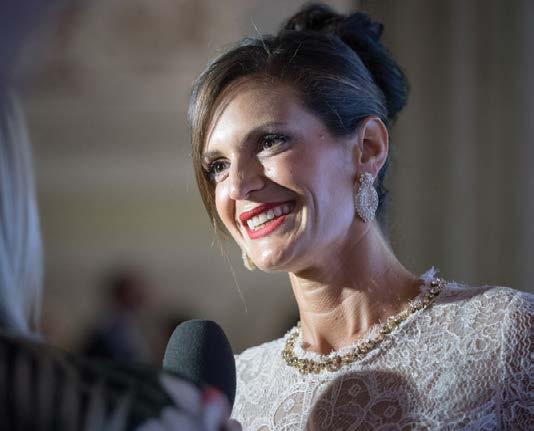
time, Veronica recalls being flabbergasted by his request; however, Andrea reassured her then that he was certain that she could do what the job demands. “Andrea is the embodiment of empowerment,” Veronica says. “He really believes that if somebody has the skills, you just need to give them the opportunity, and they will shine. And he’s always happy when people shine around him.”
}Now, it’s one thing for someone else to trust you to have the chops to get the job done—it’s another thing altogether for you to rise to

→
Andrea and Veronica met each other in 2002, and they got married in 2014.
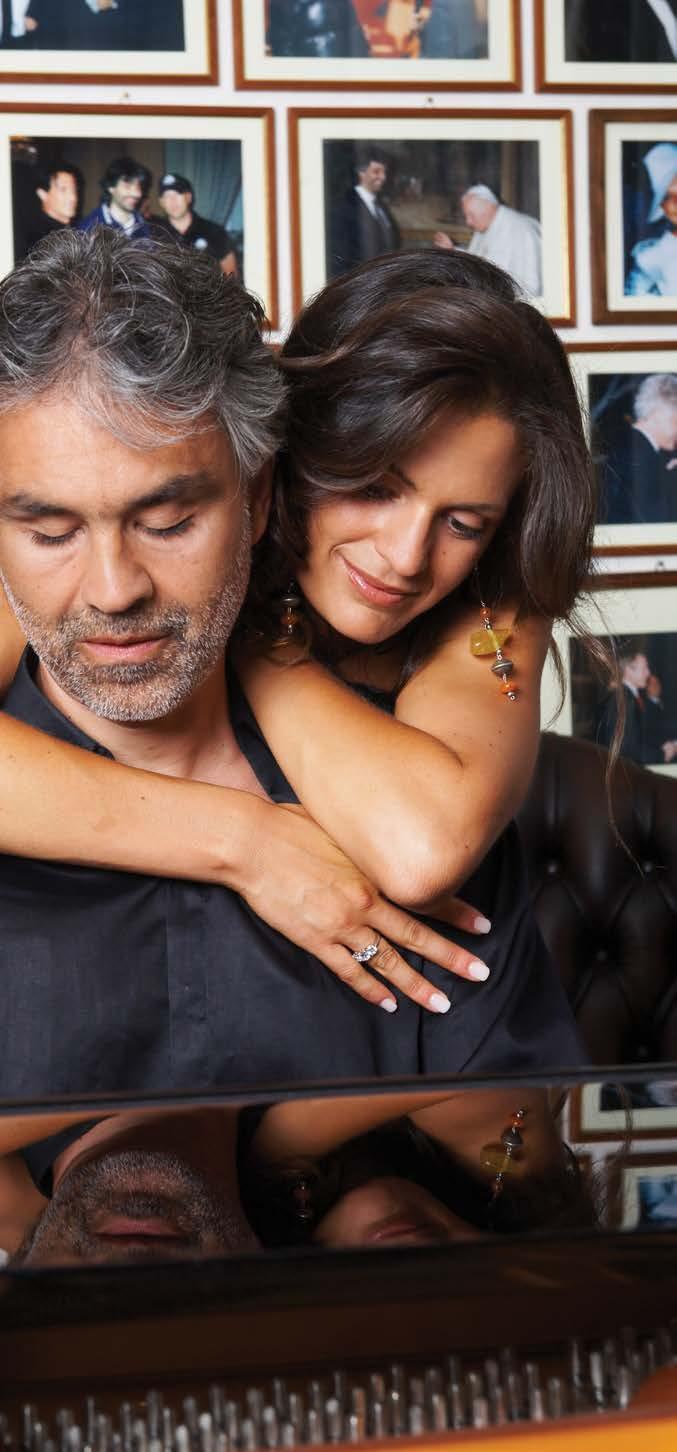
ANDREA IS THE EMBODIMENT OF EMPOWERMENT. HE REALLY BELIEVES THAT IF SOMEBODY HAS THE SKILLS, YOU JUST NEED TO GIVE THEM THE OPPORTUNITY, AND THEY WILL SHINE.”
the occasion and, well, do the work. In Veronica’s case, she was happy to jump in at the deep end as Andrea’s manager—and she didn’t have any qualms about getting her hands dirty in the process. “I’ve never cared about job titles,” she says. “I am more about watching out for what it is that we need to do, and then just doing it. If we need for a car to be driven, I’ll drive the car; I don’t need a driver to do that. If you need your luggage to be brought to you, I’m not scared to be seen bringing the baggage to you… I’d rather just get things done.” Now, this ethos offers a peek into Veronica’s innate nature— she reveals that she has always been someone who’s taken responsibility for everything around her; she’s all about taking charge, and simply tackling the challenge at hand. “You can either be the person who solves the problem, or the person who makes the problem,” Veronica declares. “There is nothing in the middle.”
}Veronica may have been apprehensive about accepting Andrea’s offer to be his manager all those years ago—however, she was certainly able to make an impact in this role. Since 2006, she’s been the one who has ensured Andrea’s presence at events all around the globe (notable examples include his appearance in New York City at “Concerto: One Night in Central Park,” which was attended by 80,000 people, or his performance in the Brazilian city of Belo Horizonte, which happened in front of an audience of 200,000 people), and thereby help continue growing his fame and celebrity as the biggest-selling singer in the history of classical music. Veronica has also been a key force behind the Andrea Bocelli Foundation, which was launched in 2011 with the mission “to empower people and communities in

the moment you really need it, when you need to make a difference, then you won’t have it; so, you need to be sure there is a little pocket of energy, of ideas, of strength, hidden somewhere, that you take out only in case of necessity. Now, I’ve learned that lesson. But as much as people can tell you about it, you have to face it yourself. You have to have some time at the bottom to understand how high you were before, and then you find the average, where you can just float right.”
}It also helps Veronica that she’s extremely clear about what drives her to do whatever she does for work—and that is the bond she has with Andrea, and the life that she has built with him. “I live for the gratitude of this person, the
IT TOOK ME MANY, MANY YEARS TO UNDERSTAND THAT IF I WAS NOT TAKING INTO ACCOUNT THAT I HAVE TO BE GOOD, THEN I CANNOT BE OF ANY HELP FOR OTHER PEOPLE.”
situations of poverty, illiteracy and distress due to illness and social exclusion.” In the years since, Veronica proudly points out that that the Foundation has been able to raise over EUR70 million in funds, with its projects spread across the world in locations like Italy, Haiti, Syria, and Iraq.
}Now, to say that the roles Veronica plays professionally are “demanding” might be putting it mildly, and one can imagine that her relationship with Andrea would only add to the taxing
nature of her job. Veronica admits that there have been times where the stress of it all has gotten to her—however, she has since learned to take things in stride. “It took me many, many years to understand that if I was not taking into account that I have to be good, then I cannot be of any help for other people,” she says. “But you have to go through that point, where you really reach the lowest point of your energy, to understand this… I remember my father saying that if you don’t maintain a little energy for
there’s no money that can buy that.” The feelings she has for Andrea have been echoed by him too—on his website, he states, “Veronica is my companion, my best friend, my lover, my partner in joy and pain; she is my go-to person, and she brings peace and unity into our family. She is also my manager. I can say that I was lucky enough to be able to share not only my private life, but also my professional life, with the woman I love.” Here, Veronica acknowledges that the relationship she shares with Andrea carries significant weight— but she wouldn’t have it any other way either. “When I represent my husband, I am his voice, and I have to be responsible about that,” she shares. “I have to be always mindful of what he’d have done if he were in my position… In that sense, I’m
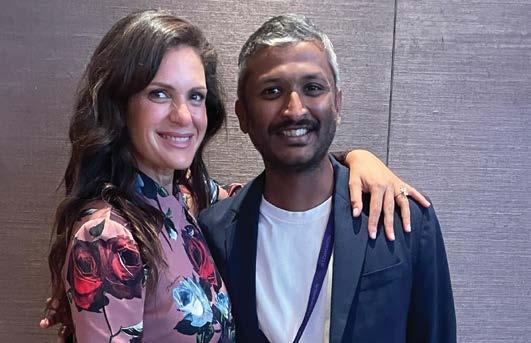
admiration,” Veronica says. “My husband’s admiration, my family’s admiration, my community’s admiration—
like the rib of my husband, and it’s a responsibility—but I adore it, it’s something that I am proud of.”

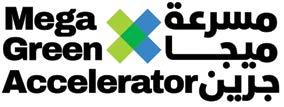
Meet the MENA startups in the Mega Green Accelerator program that are developing disruptive solutions to pressing sustainability challenges by
TAMARA PUPIC
With the aim to nurture the next generation of innovators in the MENA, the Mega Green Accelerator program is a new initiative that aims to support entrepreneurs and startups developing solutions to both regional and global sustainability challenges. An initiative by PepsiCo, one of the world’s largest food and beverage companies, SABIC, a global diversified chemicals company, headquartered in Riyadh, Saudi Arabia, and 12 other strategic partners, the Mega Green Accelerator, in its inaugural 2024 edition, selected eight startups to participate in the program, which received over 300 submissions from companies working on innovative solutions focused on either advancing the circular economy, transitioning to clean energy, or mitigating climate change through technologies to improve water use and agricultural processes. The program will see these eight companies receive mentorship from industry experts, as well as market access to scale their innovative solutions over the course of the six-month initiative, which will end with one company being awarded US$30,000 in funds to further its growth and development. Having showcased four of the companies in the Mega Green Accelerator in our August 2024 issue, here’s a look at the other enterprises remaining in the program. astrolabs. com/themegagreenaccelerator
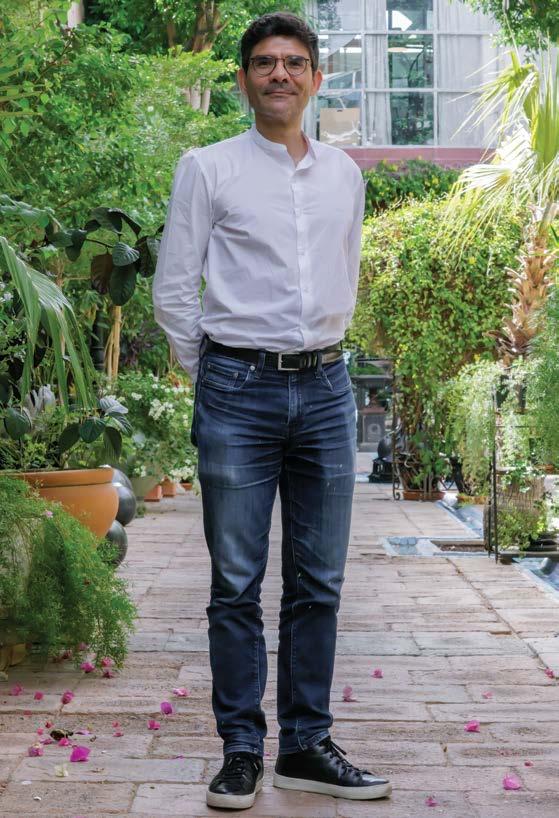
AS A TECHNOLOGY LEAD AT THE KING ABDULLAH UNIVERSITY OF SCIENCE AND TECHNOLOGY (KAUST) SOLAR CENTER in Saudi
Arabia, Dr. Michael Salvador has been focused on moving transformational energy technologies out of the lab and into the real-world applications. It is through his work in this domain that he realized that while conventional, highefficiency solar panels were being developed for maximum power output, they were made very heavy and bulky, which limited their application to rooftops and solar farms. “In order to greatly accelerate the
energy transition, we understood that we need new form factors that would allow the usage of solar energy, everywhere,” Dr. Salvador says. “For this purpose, we developed the Mirai Screen, a one of its kind lightweight and multifunctional solar panel.”
This is how Dr. Salvador became the co-founder and CEO of Mirai Solar, a Saudi Arabia-based solar technology startup that specializes in expanding solar energy use beyond conventional applications. Its flagship product—the aforementioned Mirai Screen—is now in a precommercial stage, with its competitive advantage being its
design that allows it to serve a dual purpose, i.e. providing optimal shading while also generating electricity. "The Mirai Screen offers ideal shading and electricity generation for a variety of applications, like agriculture, building integration and electric vehicles charging,” Dr. Salvador explains. "We are developing Mirai Screen to achieve commercial readiness within the next 12 months. We do this through in-house research and development and pilot demonstrations at customer sites. Currently, we have three active pilot sites in Saudi Arabia. We have also built pilot demonstrations in Germany and the USA.”
In terms of funding, Mirai Solar has so far been supported with grants from KAUST, but it has also achieved revenue from its pilot demonstrations. However, Dr. Salvador admits that there are still quite a few roadblocks in terms of its offering being more widely accepted by the private sector at large. "Given that we are providing a source of renewable energy, a significant barrier is the low cost of electricity, and the lack of incentives for businesses to adopt renewable energy solutions,” he says. "We need to develop a financing scheme for businesses, similar to a purchase power agreement to alleviate the barriers due to the significant capital investment. We hope that the Mega Green Accelerator can help us shape such a financing scheme through contacts with relevant stakeholders like banks, credit institutes, and so on, that have a strong sustainability program and mission.”
In the meantime, with his eight-strong team, Dr. Salvador
will be focused on scaling up Mirai Screen and building a pilot manufacturing site in the Kingdom. "In parallel, we have plans to intensify the deployment of our product through stronger customer engagement,” he adds. Dr. Salvador also reveals here that he and the Mirai Solar team are working on its seed funding investment strategy, while adding that the lack of capital remains the main hurdle to the growth of cleantech startups. "The entrepreneurship scene is flourishing with a growing interest especially from young generations,” he says. “There are several initiatives that promote entrepreneurship focusing on sustainability thanks to many government and academic initiatives. However, there is still little venture capital going into cleantech. The investment in cleantech needs to accelerate greatly for the energy transition to become a reality."
Mirai Solar’s Dr. Michael Salvador shares his tips for entrepreneurs in the sustainability domain
} Aim for a local focus “It is important to engage closely with local stakeholders. The relationships take time to pay off. Plus, having a local presence will help you understand the market and the needs of the customers."
} Adopt an effective decision-making approach "Base your strategy on decision points (go/no-go) that focus on early market adoption, instead of a long product development. Cleantech solutions need to be economically sound in addition to helping customers achieve their environmental targets.”
IT WAS BY OBSERVING NATURE THAT IHEB TRIKI GOT THE IDEA TO CO-FOUND KUMULUS WATER, a Tunisia-born company that aims to revolutionize water access by creating what he describes as “clean drinking water as a service.” It was in the Tunisian desert that he noticed dew clinging to his tent at dawn, which served as proof that there was water even in the harshest environments. In that moment, he realized that water can indeed be accessible even in the most remote and challenging environments if there was a way to capture the moisture in the air, and convert it into safe drinking water. “With an aim to address the issue of inaccessible and unsustainable drinking water, our company uses atmospheric water generators (AWG) to transform air into potable water, which is more accessible, sustainable, and economical,” he explains. “Kumulus Water's AWG machines thus reduce reliance on bottled water, mitigating plastic waste and carbon dioxide emissions along the way.”
Since launching Kumulus Water in 2021, Triki has grown it to have 15 employees as well as EUR1.7 million (US$1.86 million)
→ Iheb Triki, founder of Kumulus Water
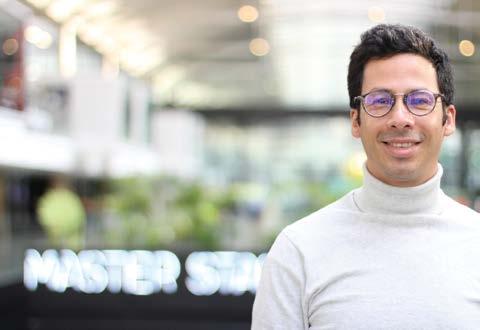
→ KUMULUS WATER'S atmospheric water generators reduce reliance on bottled water, mitigating plastic waste and carbon dioxide emissions along the way.
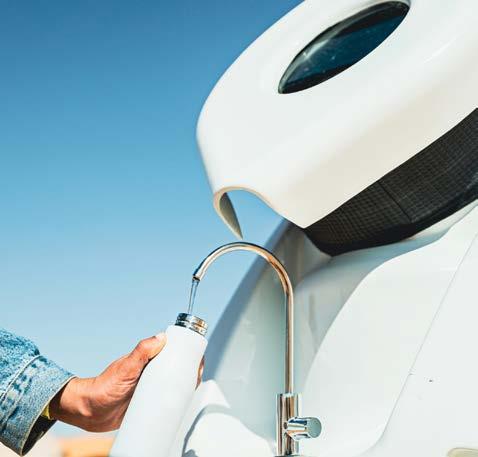
in equity funding, and he now aims to positing it as a sustainable alternative to traditional water sources in the MENA and Southern European regions. "Kumulus is targeting markets in Tunisia, Morocco, France, and Spain, focusing on business-to-business clients, such as hotels, eco-lodges, factories, and offices with corporate social responsibility (CSR) initiatives,” he says. “For that, we are currently raising a EUR2.5 million ($2.73 million) pre-Series A round in order to ramp up production, and push sales in Southern Europe and the MENA region.”
To date, Kumulus Water has received a number of industry accolades,including the first prize for startups specializing in the water sector and being selected as one of the 15 most promising greentech startups in Africa at the 2022 edition of Vivatech, a technology conference dedicated to innovation and startups that is held annually in Paris. Now, having been selected to be a part of the Mega Green Accelerator program, Triki expects that it will further aid efforts in scaling the business, improving market presence, overcoming logistical and environmental challenges, and other hurdles that Kumulus Water might be facing as a sustainable business in the MENA region. That said, Turki remains quite optimistic about the future for Kumulus Water in the region, with him saying, "The sustainability sector in the region, and especially Tunisia, holds a lot of potential for innovation and development."
Kumulus Water’s Iheb Triki shares his tips for entrepreneurs in the sustainability domain
} Focus on innovation "Develop unique solutions that address local sustainability challenges.”
} Be resourceful "Utilize available resources and networks to strengthen the business."
} Adapt to market needs "Be flexible and responsive to the specific demands of the target market."
} Make use of partnerships "Collaborate with other businesses and organizations to enhance impact."
} Remain committed to sustainability "Ensure that the business model genuinely supports environmental and economic sustainability.”
linkedin.com/company/greenalyticsegypt
THE 27TH CONFERENCE OF THE PARTIES TO THE UNITED NATIONS FRAMEWORK CONVENTION ON CLIMATE CHANGE (COP27), which took place in the Egyptian city of Sharm el-Sheikh in 2023, proved to be a gamechanger for sustainability startups in Egypt, says Omar Elboghdady, co-founder and CEO of Viridia Tech, a Cairobased startup that offers a platform for crop analytics at scale for industrial agricultural companies. "Since COP27, the startup scene in Egypt, particularly in the sustainability sector, has been thriving with support from both the public and private sectors,” Elboghdady says. "There is a steadily growing market appetite for sustainability initiatives, increasingly accommodating a sustainability premium.”
Elboghdady teamed up with Marwan Eltoukhy and Mohamed Elsawy to found Viridia Tech with an aim to address the challenges faced by commercial agriculture producers in optimizing their growing operations. "These challenges include improving resource efficiency for water, fertilizer, and pesticides consumption,” Elboghdady explains. "Another challenge is the early detection of operational issues, such as heightened disease risk. Finally, there is a need and a challenge to forecast the crop yield to assist in effective resource planning." To address such challenges, Viridia Tech collects satellite and meteorological data which are then utilized along with the company's context-sensitive artificial intelligence models to provide farmers with near real-time, customized recommendations and actionable insights. "These recommendations lead to improved crop yield, improved unit economics, and more sustainable agriculture practices,” Elboghdady adds.
→ OMAR ELBOGHDADY is the co-founder and CEO of Viridia Tech.
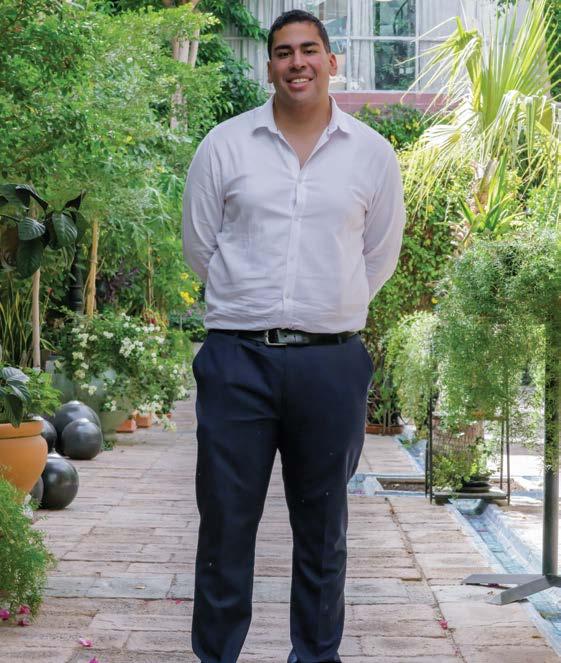
Viridia Tech’s Omar Elboghdady shares his tips for entrepreneurs in the sustainability domain
} Develop your idea within the local context "For a sustainable solution to succeed in Egypt, for example, you need to make sure that your idea ensuring that it has mass appeal to Egyptians.”
} Roll with the punches
"The ability to adapt your problem-solving approach, solutions, and implementation strategies when new information arises will set your startup apart from the rest.”
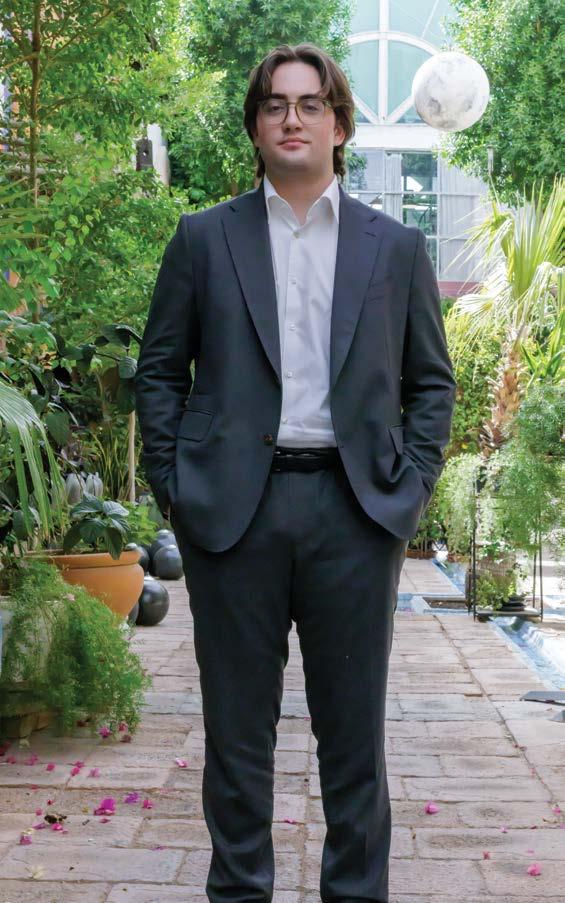
The fact that his startup has been bootstrapped to date has not prevented it from growing to a sixstrong team who have succeeded at establishing a competitive edge in certain areas, such as in supporting farmers who grow potato and olive crops. However, their path has not been without obstacles. "The biggest challenge so far has been gaining the trust of farmers and agronomists, particularly when our recommendations differ from their traditional practices, which have not yet adapted to recent climate change effects,” Elboghdady says. “The Mega Green Accelerator is now assisting us in
structuring and scaling our business, enabling us to build a solid reputation and leverage it effectively." As for the road ahead for the company, Elboghdady is being both proactive and optimistic. "We aim to expand our product offering by diversifying the crops we support, and enhancing the depth and coverage of our artificial intelligence models,” he says. "Additionally, we are looking to increase our strategic partnerships, reach, and client portfolio. Our goal is to manage over 10,000 acres through our digital platform by 2025, while also planning for our seed fundraising round during this period."
BACK IN 2021, WHEN YY REGEN, A BEIRUT-BASED AGRITECH AND RENEWABLE ENERGY STARTUP, sprang to life, the Lebanon economy was going through one of the most challenging periods which significantly worsened the energy security situation in the country and created unmet demand for access to energy. This underserved need prompted a trio of passionate Lebanese engineers—Hasan Jaafar, Amer Khayyat, and Habib Yassine—to introduce an alternative solution to the market with their enterprise, YY ReGen. "Our goal was to address the issue of high capital costs associated with fixed solar systems and the reliance on polluting and expensive
diesel generators,” says Nessim Khayyat, Application Developer at YY ReGen. “We are committed to transforming the way our customers’ ventures are powered, watered, and grown, with a focus on a more affordable, less pollutive, and more regenerative approach— partnering with our clients in creating a sustainable future in the region,” Khayyat says.
YY ReGen’s flagship product is the ReGen-R8, an ondemand solar energy system based on the energy-as-aservice (EaaS) model. "Our focus was primarily on farmers and rural businesses who lacked the means to afford traditional solar systems,” Khayyat says. "With ReGen-R8, we aimed to provide a cheaper, cleaner, and capital-free option for accessing clean power. Our approach involved removing
OUR FOCUS WAS PRIMARILY ON FARMERS AND RURAL BUSINESSES WHO LACKED THE MEANS TO AFFORD TRADITIONAL SOLAR SYSTEMS. WITH REGEN-R8, WE AIMED TO PROVIDE A CHEAPER, CLEANER, AND CAPITAL-FREE OPTION FOR ACCESSING CLEAN POWER.”
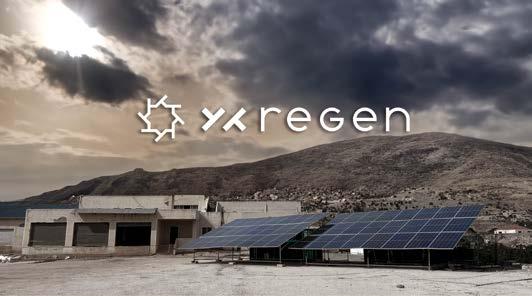
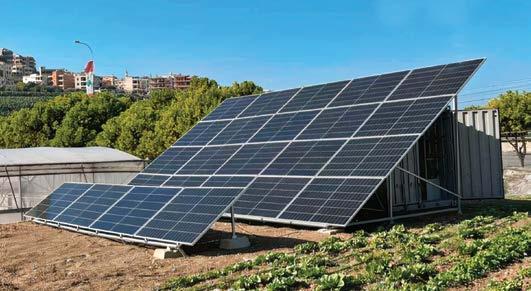
the complexities and uncertainties typically associated with electricity provision by adopting a customer-centric mindset.” Khayyat goes on the explain that the unique selling point of YY ReGen lies in both in its business model and its technologies. "We are the first and only company in the MENA region to provide on-demand renewable energy as a service where customers can benefit from clean energy without having to worry about the initial capital investment,” he says. "As for the technologies, the product comes with internet of things functionalities that allow for remote system monitoring and control, resulting in enhanced system performance and uptime. Finally, YY ReGen offers a holistic approach that addresses multiple challenges in the agriculture sector – our solution provides efficiency, sustainability, and resilience, and empowers our customers to achieve long-term success while minimizing environmental impact.”
YY ReGen’s Nessim Khayyat shares his tips for entrepreneurs in the sustainability domain
} Focus on impact "Clearly define and measure the social and environmental impact of your solutions. This not only drives motivation, but also attracts investors and partners who are committed to sustainability."
} Be adaptable "Be prepared to pivot and adapt your business model to changing circumstances, especially in a volatile environment like Lebanon."
} Use local knowledge "Understand the local context deeply, and design solutions that are tailored to the specific needs and challenges of the region."
} Build strong networks "Connect with other entrepreneurs, organizations, and stakeholders in the sustainability sector. Collaboration and knowledge sharing are crucial for overcoming common challenges."
} Adopt sustainability as a core value "Embed sustainability in all aspects of your business, from operations to product development. This will resonate with customers, partners, and investors who prioritize ethical and sustainable practices."
He adds that all 10 of YY ReGen's ReGen-R8 units are currently rented out, which is an indication of the strong demand for its solutions in the Lebanese market. "We are gaining recognition as a key player in the renewable energy and sustainable agriculture sectors in Lebanon,” Khayyat says. "Our unique approach and focus on holistic solutions give us a competitive edge by providing rentable solar photovoltaic (PV) units."Although it can be challenging to convince traditional farmers to adopt new technologies and practices, there is a high demand from the agriculture sector and farmers for our ReGen-R8 units." Khayyat states that the three co-founders have grown YY ReGen through a combination of personal investments and grants focused on sustainable development to a team of 13 professionals. The team now hope that the Mega Green Accelerator will support them in accessing capital, networking, and mentoring, and especially with regards to scaling up their production to meet the high demand from the agriculture sector, and navigating the unique challenges in Lebanon.
"The startup scene in Lebanon, particularly in the sustainability sector, is vibrant, but it faces significant challenges, such as funding constraints, infrastructure gaps, regulatory hurdles, and talent retention,” Khayyat says. "However, there is a strong sense of community and a growing number of initiatives and support programs aimed at fostering innovation and sustainability. Notably, the number of initiatives and startups focusing on sustainability has increased significantly in the past couple of years. This trend enlightens the future, and fosters optimism about the sector's potential."
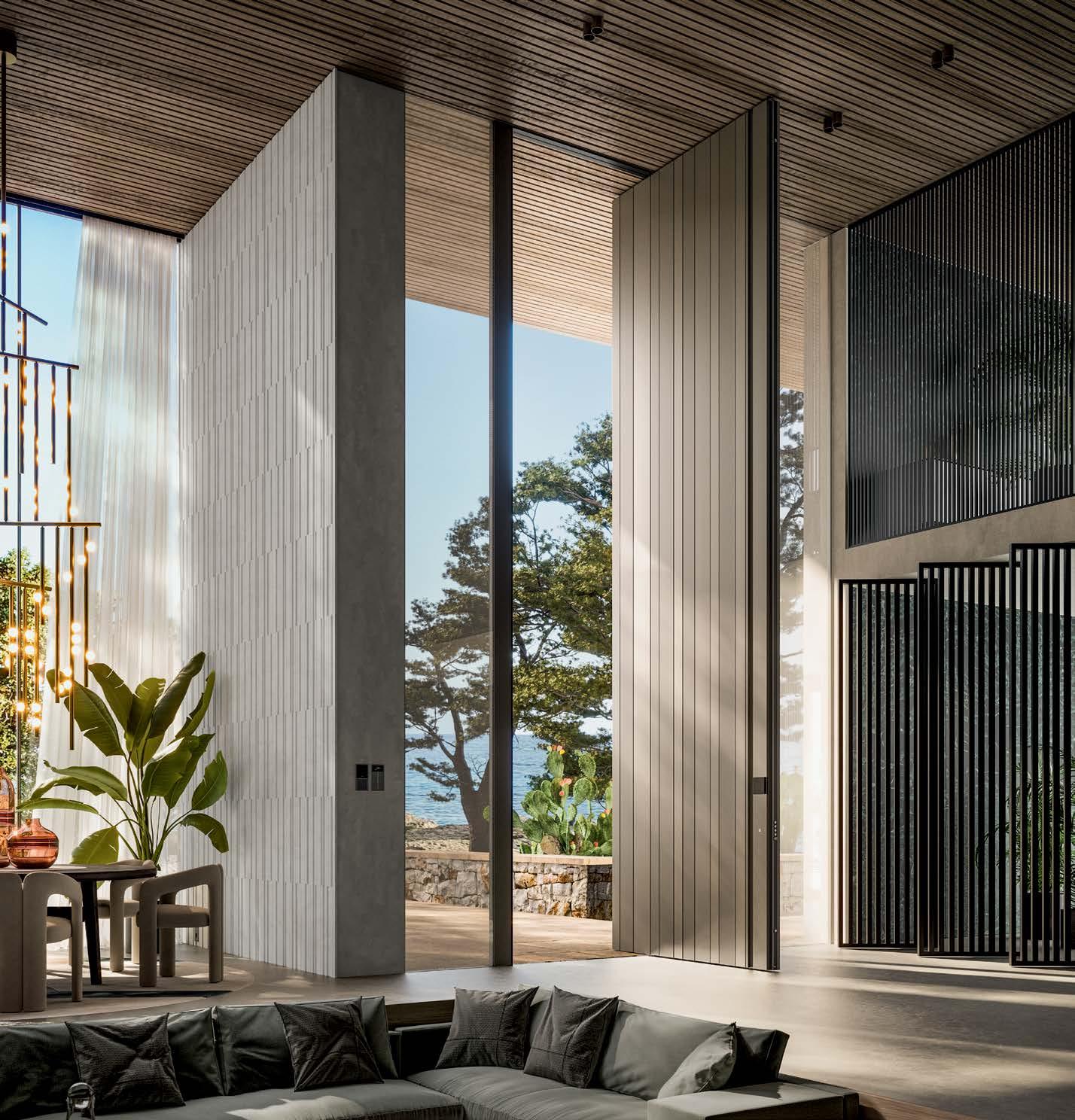
Oikos Atelier Dubai Warehouse nr. 9, 45 4th St, Al Quoz, Al Quoz Industrial Area 3, Dubai - UAE T +971 4 589 3332 | M + 971 52 556 7376 atelierdubai@oikos.it | oikos.it


Enterprise head honchos talk strategy, industry-specific tactics, and professional challenges

Aisha Abdulmalik
Founder, Aisha Jewels
H.E. Alia bint Abdullah Al Mazrouei UAE Minister of State for Entrepreneurship
Charlotte Borghesi Co-founder and Managing Director, Kidzink
Ronaldo Mouchawar Vice President, Amazon MENA
Haisam Odeimeh
Group CEO, Financial Services, Al Ramz
Briar Prestidge
Founder and CEO, Prestidge Group
Ali Sajwani Co-founder and CEO, Amali Properties
Amira Sajwani
Founder and CEO, PRYPCO, and co-founder, Amali Properties
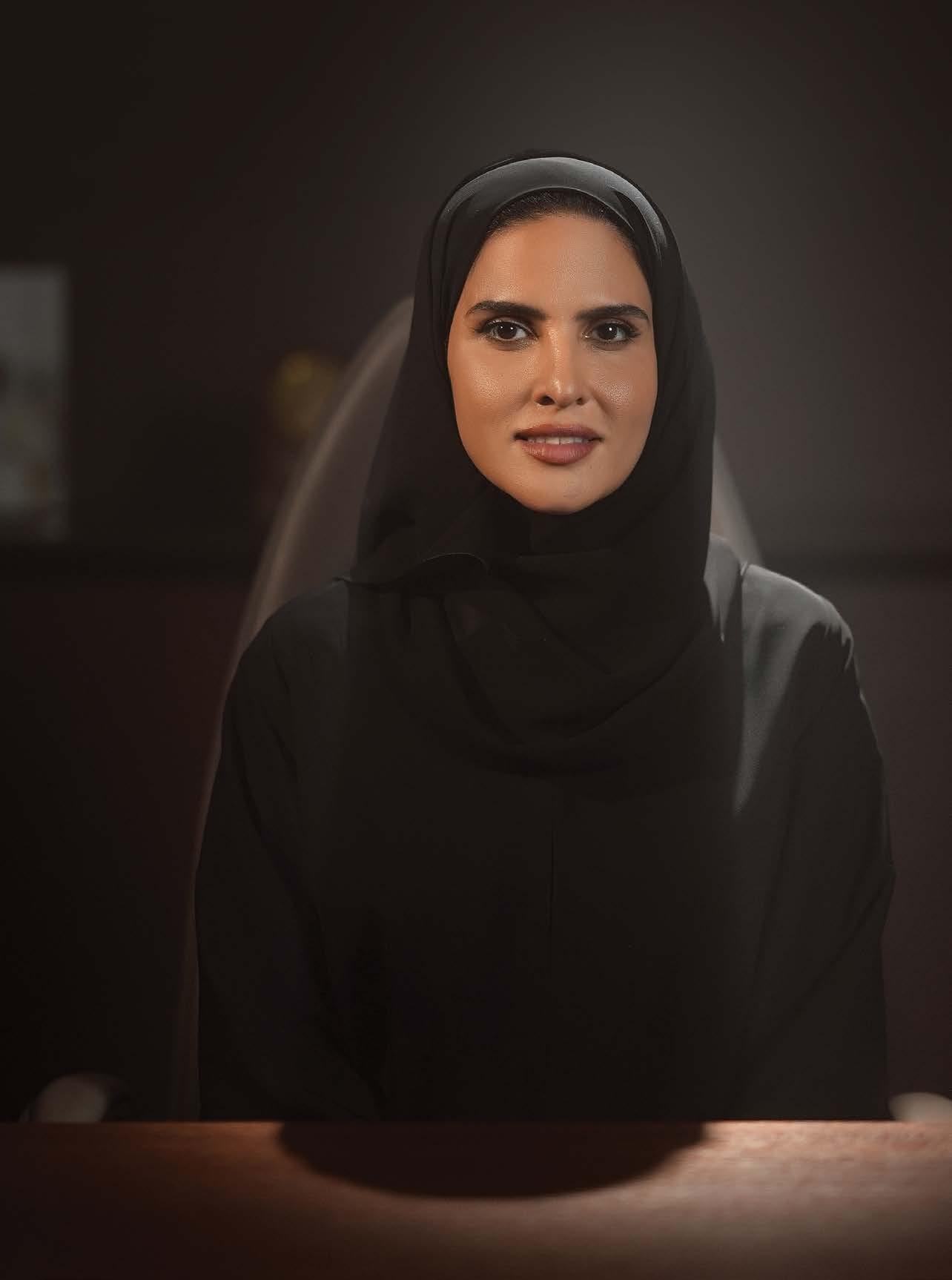

If experience truly is the best teacher, then it is safe to say that H.E. Alia bint
Abdullah Al Mazrouei, who was appointed as the UAE Minister of State for Entrepreneurship in July this year, is more than ready to excel in this new role. After all, Al Mazrouei has come into this position following extensive experience in the UAE’s entrepreneurial arena.
For starters, Al Mazrouei is a serial entrepreneur who has built several businesses in the UAE from the ground up, with her portfolio including brands like Just Falafel, Little Haven Nursery, and FitGround. She has also worked at Mazrui International, which is an Abu
Dhabi-headquartered family office her father set up over 50 years ago, and she’s also been an Advisor at the Abu Dhabi Department of Economic Development. She’s also enjoyed leadership positions at the UAE’s Human Resources Authority and at the Abu Dhabi School of Government, and her last professional role—prior to her appointment as a UAE Minister of State— was as the CEO of the Khalifa Fund for Enterprise Development, an independent economic development agency of the Government of Abu Dhabi that is focused on funding and supporting the growth of SMEs in the Emirates.
“THIS IS A TIME FILLED WITH POSSIBILITIES, AND WITH COURAGE AND DETERMINATION, THERE IS NOTHING YOU CANNOT ACHIEVE.”
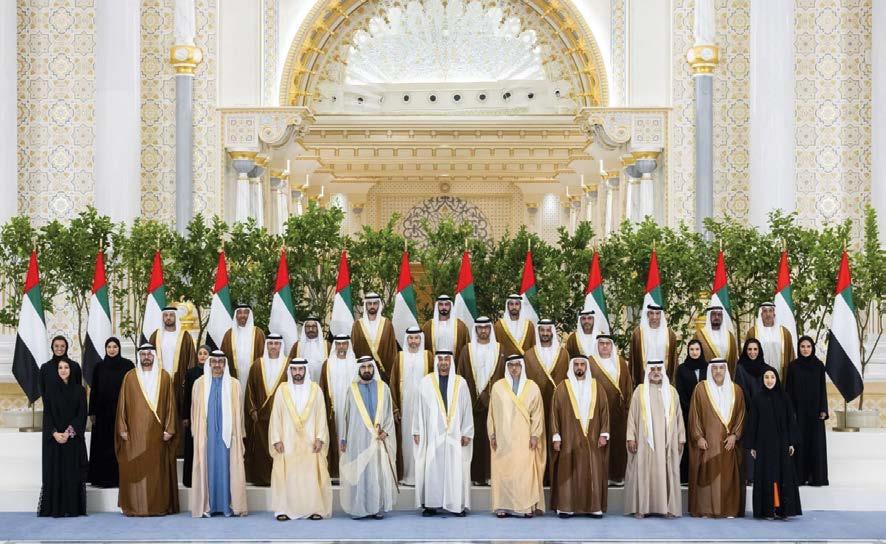
Al Mazrouei has thus had a career trajectory that makes her perfectly positioned to take on the mandate she’s now been tasked with as the UAE Minister of State for Entrepreneurship, which, she states, is to cultivate an entrepreneurial ecosystem that empowers innovation, while also supporting the growth of businesses in it. “This ministerial position sends a strong message to both our citizens and the global community about our unwavering commitment to entrepreneurship as a cornerstone of our economic strategy,” Al Mazrouei adds. “Recent federal initiatives—such as full foreign ownership of companies, golden visas for entrepreneurs, and enhanced intellectual property rights—underscore our dedication to fostering a vibrant business environment. As we aim to position the UAE as a premier hub for entrepreneurship by 2031, these efforts reflect our resolve to drive sustainable economic development and job creation, ultimately addressing the key challenges of our time.”
Given that her first entrepreneurial venture in the UAE (i.e. the F&B brand, Just Falafel) got off the ground in 2007, Al Mazrouei has had a front-row seat to the evolution of the country’s startup and SME ecosystem, which she deems as having been just remarkable, especially over the last couple of years. “Strategic federal initiatives have significantly enhanced our landscape, enabling full foreign ownership,
MY MISSION IS TO STAND CONFIDENTLY IN MY ACHIEVEMENTS, AND TO ENCOURAGE OTHERS TO DO SO WITH PRIDE AND CONVICTION.”
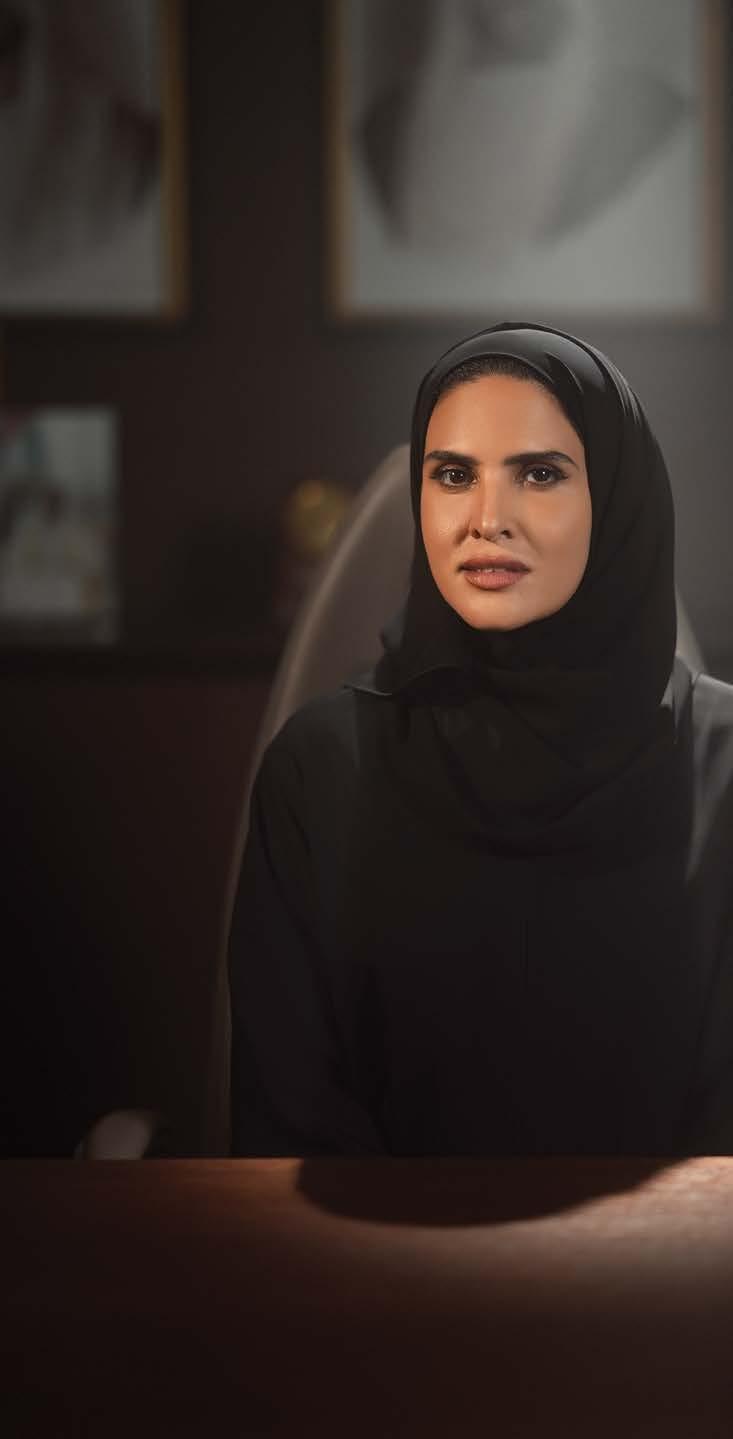
→ H.E. ALIA BINT ABDULLAH AL MAZROUEI enjoys exceptional experience from both the private and public sectors, having extensive expertise in entrepreneurship. Her last role, prior to her appointment as the UAE Minister of State for Entrepreneurship, was as the CEO of Khalifa Fund for Enterprise Development.

REMEMBER, YOUR JOURNEY IS MORE THAN JUST YOUR OWN—IT’S AN INSPIRATION TO OTHERS WHO WILL SEE IN YOUR STORY THE COURAGE TO CHASE THEIR DREAMS. YOU HAVE THE POWER TO MAKE A DIFFERENCE, NOT JUST IN YOUR LIFE, BUT IN THE LIVES OF COUNTLESS OTHERS.”
introducing golden visas, and improving intellectual property rights, all of which create a conducive environment for business growth,” Al Mazrouei points out. “Targeted support for SMEs and startups has provided essential training and resources, while robust legal frameworks ensure the sustainability of family businesses and cooperatives. Plus, as we empower women entrepreneurs and women-led SMEs, particularly in emerging sectors, we unlock immense potential for contributions to our economy. The UAE’s recognition as the leading global destination for new ventures, coupled with our high score in the Global Entrepreneurship Monitor Report for 2023/2024, reinforces our commitment to nurturing talent and innovation. We welcome innovators and entrepreneurs worldwide to explore our market and leverage its advantages.”
But as much as the UAE’s entrepreneurial ecosystem has a lot going for it, Al Mazrouei does admit that it can also present a fair number of challenges for those wanting to operate in it—however, she is keen to point out that the country is making an effort to alleviate them all the same. “Innovators in our ecosystem often face hurdles such as access to finance, navigating regulatory landscapes, and achieving full participation in the business environment,” she says. “But the UAE government has been proactive in addressing many of these challenges through legislative amendments and policy reforms, shaped by meaningful consultations with the private sector. For instance, the introduction of full foreign ownership has been a game-changer, leading to the establishment of over 275,000 new companies in just a year and a half, pushing the total to over 788,000 by the end of 2023.”
H.E. Alia bint Abdullah Al Mazrouei shares her tips for entrepreneurs
} Embrace innovation “Innovation is the heartbeat of entrepreneurship. Always be curious, explore new ideas, and embrace the latest technologies. The UAE’s rapidly changing market thrives on those who dare to innovate and adapt. Don’t be afraid to dream big and push boundaries—your creativity is your greatest asset.”
} Leverage government support “You don’t have to walk this path alone. The UAE government offers a wealth of incentives, grants, and programs designed to support entrepreneurs like you. These resources are there to help you turn your vision into reality, so take full advantage of them. They’re a testament to the UAE’s commitment to nurturing its entrepreneurial spirit.”
} Build a strong network “No one succeeds in isolation. Surround yourself with fellow entrepreneurs, mentors, and industry leaders who can offer guidance and support. Your network is more than just connections—it’s a community that can open doors to collaborations, funding, and the wisdom you need to grow. Together, we can achieve more than we ever could alone.”
} Focus on customer needs “Your customers are the core of your business. Prioritize
understanding their needs and aspirations, and let that knowledge drive your decisions. By actively listening and adapting your offerings based on their feedback, you’re not just ensuring your success—you’re building strong, lasting relationships rooted in trust and loyalty. When you genuinely connect with your customers, you create a foundation for enduring success and mutual growth.”
} Be resilient “The road to success is rarely smooth, but it’s the challenges that shape us. When you encounter setbacks, face them with courage and a problem-solving mindset. Each challenge is an opportunity to grow stronger and wiser. Resilience isn’t just about surviving tough times—it’s about thriving despite them.”
} Empower women in business “For the female entrepreneurs out there, know that your journey is both unique and powerful. Seek mentorship, and don’t hesitate to lean on the support of other women who’ve walked this path. By collaborating and sharing resources, we can lift each other up, and create a future where women in business are celebrated and supported. Your success paves the way for others to follow.”
} The UAE stands by you “By embracing the aforementioned principles, you’re not just navigating the business world— you’re contributing to the vibrant, dynamic future of the UAE. The Ministry of Economy stands with you, ready to support and guide you as you turn your dreams into reality. Remember, every step you take forward inspires others to do the same.”
However, despite this progress, challenges persist,” Al Mazrouei continues. “Access to finance remains a significant barrier for many startups, and ensuring that every entrepreneur can fully participate in the business landscape is an ongoing concern. In my role as the UAE Minister of State for Entrepreneurship, I am deeply committed to tackling these challenges head-on. By working closely with our ecosystem of incubators, accelerators, and investors, I strive to provide the necessary guidance, connections, and funding that startups need to thrive. My approach is rooted in urgency and purpose, driven by a desire to not only celebrate our progress, but to also push for continuous improvement. I believe that by addressing these hurdles, we can create an even more robust and inclusive environment where every innovator has the chance to succeed. This commitment is at the heart of my work, and I am dedicated to making a meaningful impact in the UAE’s entrepreneurial landscape.”
To her credit, Al Mazrouei has hit the ground running with respect to her ministerial mandate, with her already being actively engaged in a number of initiatives that aimed at enhancing the UAE’s entrepreneurial landscape. “One notable initiative is the development of a mentorship program that connects seasoned entrepreneurs with emerging startups, providing invaluable guidance and support,” Al Mazrouei shares. “We are also focused on revamping the SME law to make it more universal and aligned with future sectors, particularly supporting innovation enterprises. This legislative enhancement aims to create a more robust legal framework that fosters innovation and positions the UAE as a global leader in emerging industries.”
The upcoming UAE Entrepreneurship Summit is another initiative that Al Mazrouei wants to draw our attention to, with the event set to serve as a vital platform that will allow entrepreneurs to network, exchange ideas, and learn from industry leaders. “Additionally, we are working on launching a transformative project to align all ecosystem players in support of fostering and boosting the number of companies focused on future sectors
and the new economy,” she adds. “This project is part of our broader strategy to create a cohesive and supportive environment for innovation-driven enterprises.”
But that’s not all. Given that the UAE’s entrepreneurs are known to always be on the lookout for opportunities to grow their businesses internationally, Al Mazrouei reveals that she is also working on initiatives that would aid the fulfilment of such dreams. “We are continuing our efforts to support startups in scaling up abroad,” she says. “Currently, we are developing a platform to connect our SMEs with our partners in BRICS [an intergovernmental organization comprising Brazil, Russia, India, China, South Africa, Iran, Egypt, Ethiopia, and the UAE], while also enhancing our network with our partners on the Comprehensive Economic Partnership Agreements (CEPA). This initiative will provide UAE startups with greater access to international markets, fostering cross-border collaborations and growth opportunities.” Similarly, given the common refrain heard from entrepreneurs in the UAE when it comes to financing, Al Mazrouei shares that work is being done to sort out this challenge as well. “Recognizing the crucial role of finance in the success of startups, we have been working closely with fintech players to introduce technology-driven and non-traditional financing solutions,” she says. “By partnering with our existing network of banks, we aim to provide startups with innovative financial tools and resources that will support their growth and sustainability.”
Al Mazrouei also reveals that work is underway on this year’s installment of the Future 100, a national initiative launched by the UAE Ministry of Economy in partnership with the UAE Minister of State for Government Development and the Future, which, in its inaugural edition last year, listed (and accelerated) the startups and scaleups making a promising contribution to the UAE’s future economic sectors. “This year, we plan to celebrate the top 100 startups and scaleups in the UAE that are future-ready, highlighting their achievements and
contributions to the nation’s economy,” Al Mazrouei says. “I encourage all entrepreneurs to participate in such initiatives, and seize the growth opportunities that they present.” But what about those among us who are essentially on the cusp of taking the leap into entrepreneurship—what would be the message Al Mazrouei would give to all you aspiring founders out there in the UAE? Her reply is succinct—Al Mazrouei urges you to simply be bold, and dive right in. “Pursue your passions with all your heart, and trust in the supportive ecosystem that we are fortunate to have in the UAE,” she says. “This is a time filled with possibilities, and with courage and determination, there is nothing you cannot achieve. Remember, your journey is more than just your own—it’s an inspiration to others who will see in your story the courage to chase their dreams. You have the power to make a difference, not just in your life, but in the lives of countless others.”
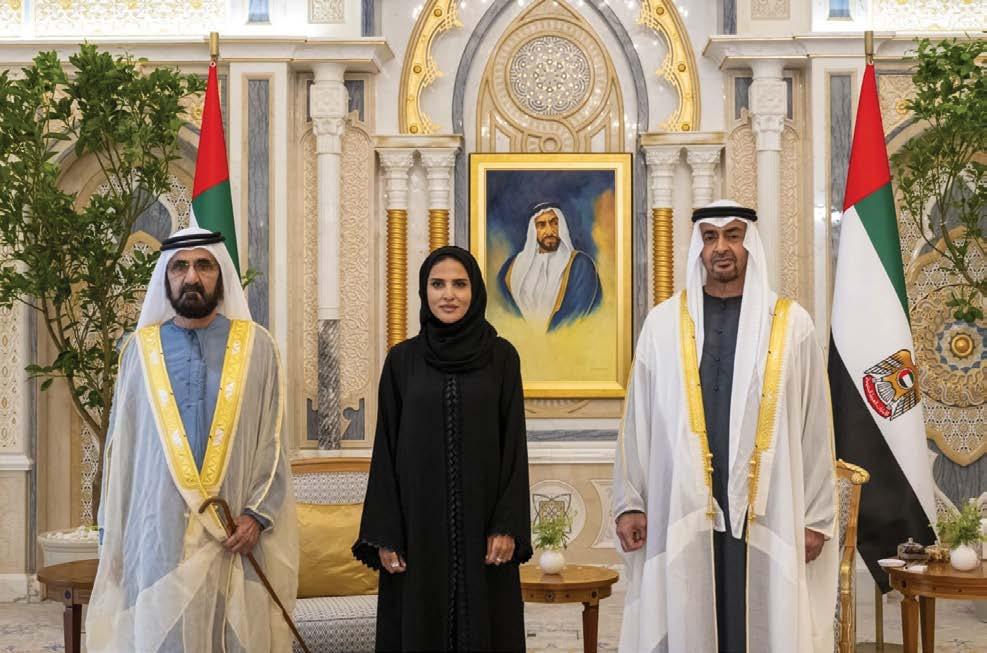
Al Mazrouei may well be speaking from experience here, given how she has been a role model for so many entrepreneurs in the UAE, and especially so for those who are women. As a woman in the UAE’s business realm, she admits that there have been times when, owing to her gender, the going has gotten tough—but then again, as the popular aphorism goes, that’s also when the tough get going. “Throughout my career, I’ve encountered challenges, some of which were shaped by my gender,” Al Mazrouei shares. “But rather than letting these obstacles deter me, I’ve embraced them as opportunities for growth and self-discovery. Each hurdle has taught me resilience, and they have been instrumental in shaping the person and leader I’ve become. To the women of the UAE, both Emirati and otherwise, I want to say this: embrace your unique strengths with pride. Never doubt the value of the qualities that make you who you are. Seek out mentorship and build a strong network of support, for these connections will be your greatest allies in your journey. Collaboration and community are powerful; by sharing your experiences and resources, you’re not only paving the way for your own success, but also lighting the path for future generations of women.”
Interestingly enough, Al Mazrouei also points to one of the most cherished aspects of being a woman— motherhood—as being central to her life today. “From a personal perspective, being a mother is, without a
doubt, the most profound and fulfilling achievement of my life,” she says. “Motherhood has been my greatest priority as well as my most profound teacher, imparting lessons that resonate deeply with the qualities of successful leadership—perseverance, patience, collaboration, team-building, and unwavering resilience. Through this journey, I’ve come to cherish every moment, understanding the true value of time, and ensuring that each second is spent with purpose and love. I am deeply proud of my ability to wear multiple hats—nurturing my personal life, serving in public office, and leading in the private sector. As I look to the future, my personal goals are rooted in embracing and celebrating my accomplishments, and I hope to inspire other women to do the same. It’s essential that we no longer diminish our successes, but instead recognize and honor our inherent talents and strengths.” This, in turn, is a reflection of the mantra with which Al Mazrouei is heading into the future. “My mission is to stand confidently in my achievements, and to encourage others to do so with pride and conviction,” she declares. “As I continue this path in both the business world and life, I am committed to staying true to my core values, treating others with kindness and respect, and fostering a culture of authenticity. This, to me, is the essence of true leadership, and a milestone I strive to uphold every day.”
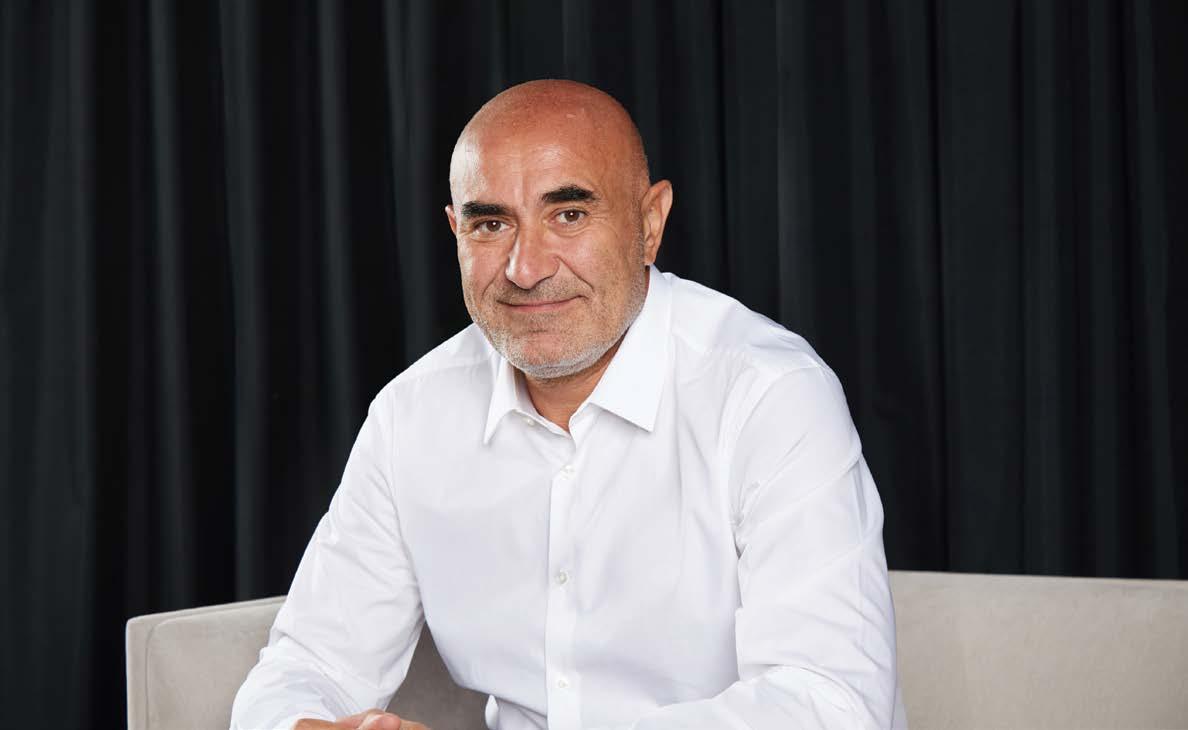
VICE PRESIDENT /Amazon MENA
by AALIA MEHREEN AHMED
If one were to highlight recurring phrases that appear throughout this interview’s replies from Ronaldo Mouchawar, Vice President of Amazon MENA, there is one that outnumbers any of the others—and that is “customer obsession.” But these aren’t mere words for Mouchawar; according to him, they encapsulate the very essence of Amazon’s presence as an e-commerce giant across the MENA region. “This philosophy sits at the heart of everything we do, and it remains the driving force behind our innovation and growth,” Mouchawar says. “Putting our customers first, we are able to work backwards from their needs, and continuously innovate on their behalf.“ But this ethos doesn’t exist in and of itself—Mouchawar explains that there are three key pillars that it has been erected upon. “Our commitment to customer obsession is reflected in the
wide range of products and services we introduced across the UAE, Saudi Arabia, and Egypt since launch,” he continues. “The core pillars of our offering—selection, price, and convenience—have remained consistent over the years, which results in an end-toend experience customers love, and growth in sales that our selling partners enjoy. Customers mainly want access to a vast selection of products, at great prices, and want to get them in the quickest and most convenient ways possible. This is true today, and it will continue to be true 10 years from now, which is why we continue to focus on these three pillars across all of our business.”
East’s first unicorn!), which was acquired by the US-headquartered Amazon in 2017. As such, it wouldn’t be an exaggeration to say that Mouchawar has been a key enabler of the regional e-commerce ecosystem as we know it today. And while Mouchawar might certainly bank on this mountain of past experiences for his decision-making, he says that what truly fuels his ideas and goals today is Amazon’s “Day 1” culture and operating model. “It is always Day 1 at Amazon, meaning our approach remains the same as it was on Amazon’s first day,” he explains. “This mentality is the foundation of our operations in the MENA region, and it drives us to continually push boundaries, innovate, and deliver exceptional value to our customers. The Day 1 philosophy requires patience, a willingness to experiment, and an acceptance that failure is part of the process of innovation. By embracing this mindset, we maintain the agility and entrepreneurial spirit of a startup, even as we scale. Fostering a Day 1 culture also means encouraging a ‘disagree and commit’ attitude within our teams. We value open debate and diverse perspectives, but once a decision is made, we commit fully to executing it. This mindset prevents us from becoming complacent, ensuring we constantly evolve and innovate for our customers. This FOLLOW THE Leader
Now, to many in the region, Amazon MENA’s story is perhaps almost synonymous with that of Mouchawar. After all, it was Souq.com, the company that he co-founded in 2005 (and has the honor of being known as the Middle
PUTTING OUR CUSTOMERS FIRST, WE ARE ABLE TO WORK BACKWARDS FROM THEIR NEEDS, AND CONTINUOUSLY INNOVATE ON THEIR BEHALF.”
approach is crucial in a rapidly evolving region like this one, where customer needs and expectations are constantly shifting.”
Indeed, Amazon MENA’s operations currently take place in an incredibly dynamic setting, with a 2023 Mordor Intelligence report showing that the size of the region’s e-commerce market will almost double by 2028 compared to 2023, at a whopping 11.5% compound annual growth rate. As such, the magnitude of the
Ronaldo Mouchawar shares his tips for entrepreneurs
}It’s always about the customer “This applies to businesses of all sizes—no matter how big or small. Understanding customers is crucial, staying true to them pays off. Amazon’s commitment to customer obsession has been reinforced through some of our biggest launches and more functional ones. For example, we launched Prime when customers did not yet know how much they valued one-day and same-day deliveries. Another example is how we continue to enhance our selection across categories that are important to customers such as grocery.”
}Dare to think big “Look around the corners for new ways to serve customers. Identify their pain points, and what breakthroughs you need to deliver. At Amazon, our ‘Think Big’ leadership principle guides us toward continually creating and communicating a bold direction that inspires results.”
}Speed matters “If you have trouble identifying which opportunities or challenges to focus on, remind yourself of the importance of moving fast. Digitalization and a hyperconnected world have transformed the landscape, creating an even greater need for speed.”
}Invest in your team “Your local teams should be able to tailor your company’s offering to your customers, so building and investing in the right teams can make or break a business.”
}Fail forward “To innovate, you have to experiment, and if you know in advance that it’s going to work, it’s not an experiment. Failing forward is about creating an environment where it is safe for employees to learn and experiment. It embraces failing as a core part of the journey from idea to success. For example, our first attempt to penetrate the smartphone market—with the Amazon Fire phone—didn’t meet customer expectations, and it was discontinued. But the time spent on the failed Fire phone helped propel other success and innovation. We were able to take our learnings and accelerate our efforts building Echo and Alexa, which is now available in many languages, including Najdi and Hijazi dialects in the MENA region.”
↓ Price, selection, and convenience are the three main areas that Amazon MENA primarily focuses on. As the company continues to introduce new ways to deliver incremental value, Mouchawar says it is Amazon’s flagship Prime membership program that is the biggest testament of this ethos.
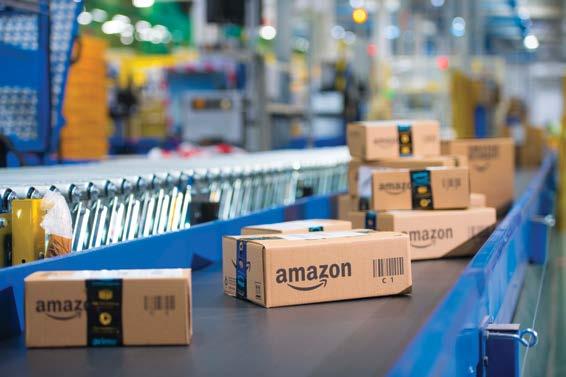
opportunities presented by the region is definitely not lost on Mouchawar. “Our growth across the region continues to be guided by our commitment to doing what’s right for our customers,” he adds. “The UAE and Saudi Arabia remain the largest and fastestgrowing ecommerce geographies in the region, and while customers are still spending, we are seeing a definite shift towards value, and a more price-conscious mindset. This is why we spend a lot of our time working with our selling and banking partners to help customers save money year-round as well as during key sale events like our upcoming White Friday Sale, our biggest sale of the year, through deals, instant bank discounts, and offers. Moving forward, we remain focused on delivering even greater value to our customers through an expanded selection of products, competitive pricing with flexible payment options, savings opportunities, and a convenient shopping experience that supports their diverse needs and lifestyles. Innovation through our Prime membership program will continue to play a crucial role in how we deliver incremental value to customers, providing them with the best way to experience all that Amazon has to offer.”
Now, while customer centricity is clearly the main factor at play at Amazon MENA, Mouchawar also points out that all of its plans have not been devised upon a blind belief in the end user either. “Today’s customers are spoilt for choice; they expect hyper-localized, hyper-personalized experiences,” he says. “At Amazon, we are customer-obsessed, and we remain committed to innovating on behalf of customers. However, we don’t simply react to what customers are telling us; we want to understand them deeply, and we focus on the durable needs our customers have– not just ones they have today, but needs they will continue to have into the future, like the need for great prices, vast selection, and convenience.” One aspect of this strategy can be seen in Amazon MENA’s emphasis on hyper-localization in the region. “We launched our Arabic language options on both the mobile app and the website to cater to customers who prefer shopping in Arabic,” he adds. “Since then, we have also created several initiatives such}}
→ Mouchawar credits Amazon’s “Day 1” culture and operating model for enabling an environment where the company customer centricity can be at forefront of innovative strategies.
“
I firmly believe that everyone should pursue their passions and hobbies—we always find the time for work, but it’s equally important to make the time to unwind and recharge.”
as our ‘Shop Local’ selection to enable customers across the region to support locally made products and Alexa in local Arabic dialects. As the business grows, I believe maintaining this kind of a relentless commitment to customer experience through innovation and localization will certainly set the foundation for long-term success.”
With innovation in customer experience, of course, comes the discourse of advanced technologies, and how they can accentuate the quality of the overall purchasing journey. To this, Mouchawar replies with much vigor about the myriad of possibilities that can arise by leveraging technology such as generative artificial intelligence (GenAI). “Today, we believe that GenAI capabilities are going to transform virtually every customer experience while tackling some of humanity’s most challenging problems,” he says. “That is why Amazon is investing in generative AI, and the responsible development and deployment of large language models (LLMs) across all of our businesses. We have been using machine learning in a meaningful way across Amazon for over 20 years; it is in everything we do. We remain very focused and practical in our application of AI, and develop AI for one reason, and one reason only: to improve the shopping experience for every customer. Every one of our teams is working on building generative AI applications, for both customer-facing services and internal operations, from the recom-
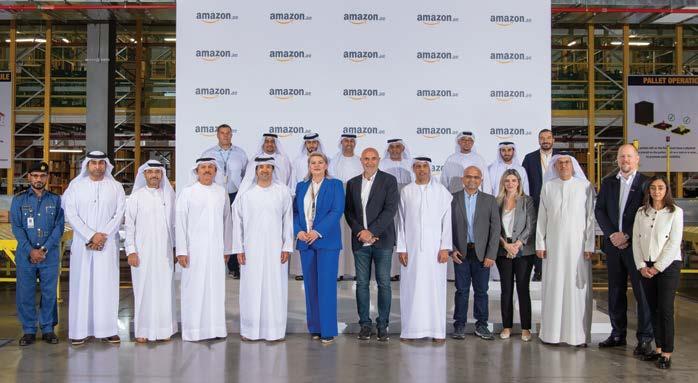
mendation engines that personalize the shopping experience on Amazon, to the AI-powered robots that optimize order fulfillment in our warehouses. We are also working to democratize GenAI technologies so that organizations and developers alike can afford and have access to build amazing customer experiences.” Mouchawar obviously has his plate full when it comes to his role at Amazon MENA, and there is a palpable energy that should make anyone reading this excited about what he and his team have planned for the future. But don’t mistake Mouchawar to be the “all work and no play” sort either—on a recent episode of Conversations with Loulou, the podcast hosted by UAE-based entrepreneur and investor Loulou Khazen Baz, the business leader revealed that he enjoys being a disc jockey (DJ) in his free time. “I firmly believe that everyone should pursue their passions and hobbies—we always find the time for work, but it’s equally important to make the time to unwind and recharge,” Mouchawar says. “For me, music has always been a deep passion. It’s more than just a way to disconnect; it’s a means to refresh, regroup, and tap into a different creative energy. In the last few years, I’ve taken DJing a bit more seriously, sharing my music with friends and family, and it’s been rewarding to see our small following grow. I find immense joy in making people happy through music, seeing them dance and connect. Music transcends boundaries—it cuts across countries, religions, cultures, and backgrounds, creating a common bond. This hobby
has allowed me to build friendships with people outside of my usual ecosystem, enriching my perspective and knowledge.”
For the entrepreneurs reading this, Mouchawar reminds that setting aside time for non-work-related activities goes beyond just striking that much pursued healthy work-life balance. “DJ-ing, in many ways, parallels my early days of entrepreneurship,” he continues. “Just as starting Souq.com was an adventurous journey, diving into this hobby has been equally exhilarating. It allows me to disconnect from the day-to-day demands of work and reconnect with my creative spirit. I encourage every entrepreneur to pursue their passions outside of work. These interests not only provide balance but also foster creativity and innovation in unexpected ways.” And it is with such a mindset that Mouchawar now looks forward to what Amazon MENA can continue to offer the region’s e-commerce market and its millions of customers. “I am optimistic about the region, and I believe it is full of untapped potential,”
Mouchawar declares. “This sector will continue to grow in the MENA, as economies diversify economically, logistics improve, technology accelerates, and the number of mobile users grows, especially given the region’s younger population (55% of the MENA population is under the age of 30, as per the Organization for Economic Cooperation and Development). We are excited to continue serving customers, helping businesses grow online, and playing a key role in driving the region’s ambitious digital agendas forward.”
FOUNDER AND CEO / Prypco CO-FOUNDER / Amali Properties
by TAMARA PUPIC
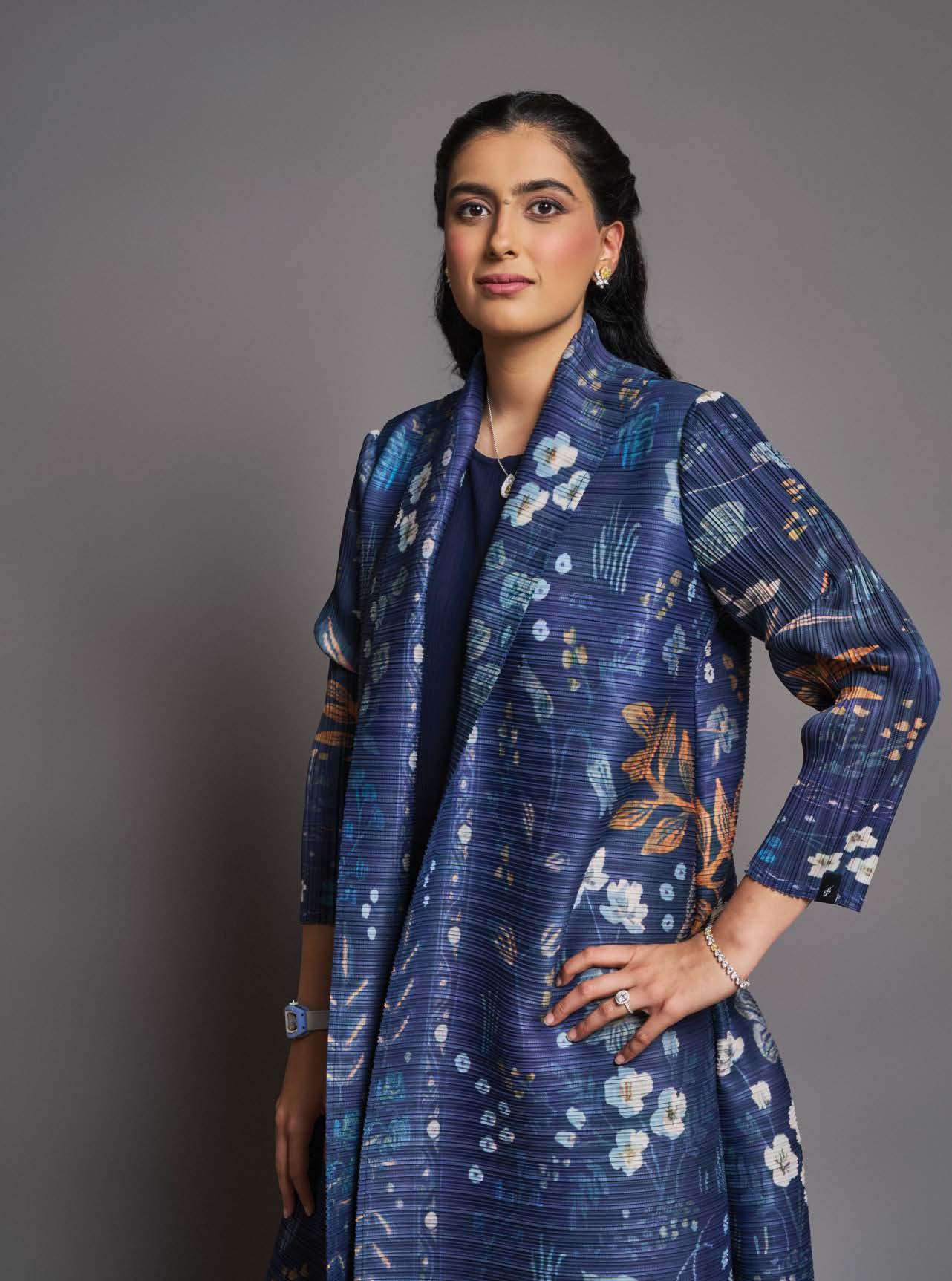
FOLLOW THE Leader
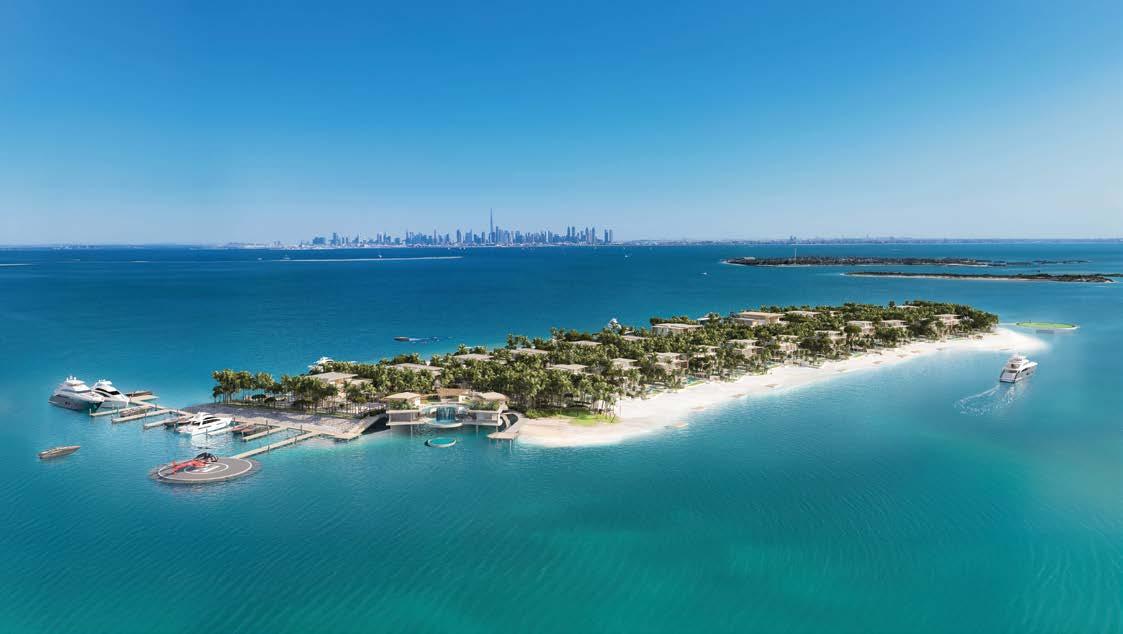
Amira Sajwani can remember the moment when she and her brother Ali Sajwani got the idea for a development project that would redefine luxury in the real estate sector, not just regionally, but globally as well. “Amali Properties, a boutique ultra-luxury property development firm, started when we were at one of our favorite spots by the beach in Jumeirah, planning our trip to the Maldives,” she recalls. “We thought, ‘Wouldn’t it be great if we could bring the same experience to Dubai?’ Then we saw the World Islands [an artificial archipelago built in the shape of a world map off the coast of Dubai], and we got on a boat a week later to check them out. This is the moment when we realized that this was the perfect concept for the perfect place.” The sister-and-brother entrepreneurial duo then poured
their energies over the ensuing 10 months to find a perfect location for a nature-infused sanctuary that would provide not just a home, but a tranquil retreat away from the city’s hustle and bustle. This resulted in them creating Amali Properties’ Amali Island project, Dubai’s first residential sail-in-and-sailout experience, complemented by a private marina, private beach, and other unique elements, on one of the islands within the archipelago.
“Once the perfect site was selected, we assembled a dedicated team of experts and engaged world-class architects and interior designers to bring our vision to life,” Sajwani continues. “ELASTIC, a globally acclaimed architectural firm known for its high-end hospitality and immersive experiences, led the design. They were supported by the
I
renowned hospitality design firm Hirsch Bedner Associates and the landscaping experts SquareM. Together, we crafted a truly exceptional living environment, blending luxury and seclusion.” The Sajwanis invested 10 months in searching for the ideal location for this project, and they will remain committed to careful planning and strategic development of their future projects as well. “Moving forward, we will
focus on creating even more distinctive and groundbreaking projects that push the boundaries of ultra-luxury living,” she adds. “We are dedicated to developing Amali Island into a premier destination, while continuing to explore opportunities within Dubai’s dynamic real estate market.”
Sajwani’s commitment to meticulous planning down to the last detail is also evident in her other venture, which is
WE ARE DEDICATED TO DEVELOPING AMALI ISLAND INTO A PREMIER DESTINATION WHILE CONTINUING TO EXPLORE OPPORTUNITIES WITHIN DUBAI’S DYNAMIC REAL ESTATE MARKET.”
PRYPCO, a UAE-based proptech firm on a mission to democratize real estate investing. “Traditionally, investments of this sort involved high entry costs, complex processes, and limited opportunities,” she explains. “At PRYPCO, our mission has always been to revolutionize the market, simplify the real estate experience, and make it inclusive to everyone. We enable individuals to start investing with as little as AED2,000. Our platform streamlines the process, allowing users to browse properties, assess rental returns, and view market valuations within just 2.5 minutes.” In addition, PRYPCO’s digital approach to the mortgage process streamlines collaboration with multiple parties, enabling its clients to receive instant pre-approvals without the inconvenience of extended credit checks. “This reduces the stress associated with the process and opens up the market to a broader range of investors—from newcomers to experienced professionals—allowing them to invest without needing to provide the full amount upfront,” Sajwani adds. “Plus, our golden visa services add even more appeal for
those looking to settle in the UAE, providing long-term residency benefits. We unite the entire real estate experience under one roof, addressing the challenge of high entry prices that can be a barrier for those with modest savings. Our platform caters to a generation eager to invest in the largest asset class globally, making real estate investment more accessible and inclusive.”
With her vast knowledge and experience, it is no wonder that Sajwani has become a recognized name in the real estate industry; however, she considers continuing education as being crucial to success. “Both PRYPCO and Amali are deeply rooted in my understanding of the industry and my commitment to innovation,” she says. “I’ve learned to grasp the finer details of a business, and turn every obstacle into an opportunity, staying true to my vision, despite the ups and downs.” Her commitment to excellence extends to her team as well, because Sajwani believes that leadership can—and should—be nurtured. “Most of my direct reports started in junior roles and grew into leadership
positions, because I believe in nurturing talent from within, rather than hiring straight into senior roles,” she says. “This builds trust and keeps us aligned towards our goals.” That said, she describes her leadership style “as one based on love rather than fear.” Sajwani concludes, “I believe you get true loyalty by nurturing people and building relationships, not by pushing them with fear. It’s easy to push people, but love is what inspires them to work from the heart. I’m proud of the people I work with; they have a strong bond with me, and they know I have their backs.”
Amira Sajwani shares her tips for entrepreneurs
}Hard work is essential “Hard work is the backbone of success. Stay determined, and don’t let setbacks deter you."
}Know your business “Understanding your business thoroughly and knowing the details helps you make informed decisions and confidently navigate the market.”
}Invest in communication and collaboration "Foster a culture of openness and teamwork to ensure everyone is aligned with the business’s goals. These principles will help you build a solid foundation, and lead with clarity and purpose."
→ PRYPCO is a UAE-based proptech firm that serves as a one-stop shop that brings together buyers, investors, homeowners, developers, brokers, and agents on a single platform.
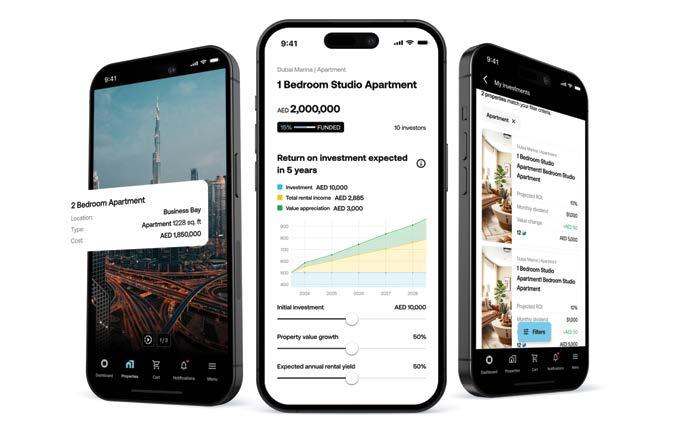
“BOTH PRYPCO AND AMALI ARE DEEPLY ROOTED IN MY UNDERSTANDING OF THE INDUSTRY AND MY COMMITMENT TO INNOVATION.”
FOLLOW THE Leader
FOUNDER /Aisha Jewels
by AALIA MEHREEN AHMED
In 2014, a few months ahead of her 18th birthday, Aisha Abdulmalik—who was still a high schooler in Bahrain at the time—declared that she wanted to use her innate artistic talent and creativity to design her own jewelry line, Aisha Jewels, which would combine tradition with technology. A little over 10 years since that decision, the company has cemented its position as a successful homegrown brand among its loyal customer base in Bahrain and beyond. “The emotions are quite mixed, actually,” Abdulmalik says.
“Like other things in our lives, we can only tell that we have grown and passed certain milestones by comparing ourselves to how we were at prior milestones. My biggest source of happiness is not the exponential growth we have achieved over the last ten years, but rather the fact that we still maintain the key pillars upon which we built Aisha Jewels, but only in a bigger way. We started the company on the principles of ‘creativity, happiness, and giving,’ and we continue to do so with ever-growing fervor.”
Envisioned as a brand that seamlessly weaves in the Khaleeji culture and heritage
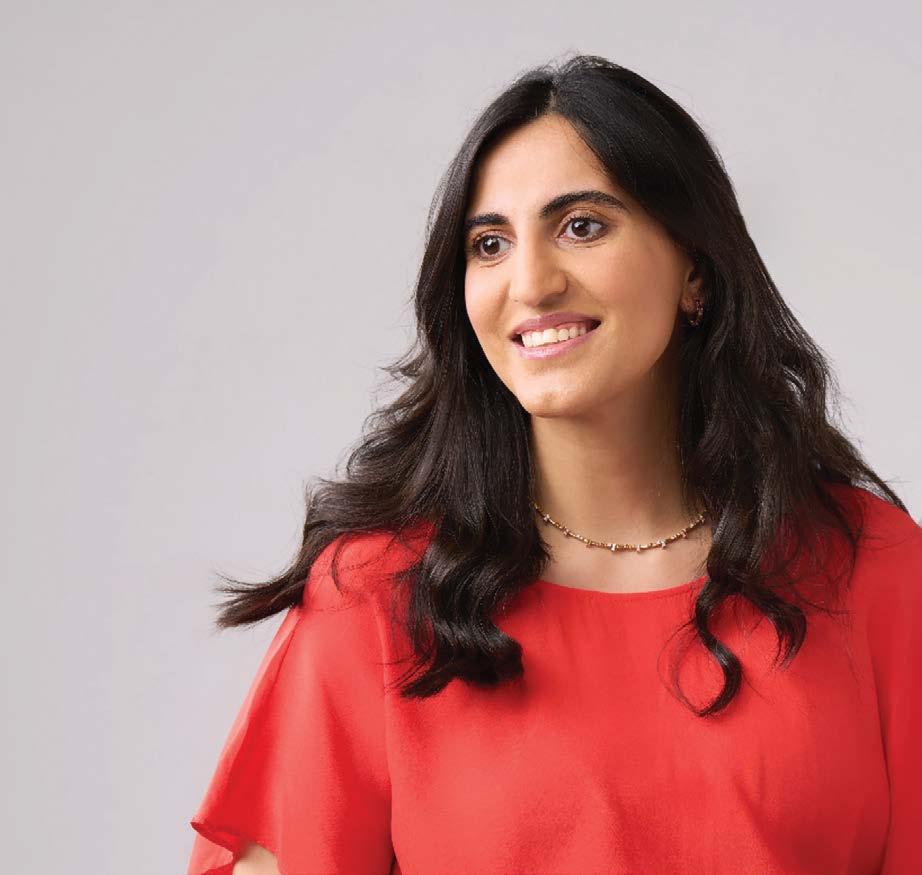
WE WERE CONTRARIANS IN BETTING THAT GOING HIGH-END WOULD BE SUCCESSFUL IF YOU PROVIDED EXQUISITE HANDMADE DESIGNS, SOURCED THE HIGHEST-QUALITY NATURAL MATERIALS, AND PROVIDED A MEMORABLE BRAND INTERACTION EXPERIENCE—EVEN IF THAT MEANT YOUR COST, AND IN TURN, YOUR PRICE, WOULD BE HIGHER.”
of the Gulf (particularly Bahrain’s) into its core design, Aisha Jewels is a high-end jewelry brand that offers handmade necklaces, rings, bracelets, and earrings made of yellow or white gold, which are intricately decorated with the finest gemstones and pearls. One of Aisha Jewels’ noteworthy collections is the Talaed, which features delicately designed ornaments made from gold, natural Bahraini pearls authenticated by the Bahrain Institute for Pearls and Gemstones (Danat), diamonds, and other natural gemstones. Another collection by the brand is Wehaj,
which offers a selection of jewelry items made of 18-karat solid gold, adorned with meticulously polished and cut natural diamonds and precious stones. Clients can also order custom-made jewelry by visiting Aisha Abdulmalek’s Design Studio, which offers in-person services such as testing skin undertones, shortlisting colors to match them with a customer’s personal taste, or even expert assistance in designing a given piece. In ensuring all of its collections and services are met with satisfaction by the end user, Abdulmalik notes that customer-centricity has
always been at the heart of Aisha Jewel’s mission. “Over the last 10 years, while our brand pillars have been solid and growing in depth and breadth, our operational model has kept being reinvented every three years or so to match new growth targets and enhance the experience of our clients and brand followers at the various touchpoints with the Aisha Jewels brand,” Abdulmalik says. “The common thread running throughout the various operational models and systems since we started is a vision pursuing a genuine relationship with our clients
↓AISHA JEWELS’ WEHAJ COLLECTION is a name derived from the Arabic word "wahj," which signifies the brilliance of diamonds, the warmth of molten gold, and the fragrance of perfume. Pictured here is the Wehaj Chic Intense Ring is made up of 18 karat yellow gold, pink sapphire, emeralds, peridot, and diamonds.


The core of what we strive to create is a jewelry brand deeply rooted in the regional culture, with everything you would expect to experience in the best global luxury brands.”
↑ The Majarra necklace is one of the most renowned designs of the Talaed collection, where a unique method is used to arrange and set a special size of natural pearls on 22-karat gold designs and are then inlaid with fine natural stones.
← AISHA ABDULMALIK is a Bahraini artist and jewelry designer who launched her own jewelry line brand Aisha Jewels in 2014 while she was still a high school student. This year, the 28 year-old is celebrating 10 years of running her business.
(whom we’ve embraced to even call ‘friends’ internally!), using state-of-theart technology, and paying attention to details in everything we do.”
Speaking about her venture’s results, Abdulmalik says that the company was able to grow its top line at a rate of 42% annually- starting right from the first year following its inception. “This naturally started very high, and it has slowed down recently as the base grows yearly,” she continues. “However, it still means, for example, that at the end of 2023, we had seven times the sales we had five years earlier in 2019. We have also always been self-funded with no external debt/equity exposure. Plus, our only loan is a working capital line from our key banking relationship with KFH Bahrain, now Al Salam Bank, a Shari’ah compliant financial lender in the nation.” Now, watching your venture grow from strength to strength is undoubtedly a dream every entrepreneur on this globe shares. But when you start a company at just 17 years of age, it is possible that certain decisions might later be perceived as having been “childish” or immature.

But that doesn’t seem to be the case at all for Abdulmalik, who, when asked what she would tell her teenage self today, replies, “I would say, ‘Good girl, Aisha!’ I would tell her you have done the one thing that a teenager would rarely do: realizing that older people are not uncool, and that listening to smart people and surrounding yourself with them is the secret to success!”
At the top of this list of “smart people” that Abdulmalik refers to is her father, whose advice on business is something she continues to treasure. “My father is an investment banker who, by the time I started Aisha Jewels, had started his own practice helping regional businesses build new platforms, and restructuring challenging ones,” Abdulmalik explains. “The first question he asked when I convinced him that I was serious about Aisha Jewels, and that I wanted to build it with my own money, was: ‘Have you heard about the concept of the ‘death valley curve’ for startups?’ I think the answer was very obvious on my blank 17-year-old face, as he went on without
waiting for an answer, listing a few things which I went on to completely memorize. So, today, while I delegate much of the financial part of the company to colleagues who are smarter and more specialized than me, there are some key points which I continue to repeat like a mantra: the first being that young companies die because of a lack of liquidity, not profitability; so watch your cash. Second, don’t be misled by trading volumes or accounting profits if they don’t translate into positive cash flow. And lastly, early-stage debt creates a false sense of prosperity, so avoid it as much as possible.”
Now, while her father’s guidance was the first step of reassurance that came Abdulmalik’s way in her entrepreneurial journey, another such moment came in 2015, at the very first Jewelry Arabia exhibition, an annually held luxury event in Bahrain that showcases the latest designs in jewelry, gemstones, and luxury watches. “The Devji Group of Companies [a Bahrain-grown business conglomerate with a key presence in the jewelry industry], who have been our family friends for decades and are Aisha Jewels’ only manufacturing partners until now, gave me a desk within their booth at the exhibition to showcase my few pieces,” she recalls. “We sold them all, and we got orders for new ones. That gave me a pretty obvious indication of a market hungry for exquisitely designed high-end jewelry pieces.” According to Abdulmalik, holding on to this ethos— despite being in a market prone to shifts in consumer behavior and demand—has helped Aisha Jewels stand out in this landscape. “We were contrarians in betting that going high-end would be successful if you provided exquisite handmade designs, sourced the highestquality natural materials, and provided a memorable brand interaction experience—even if that meant your cost, and in turn, your price, would be higher,” Abdulmalik says. “Everyone told us that the market was shifting toward retail strategies focusing on standardized, }}
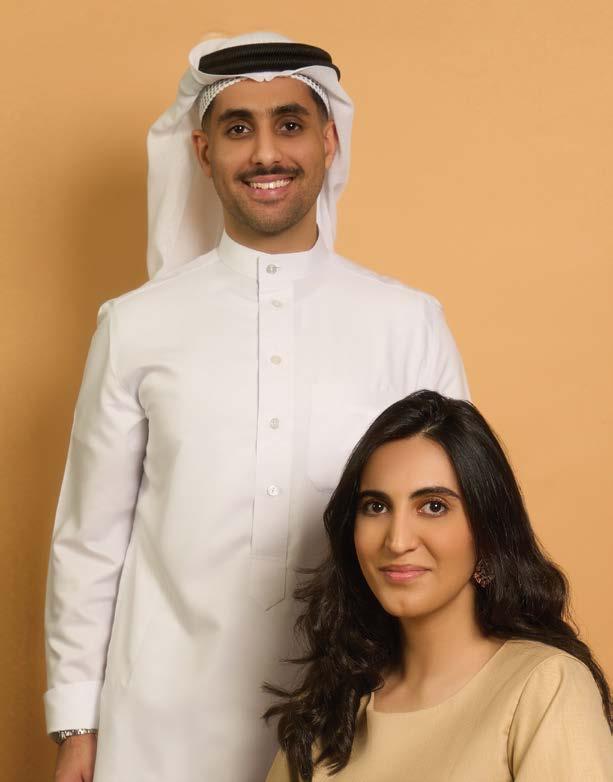
mass-produced products that would result in beautiful and affordable designs. We agreed with that as a general market trend, but our bet was that our target clientele base would be happy to pay for higher quality products, and would wait ten weeks until we produced them, as they always run out of stock. So, we went the other way. It sounded crazy to most, but it worked very well for us, and we feel that we have only scratched the surface.”
A few years into the venture, Abdulmalik was joined by two familiar faces at Aisha Jewels: her brother Abdulaziz Abdulmalik, who joined in 2018 and is currently the company’s Creative Director, and her cousin Awatif Al Samaim, who was appointed General Manager in 2020. Today, the team behind Aisha Jewels comprises of a group of young Bahrainis, who are mostly women. But the demographics of the team wasn’t intentional, Abdulmalik says.
← In 2018, AISHA ABDULMALIK was joined by her brother ABDULAZIZ ABDULMALIK as a founding partner of Aisha Jewels; today he also works as the company’s Creative Director. The team at Aisha Jewels is composed entirely of Bahraini individuals, with women representing 80% of the workforce.
My biggest source of happiness is not the exponential growth we have achieved over the last ten years, but rather the fact that we still maintain the key pillars upon which we built Aisha Jewels, but only in a bigger way.” “
to multitask, and Bahraini women in specific have a 360-degree vision when thinking about creating the right experience for our brand, especially given that the majority of our audience are Khaleeji women with a discerning taste and high sensitivity to detail.”
“We don’t seek to fill quotas based on gender or nationality,” she says. “The team formed organically—it just happens to be mostly Bahraini women. It started with my brother, co-founder, and currently Creative Director, Abdulaziz, deciding to join. Then, once we saw significant growth, Awatif joined us as a third partner, and currently General Manager. The rest of the team came together organically, as our most important prerequisite for hiring is purely based on talent and potential. I think it all worked for the best of Aisha Jewels.”
That said, a workforce with women in the majority has indeed led to a lot of advantages for Aisha Jewels. “The core of what we strive to create is a jewelry brand, deeply rooted in the regional culture, with everything you would expect to experience in the best global luxury brands,” she says. “So, call me biased, but I do think that women have a unique ability
Abdulmalik has lent much of this perceptiveness to herself too- after all, a leader must perhaps, first and foremost, study one’s own strengths and shortcomings. “I am told that I work very hard and push everyone around me to work as hard,” Abdulmalik admits. “Over the years, I have come to realize that, surprisingly, this is not everyone’s cup of tea. I noticed that some very talented people do not have the stamina to work at full capacity all the time. Because my father, who continues to be my mentor, Abdulaziz, and Awatif work very much like me, we only learned this the hard way by losing talent. To address this, we now spend a lot of time ensuring applicants understand our culture, and we have quarterly reviews to ensure everyone works at her/his own pace. That being said, some new colleagues still surprise us by being as driven as we are, if not more!”
It is with this drive and vigor that Abdulmalik and her team now hope to deepen their impact in the Middle East. In January 2024, the company announced its plans to enter the Egyptian market by setting up a base
in the country. “We actually started as a virtual company with a state-of-the-art e-commerce platform that we meticulously crafted to cater to the needs of our audience in 2014,” Abdulmailk explains. “This meant that we were technically global from day one (you can only imagine the panic we had when we received our first order from Canada!). But when it comes to active coverage, our focus now is primarily on the GCC, and we are determined not to look beyond it until we have achieved our regional targets. As I mentioned, we feel we have just scratched the surface, and we don’t want to distract ourselves.” On a final note, when asked what is next for Aisha Jewels, Abdulmalik displays the same self-assuredness with which she began this venture. “Well, we have always done the same thing from the first year we started: we never forecast/ budget sales numbers, as we believe they are a result, not a cause,” Abdulmalik declares. “We start by drawing a picture of the next level to which we want to take our brand and break it down into a list of deliverables focusing on our three pillars of ‘creativity, happiness, and giving’ to the community. Then, we ensure we can self-finance it, considering the ‘death valley’ fear of running out of cash. Finally, we work as hard as we can to achieve it—that’s it!” aishajewels.com
CO-FOUNDER AND CEO / Amali Properties
by TAMARA PUPIC
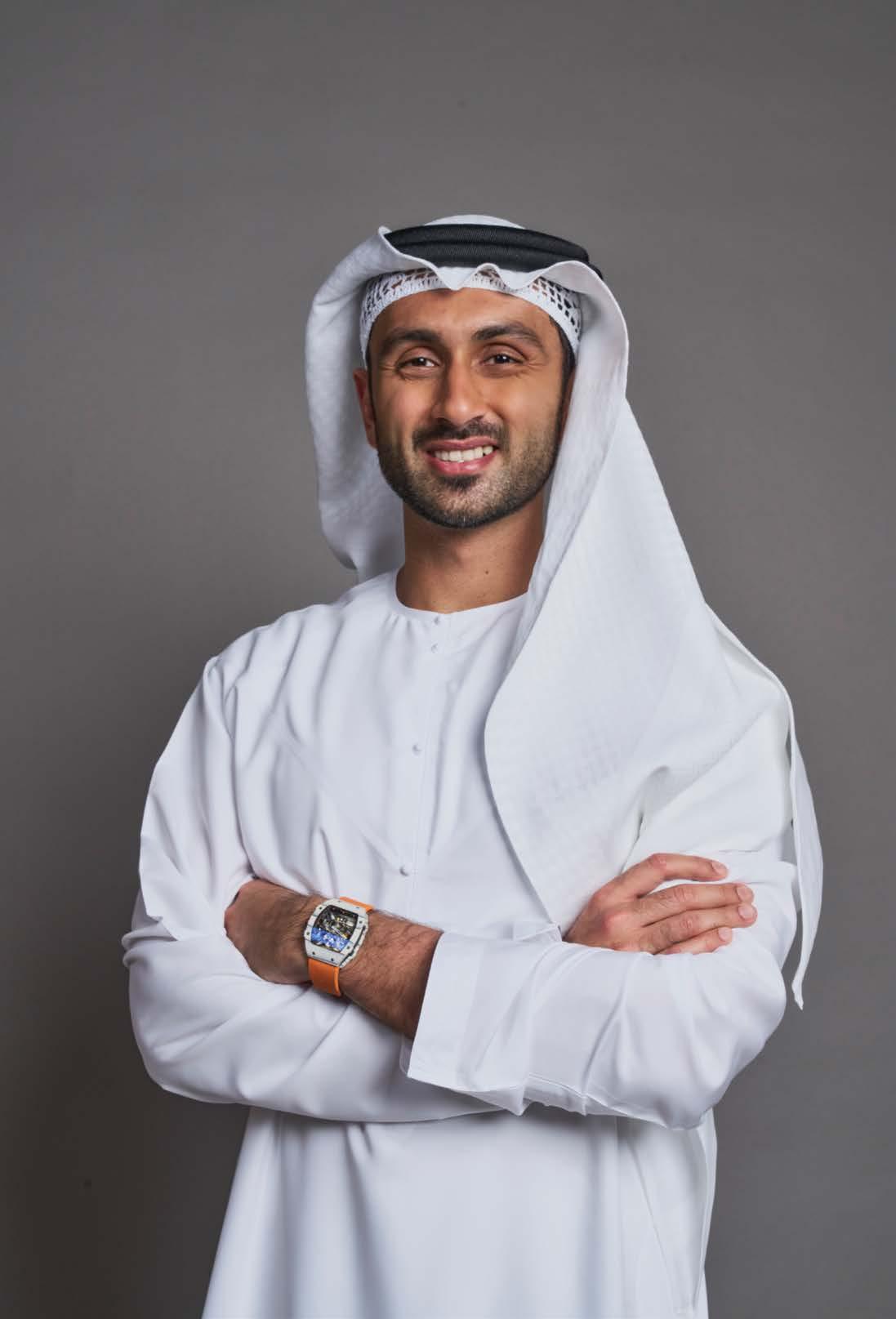
“I BELIEVE THAT
ONCE THE MARKET AND INDUSTRY WITNESS OUR PRODUCT AFTER ITS DELIVERY, IT WILL SET A NEW STANDARD IN THE ULTRA-LUXURY REAL ESTATE INDUSTRY WORLDWIDE, PARTICULARLY IN
TERMS OF ISLAND AND BEACHFRONT LIVING.”
Ibegan my journey in the real estate industry when I was only 13,” says Ali Sajwani, co-founder and CEO of Amali Properties, a Dubaibased boutique ultra-luxury property development firm that he co-founded with his sister Amira Sajwani. “I used to go to the office on weekends and learn about gross margins, valuation metrics, and much more. This early foundation of knowledge helped me carve out a path for my career in real estate.”
Sajwani’s early exposure to the industry comes from his family business, DAMAC Properties, a Dubai-headquartered multi-billion dollar global real estate development company, and it seems to have been pivotal for the immediate success of Amali Properties which has made headlines across the globe with its very first project—the US$544.5 million-worth Amali Island development. “My sister Amira and I have always aspired to leave our mark on the real estate industry,” he says. “We have been considering it for a while, but we took our time because we wanted to create a brand that would truly disrupt the market. Amali Properties is the perfect concept, 24
ultra-luxury beachfront mansions, super exclusive, and unique.”
While developing the Amali Island project, Ali and his sister invested 10 months in searching for the right location, and nine months in developing the whole concept. “We meticulously considered every detail of the architecture, landscape, and finishes, with the goal of creating a product that Amira and I would genuinely want to live in,” Sajwani explains. “Searching for the perfect location led us to the islands of São Paulo and Uruguay [within the Dubai World Islands archipelago], just six minutes away from Dubai mainland by boat. We merged the two islands to create a land area of 1,200,000 sq. ft., though purchasing those islands was a complex process.” And despite the duo’s specialist expertise in the real estate sector, Sajwani admits that “working on a project like Amali Island—and developing it—is no walk in the park.” He adds, “Building anything on the Dubai World Islands [a man-made archipelago arranged to resemble a world map off the coast of Dubai] requires a specialized skillset, and we fully recognize the complexity

MY DIRECT AND CLOSE TEAM KNOWS THAT I’M ALWAYS ON TOP OF MY BUSINESS AND FULLY DEDICATED TO IT. AS A LEADER, YOU NEED TO INSPIRE AND INSTILL THIS DEDICATION IN YOUR TEAM AS WELL.”
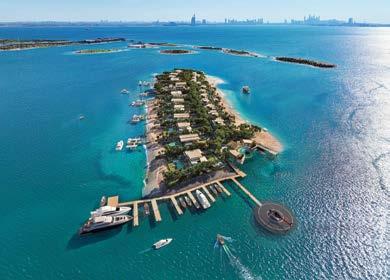

involved. It’s completely different from constructing a real estate project on the Dubai mainland. We need to carry out marine works to ensure pristine beaches for our clients, manage all logistics on-site, position the labor camp close to the island, and even conduct concrete batching on-site, among many other tasks. These challenges are exactly what attracted Amira and I to this project, because we knew it would be a learning experience. We are fully confident in delivering a product that no other project in Dubai offers.”
Another interesting story about how the brother-and-sister duo went about developing the Amali Island project relates to some of its features—Sajwani reveals that the project was initially
meant to have two architectural styles and two interior design styles. “However, we ended up appreciating each other’s styles so much that we mixed elements from both,” Sajwani continues.
“What’s funny is that when we launched the project, 90% of our clients chose an architectural style developed by me, and an interior style developed by Amira. It was a fun journey, and a new experience for us. We felt that we truly complemented each other, as Amira and I have always been close since childhood, and we share the same taste and vision.” And their dedication to the project paid off quite quickly. “The total project value is US$544.5 million, we sold out 22 out of the 24 mansions within a month of our project’s launch,” Sajwani says.
“The remaining two mansions are priced upwards of $13.6 million. These statistics highlight the immense demand and need for such a unique project.” Sajwani is also proud that the Amali Island project has attracted a variety of clients representing a variety of nationalities and backgrounds.
“Some clients purchased a mansion as
their primary residence, others as a weekend or holiday home, and some for capital appreciation, recognizing the project’s value,” he says.
“Our buyers come from the local market, Europe, South and East Asia, as well as various Arab countries. It’s been a pleasure for us to see that our project has demand from various different nationalities.”
For developing such a niche and unique concept that has managed to stand out in Dubai’s already highly competitive luxury real estate market, Sajwani has relied on a leadership style that he describes as “assertive but fair.” He says, “It is about ensuring that my team stays sharp and doesn’t fall into a relaxed environment that could ultimately slow us down,” he explains.
Ali Sajwani shares his tips for entrepreneurs
}Always take risks "Don’t be afraid to try new things. People often regret the things they didn’t do more than the things they tried."
}Do what you love "When you’re doing something you truly enjoy, it doesn’t feel like work.”
}Pay attention to details "It goes a long way!"
“My direct and close team knows that I’m always on top of my business and fully dedicated to it. As a leader, you need to inspire and instill this dedication in your team as well. You know what they say, ‘The pack takes its cue from the alpha wolf, and when that wolf is wise and mindful, the whole pack prospers.’ On the other hand, if you, as a leader, are too relaxed, your team will likely adopt the same attitude.” As for the road ahead, Sajwani does not plan to rest on his laurels. “Our main goal right now is to successfully build and deliver Amali Island to our clients who believed in us by 2027,” he concludes. “We have big plans for the future. I believe that once the market and industry witness our product after its delivery, it will set a new standard in the ultra-luxury real estate industry worldwide, particularly in terms of island and beachfront living.”
→ Charlotte Borghesi is the co-founder and Managing Director of Kidzink, a Dubaiheadquartered educational design and manufacturing group.
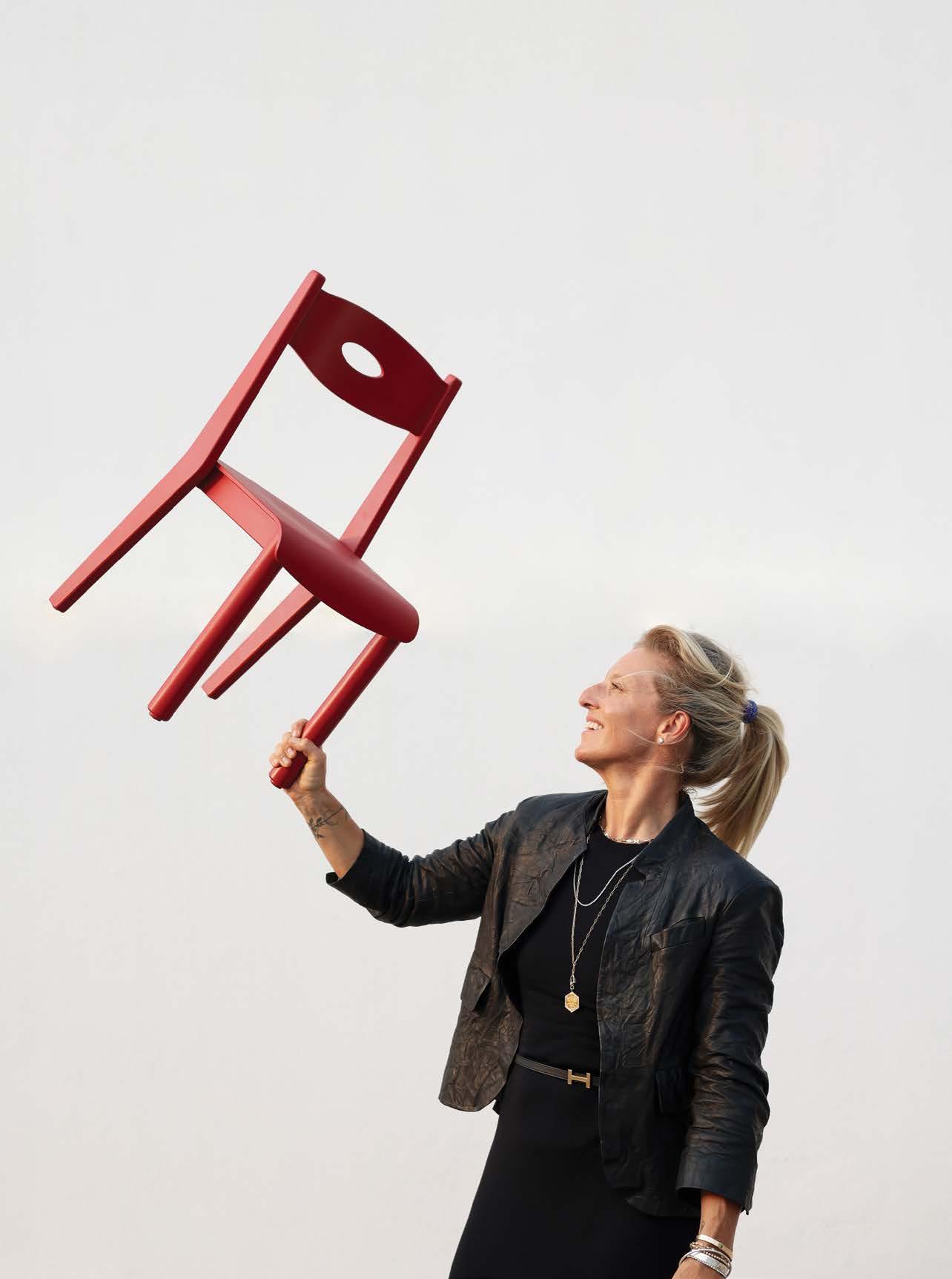
CO-FOUNDER AND MANAGING DIRECTOR /Kidzink by TAMARA PUPIC
Back in 2017, when Charlotte Borghesi learnt that her children’s nursery was about to close as its owner was going to retire, she decided to buy the enterprise to keep it running. Little did she know that in a span of only seven years, that decision would create a ripple effect that would eventually lead her to become the co-founder and Managing Director of Kidzink, a Dubai-headquar-
today, and little more than a piece of paper, and that was the start of Kidzink as it is known today, a global educational design, architectural, and manufacturing firm dedicated to envisioning and realizing spaces and communities, where knowledge flourishes, and the dreams of young people take flight.”
At the beginning, Kidzink was in the business of trading school furniture, as Borghesi and her co-founder (and husband), Paolo Borghesi, were buying
WE NOTICED THAT THERE WAS A TREND IN OUR SECTOR OF OVER-PROMISING AND UNDER-DELIVERING, SO WE AIMED TO DO THE OPPOSITE.”
tered educational design and manufacturing group that today has projects in 23 countries. “After that purchase [of the nursery], we learned that the owner also had a furniture import business that she was in the process of closing down,” Borghesi explains. “After some talks with her, she finally agreed to allow me to purchase that business, which essentially was a trade license, one employee who was currently in the process of closing accounts and sunsetting the business, as well as a hard drive. I found myself in a completely different industry with one employee, who is still with us
furniture from Europe, and selling it in the UAE. But this was not without obstacles, as their young company had no brand name and no track record either. “We gained credibility through a number of ways, but initially it was relationship building,” Borghesi says. “My husband Paolo and I ensured that we always attended customer meetings so that customers knew us. We also noticed that there was a trend in our sector of over-promising and under-delivering, so we aimed to do the opposite. We never discussed how much money we would make on each project, and indeed, many times, we lost money,
but our goal was to make our delivery and service amazing, so that all of our customers would talk about us to their friends.”
As time went by, the husband-and-wife entrepreneurial duo went on to invest in a more advanced in-house design team that would work with schools to bring innovation to classroom design. “The industry had seen little innovation, which, in turn, was holding back school design,” Borghesi says. “It was then that we started to design our own furniture, with the aim that it should be something European manufacturers won’t be able to compete with, given their strong focus on mass production; so, our only option was to work with local carpentries here in Dubai. We searched for the best, and despite paying crazy prices
for our furniture to be made, we had many issues with unreliable suppliers who oversold their capabilities, low quality, poor services, and quite frankly, it was an impossible situation to work with.”
But this desperation led to the creation of their own manufacturing facility that could ensure the provision of high quality, well designed, innovative, and safe furniture to their clients. “We started small with one manufacturing method, and then we invested in high quality machines and materials, and we have already expanded our manufacturing capabilities by 100-fold,” Borghesi says. “We’ve built this up from a small rented warehouse with four people, to our own purpose-built 15,000 sq. m. manufacturing facility that, five years later, }}
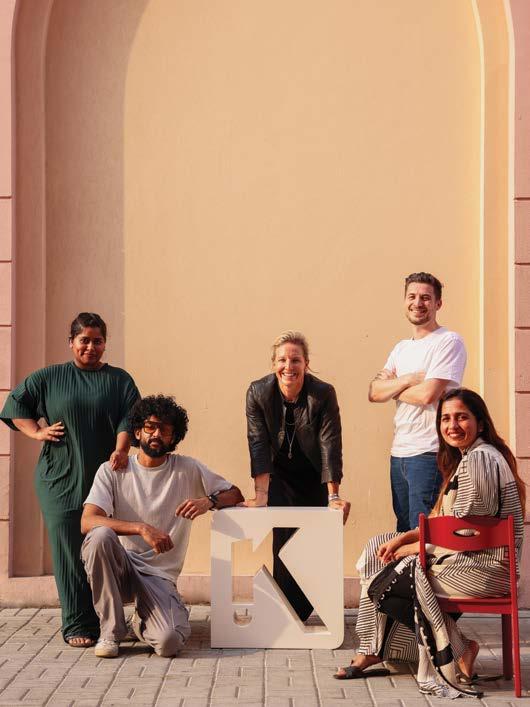
Borghesi proudly states
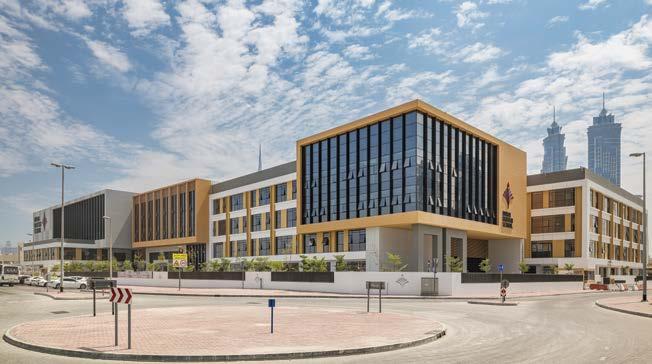
produces everything a school needs in-house.” In addition, the Kidznik enterprise today also includes in-house architectural firm called the Kidzink Office of Design and Architecture (KODA). “It started as a dream, and three years later, it has become a reality, with over 25 projects in design or under some stage of construction,” Borghesi says.
While Kidzink today has projects that range from single room projects of AED50,000 to over AED30 million (as well as a healthy business growth of 40% per year), Borghesi still has the company’s first full school order, which was placed in 2019, etched in her memory. “It was a single order of over AED6 million,” she says. “The biggest order we had delivered before that was less than one-tenth the size. I can still visualize the day it was confirmed, and the fear we had about how to deliver it. We spent hours as a team planning the execution and all of the details. There were many things that we had never done before, starting with executing a project in Qatar during the regional diplomatic crisis [at the time]. Delivering the project took teamwork, diligence, innovation, creativity, and a lot of hard work, with some headaches. But we delivered everything on time and as planned, and we completely exceeded the customer’s expectations. This challenging but significant order, and the way our team delivered it, transformed the
trajectory of our company, and played a monumental role in the company we are today.”
Speaking about the team at Kidzink, Borghesi—whose three (out of seven) children work for the company—firmly states that it has been core to the success of the company. “When we started, we could not afford experienced and proven talent, and we also found that the best people were not always attracted to startups, and the ‘best’ graduates always had a target list of companies they wanted to work for,” Borghesi recalls. “In spite of that, we specifically sought young talent with tons of energy, drive, creativity, brain power, and confidence, because we knew that the people and the team were key to success. Identifying great talent potential was a huge task, but we gradually we found a core team of amazing fresh graduates that we trained, and we then brought in people from their networks and their friends. This is how we both grew the company, and also fostered a great culture. We still hire for cultural fit and attitude rather than strict technical know-how and experience.” Borghesi proudly adds here that the employee voluntary retention rate at Kidzink is above 99%, adding, “Before Kidzink, Paolo and I had spent many years working in some of the most reputable global multinational companies, who celebrated achieving voluntary retention at 75%, and those were companies that had unlimited
Charlotte Borghesi shares her tips for entrepreneurs
}Ditch the ego “When things aren’t going well, take personal responsibility. When things are going well, give your team the credit. Never attribute anything to luck. Through my journey since founding Kidzink, we have made so many mistakes, mainly through empowering people to do something they have never done before. At the same time, we have delivered so many amazing things that you could say we have been in the right place at the right time. We have never fired anyone for making a mistake, and we have never just been lucky. We have worked hard to convert any lucky situation into an opportunity, and we have given everyone the space to grow and make mistakes.”
}Work on understanding yourself first “There is an amazing book written by Patrick Lencioni, The Three Big Questions for a Frantic Family, in which he turns his sights on the most important organization in our lives, the family. This book is thoughtprovoking, and it has a process at the end to help you define your personal and family values. This helped me set the foundation of our Kidzink values, ensuring that as our company grows, it reflects me as a person and leader. In addition to values, know your strengths and weaknesses.”
}Surround yourself with the right people, even if they not the most experienced, and trust them “Our ultimate strategy has been to find passionate, driven young people, put them in a meritocratic culture, challenge them with big goals, and give them a stake in the outcome. The production head of our factory, Laswin Abraham, joined us at age 22, straight out of university, having studied civil engineering. He had a passion for designing and making furniture, but no experience. His hire came after we hired an experienced head of manufacturing from one of our main global competitors who, ultimately, was not agile enough to run a startup. We parted ways with him after a few months, and we threw Laswin in the deep-end, but with the right support from us as leaders, and with the right learning opportunities. We have sent him around the world to spend time in the best manufacturing facilities in the industry, and I can guarantee there is no one who can deliver what he is delivering for our company, and our customers, anywhere else in the world.”
}Have a relentless determination to do what is right, not what is easy “It’s important to have an absolute commitment to do whatever it takes to make your company great. Often, doing what is right also comes at a cost, but this investment pays back every time. I see it over and over again with how we delight our customers, delivering on our promises, no matter how hard the challenge is.”
means and 100+ year reputations, whereas we are just a small family-run business.”
Being based in Dubai is another key to Kidzink’s success, says Borghesi. “It is home to one of the world’s most competitive education markets in the world, the second largest private education market, as it is home to more private schools in close proximity to each other than anywhere else in the world,” she says. “I believe that a company at the leading edge globally for school design and school furniture design should be based in the UAE. This market has challenged us, and it also allows us to innovate, create, and differentiate, not just following new cutting-edge trends and innovations in education, construction, and design, but setting the benchmark for our industry globally.”
Looking back on her own experience, Borghesi’s advice for anyone looking to start a business in the UAE is to embrace the optimism and long-term vision of the country, but also to contribute to it.
“Find a way to contribute to society, or your sector through your business, and lean into that—make something that you are passionate about and proud of,” says Borghesi. “Running a business anywhere in the world can be like a rollercoaster, and this is also true of the UAE where the business landscape is extremely dynamic. But like any rollercoaster, there will be ups and downs, and overall, it should be enjoyable.”
When it comes to leadership, doing work that adds value is what headlines Borghesi’s approach in
that department. “It is about giving yourself freely to others,” she adds. “You might give through money or time, or service to a cause, or to your country. Being generous does not deplete your energy; rather, it is the reverse. Secondly, it’s about trust. I believe a leader should assume the best in their people, and accept that sometimes they disappoint. Of course, I have been burnt, quite a few times, but it is far more often that I find that people rise to what you believe in them. Finally, leadership should not be about what you do, but who you are. A great company reflects the core values of its leaders. It’s important to have a clear guiding philosophy in life, not just one defined by money and business results. I come across people who believe that they should grow more rapidly to earn more money, but if you define success by money and revenues, you always lose. The real scorecard in life is how well you build meaningful relationships, and how well you live your core values.”
“I FOUND MYSELF IN A COMPLETELY DIFFERENT INDUSTRY WITH ONE EMPLOYEE, WHO IS STILL WITH US TODAY, AND LITTLE MORE THAN A PIECE OF PAPER, AND THAT WAS THE START OF KIDZINK AS IT IS KNOWN TODAY. ”
Now, for all of her accomplishments as a business leader, there’s one other achievement of Borghesi’s that we’d like to highlight here—in February 2024, she made history by leading Team Kidzink to victory in the Dubai Duty Free SB20 Triple Sailing Championships, and thereby becoming the first UAE-flagged and women-helmed team to secure this world championship title. Looking back on this win, Borghesi says that there are many
parallels when it comes to success in business and sport. “I would actually say that being an entrepreneur helped me learn what I needed to do to win the SB20 World Championships,” Borghesi says. “These are lessons across business and sport that can be applicable anytime you are working towards achieving a big goal, from setting a goal and obsessively working towards it, to accepting that sacrifice is part of the equation.”
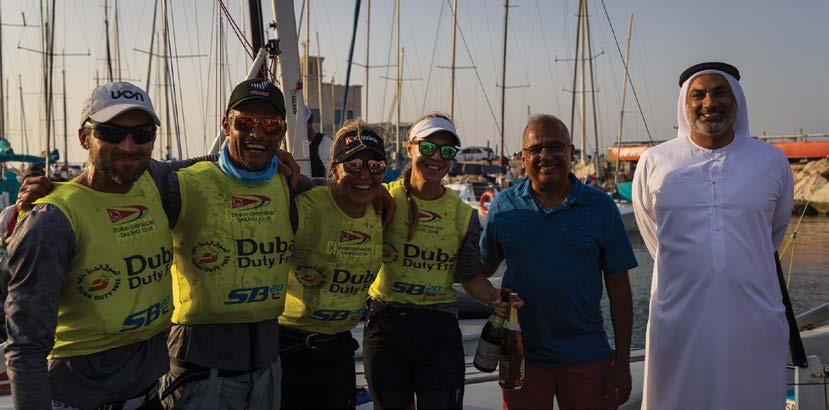
GROUP CEO /Financial Services, Al Ramz
by AALIA MEHREEN AHMED
When Haisam Odeimeh joined UAE-based financial institution Al Ramz in the latter half of 2017 as its Chief Financial Officer (CFO), he had come into a company that was already close to celebrating its 20th anniversary. You see, Al Ramz was founded in 1998, and since then, the institution has offered its services in the UAE across a wide range of areas including asset management, corporate finance, brokerage, security margins, market making, liquidity providing, public offering management and financial research. Odeimeh, who has been a key personnel in introducing innovation within Al Ramz’s offerings over the years, is today the company’s Group CEO - Financial Services, and it is a role that he claims to be relishing. “My role at Al Ramz is to guide our strategic vision while ensuring we stay true to our core values,” Odeimeh shares. “I oversee the formulation and execution of our plans, particularly in financial technology, where we aim to pioneer innovative solutions in trading and investment. What excites me most is the opportunity to push boundaries, creating solutions that truly benefit our clients. As such, my approach to managing responsibilities is rooted in collaboration; I prioritize strategic goals, and I then work closely with our teams to ensure alignment and shared focus, all while fostering an environment of trust and innovation.”
Now, right from the start of his Al Ramz journey, Odeimeh has been a part of a firm that carries a lot of history, and with that comes the added responsibility of staying true to its legacy as well. So, how has Odeimeh managed to strike a balance between keeping up with the latest fintech trends, while also carrying forward Al Ramz’s core values? “Well, maintaining this balance requires a flexible yet steadfast approach,” the Group CEO replies. “While our principal goals, maximizing investor returns, reducing risks, and fostering a well-informed investor community, remain constant, we recognize the need to adapt our strategies to meet evolving market demands and regulatory changes. The key is to stay true to our vision while being open to innovation, allowing us to
natural stones.
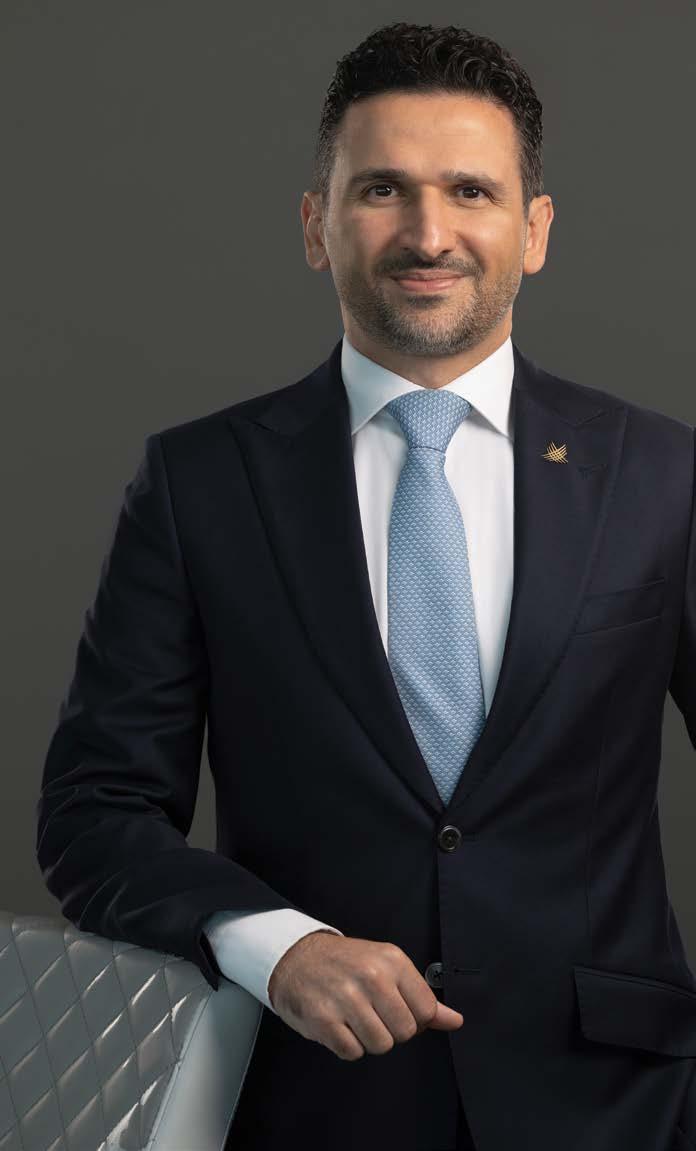
pivot when necessary without losing sight of our foundational values.” This is thus the ethos with which Odeimeh has now taken on a brand-new responsibility of being at the helm of Al Ramz’s new trading app, which is simply called the Al Ramz app. Built as an avenue that offers comprehensive insights into listed companies, this app allows investors to trade in the US and the UAE markets, while offering real-time market feeds and news updates, detailed market information, and an array of analytical tools that enable informed decision-making. The top distinct feature of the app—one that Odeimeh and his team are betting on heavily—is the inculcation of a robo-advisor that is powered by generative artificial intelligence (GenAI). This tool promises to offer investment advice that is tailored to any given user’s financial goals at an affordable rate—an end result that is typically associated with expensive traditional advisory services. “Unlike many other market participants, we focus on building bespoke portfolios, rather than relying on proxies like exchange traded funds (ETFs),” Odeimeh addss. “This approach, combined with advanced quantitative models and rapid execution capabilities, allows us to offer a service that

is not only cost-effective, but also highly responsive to market conditions, safeguarding our clients’ interests.”
A notable highlight of the app is that in addition to the American and Emirati markets, it also allows trading in other regional markets, while including instant access to initial public offerings (IPOs) in the UAE. What’s more, in a bid to provide a simplified registration process, users can enjoy quick and direct access to the app through their UAE Pass, Gmail, Apple, or LinkedIn accounts, thereby enabling them to start trading within seconds. Available in both English and Arabic, the Al Ramz app also offers a copy trading feature using which investors can automatically replicate the trading strategies of successful investors. “Our primary goals with this trading app are to create a knowledgebased investment community, facilitate innovative investment modes like social trading and robotic advisory, and ultimately become the market leader in client profitability,” Odeimeh says. “To create a lasting impact, I believe the key lies in balancing innovation with a deep understanding of our customers’ needs. This means staying true to our core mission of maximizing investor returns while continuously evolving our services to meet the demands of a dynamic market.”
Now, while Odeimeh’s leadership skills have certainly been influenced by the Al Ramz culture, he notes that his past experiences at UAE-based audit, tax and advisory
While our principal goals, maximizing investor returns, reducing risks, and fostering a well-informed investor community, remain constant, we recognize the need to adapt our strategies to meet evolving market demands and regulatory changes.” “
services firm KPMG
Lower Gulf and UAEbased Al Hilal Bank have also played a key role. “My career has been shaped by experiences that have instilled in me the importance of leading with vision and empathy,” Odeimeh observes. “On this journey, I learned the value of integrity and attention to detail, while my role in setting up a commercial bank taught me the importance of adaptability and collaboration. These lessons have greatly influenced my leadership at Al Ramz, where I strive to lead in a way that is both decisive and inclusive.” As such, the culmination of his experiences have so far molded Odeimeh into the business leader that he is today, but when asked if he has any role model he looks up to, Odeimeh says there is no one name he’d pick over another. “I’ve drawn inspiration from a diverse range of leaders across various fields, rather than any one individual,” he explains. “It’s the collective }} ingenuity, resilience, and capacity to drive meaningful change that I admire most. The way these
We’re committed to refining the user experience, integrating feedback, and enhancing the app’s capabilities to ensure it remains a leader in the market. The challenge of managing change within an organization steeped in tradition has been significant, but I believe our accelerated digital adoption has positioned us well for future success.”
leaders navigate complex challenges, foster innovation, and unite teams towards a common goal is something I strive to emulate in my own leadership. If I had to describe my leadership style in three words, they would be: empowering, collaborative, visionary. These traits are at the core of how I lead, ensuring that our team is motivated, aligned, and always looking ahead to the future.”
For the foreseeable future, Odeimeh has his work cut out for him as he drives the growth of the Al Ramz app, a project that, in many ways, is a manifestation of the traditionmeets-innovation premise that he has carefully crafted over the years. “The journey of developing our latest trading app has been both challenging and rewarding,” Odeimeh says. “One of the most promising outcomes is the creation of a platform that not only meets, but anticipates, our users’ needs, fostering a more informed and engaged investment community. However, this journey has also highlighted the need for continuous adaptation.
Haisam Odeimeh shares his tips for entrepreneurs
}Foster a culture of innovation “Encourage your teams to think creatively, and challenge the status quo. Make innovation an ongoing practice, not a one-time event.”
}Lead with empathy and vision “Balance strategic goals with a deep understanding of your team’s needs. A clear vision is essential, but connecting with your people is what drives success.”
}Empower your people “Trust your team to take ownership of their roles. Empowerment leads to accountability and drives individuals to exceed expectations.”
}Adapt and evolve “Stay flexible and open to change. The ability to adapt strategies and approaches as new challenges arise is crucial for long-term success.”
FOUNDER AND CEO /Prestidge Group
by TAMARA PUPIC

→ In a world-first, Prestidge spent 48 hours on metaverse and VR platforms non-stop, interviewing 21 experts across 33 different “worlds,” for a 50-minute documentary, 48 hours in the Metaverse.

Entrepreneurs who have a strong gut feel about an idea, and more importantly, have the confidence to trust and follow it, all hope to—one day—reach a point to say, “The market has finally caught up with us.” In the case of Briar Prestidge, founder of the executive branding and public relations (PR) agency Prestidge Group, that moment is now, given that the business landscape today sees leadership profiles being a common part of corporate marketing budgets, and the social media presences of CEOs both influencing purchasing decisions and building trust in brands. But this certainly wasn’t the case eight years ago, when Prestidge launched her enterprise in Dubai—her fledging business was then quite ahead of its time. “In 2016, CEOs and executives were more focused on traditional media, and they weren’t considering building their social media presence,” Prestidge says. “People only posted on LinkedIn if they were looking or hiring for jobs. However, with the rise of social media, I could see how fashion and beauty bloggers were building digital communities on Instagram, and with this came brand awareness, trust, and influence.”
However, Prestidge’s idea to propose a similar social mediafocused branding approach to business heavyweights and their closest teams was quickly dismissed by her peers. “Many experienced people in the agency and communications spaces told me that my business would fail, and that companies wouldn’t pay for this service; only individuals would, and therefore, it would be hard to grow and scale,” Prestidge recalls. “It was difficult not to listen at the time, especially when I had quit my full-time job, downgraded my apartment to a small, windowless room that barely fit my bed (the cheapest I could find on the market), and I was eating frozen vegetables and flavorless pasta every night. But, despite not having much, it felt like an adventure, and I had hope and excitement about the future. I could see how the media landscape was changing, and I knew it was just a matter of
“
I believe we are living in the most exciting time in human history, it’s an era of extraordinary possibilities—because through science, medical and technological advancements, we have the power to shape humanity.”
time before companies would write ‘executive branding’ into their corporate budgets.”
Those early days of Prestidge Group are a stark contrast to where the business is now—it is today a 360-degree agency that combines traditional media strategies with comprehensive digital branding services that boasts of a portfolio of clients that range “from the granddaughter of a prince, to property developer conglomerates, to university presidents, to cybersecurity advisors to the US government, tech entrepreneurs, sustainability investors, longevity clinics, and what feels like everything in-between.” As for what makes her enterprise stand out in a rather competitive space, Prestidge declares, “We are strategists with many ex-journalists who work in-house, not a ChatGPT-driven content creation agency.” The business has been self-funded thus far, and the Dubai-born agency now also has an office in New York, which has seen
GEN Z AND GEN ALPHA ARE THE FIRST TRUE ‘VIRTUAL NATIVES.’ UNLIKE MILLENNIALS WHO GREW UP WITH DIGITAL DEVICES, THESE GENERATIONS HAVE BEEN IMMERSED IN VIRTUAL EXPERIENCES FROM DAY ONE. FOR THEM, EXISTING IN VIRTUAL WORLDS LIKE FORTNITE OR ROBLOX ISN’T GROUNDBREAKING—IT’S JUST NORMAL.”
Prestidge get exposed to a media ballgame that’s quite different from that of the UAE and its region. “One of the most challenging aspects of working with our US clients through our New York office is often the highly charged and polarized political climate,” she shares. “At the same time, younger generations expect CEOs to speak out on societal issues. These conflicting demands and expectations, along with geopolitical issues, lobbying movements, and an uncertain global business climate, inevitably impact what our clients talk about, and how nuanced the language must be to avoid alienating followers. However, we never want our clients to sound so generic that they come across as inauthentic or lacking a firm point of view.”
As for notes she’d give her clients regardless of their location, Prestidge has an uncommon proposal—and that’s to move away from traditional social media into more immersive, interactive spaces. “This shift is indicative of a larger trend,” Prestidge says. “Gen Z and Gen Alpha are the first true ‘virtual natives.’ Unlike millennials who grew up with digital devices, these generations have been immersed in virtual experiences from day one. For them, existing in virtual worlds like Fortnite or Roblox isn’t groundbreaking–it’s just normal.”
Prestidge’s exploration of the metaverse and Web3 sector has resulted in a number of
interesting projects. In a world-first, she spent 48 hours on metaverse and virtual reality (VR) platforms non-stop, interviewing 21 experts across 33 different “worlds,” for a 50-minute documentary, 48 hours in the Metaverse. “It has been awarded four laurels from major film festivals, and it premiered at the Roxy Cinemas in Dubai,” she says. “In the documentary, I travel to 33 virtual worlds and interview 21 incredible industry experts as avatars, all while navigating the challenges of my basic human needs like eating and sleeping in real life, while wearing an Oculus Quest Two headset.”
Prestidge has also experimented being a digital fashion designer, with her eponymous non-fungible token fashion label releasing a suit collection for avatars that was showcased at the world’s first Metaverse Fashion Week held in 2022. More recently, she launched Oltair, a futuristic digital fashion label for avatars and shopping mall on the online game platform Roblox, which offers a unique gaming experience that combines fashion, education, community, as well as a glimpse into the future of retail. It was designed in collaboration with Boltable Studio, an Abu Dhabi-based multimedia corporation that creates content within the Roblox platform. Commenting on the digital fashion domain, Prestidge says, “Clothing is more than just fabric—it’s a form of
self-expression and identity. Shockingly, more than half (56%) of Gen Z users said that styling their avatar in Roblox is more important to them than styling themselves in the physical world. We believe that Gen Z and Gen Alpha will drive the next generation of the internet, and we want to be at the forefront of creating experiences that resonate with them. As a digital fashion designer, I love not
being constricted by the rules of physics like I am with fashion in the real world. In the metaverse and gaming platforms, you can be whoever you want, and wear whatever you want. Dresses made out of fire or melting ice are fair game, and the only limit is our imagination.”
Prestidge’s other exploits in the Web3 arena include serving as a metaverse board advisor to Interpol’s }}
Briar Prestidge shares her tips for entrepreneurs
}Understand the difference between being an entrepreneur and a CEO “As your business grows, you need to shift from being an entrepreneur wearing all the hats, to a CEO who sets up systems and processes that can run without you. It’s crucial to build a business that can thrive even when you’re not in the room.”
}Chase clients or customers, not investment “Many entrepreneurs get caught up in chasing investments and investor money above all else, often at the detriment of chasing and acquiring customers. Funding is not the magic solution to every problem. Focus on improving your product and service, innovate your marketing, make sure your customers are happy, and grow your sales. No amount of money can fix a company built on sand.”
}Build a strong support network and community “Loneliness is a real challenge for entrepreneurs. Many entrepreneurs I’ve spoken to and mentored tell me that it can feel like you’re on an island, carrying the weight of the world on your shoulders. That’s why it’s so important to cultivate a strong network of fellow entrepreneurs, mentors, and supporters. Don’t try and do it alone. Having people to talk to, bounce ideas off of, and lean on during tough times can make all the difference.”
}Be curious and adaptable “We are transitioning from the fourth industrial era to an era of intelligence, both biological and technological, such as artificial intelligence (AI) and robotics. But rather than be fearful, remember, with change also comes opportunity. As AI and robotics increasingly automate mundane and repetitive tasks, we have the opportunity to focus on the uniquely human aspects of work such as creativity, emotional intelligence, critical thinking, and building meaningful relationships.”
Investigations and Forensics team, board advisor to non-profit international educational organization Humanity+, board advisor to the San Francisco-headquartered Metaverse Fashion Council, and strategic advisor for Dubai-based Web3 content agency Imagin3 Studio. For entrepreneurs in the UAE wishing to follow her lead and explore the Web3 space further, her advice is to simply remain curious and experiment. “The UAE has positioned itself as a hub for innovation, and it is investing heavily in the metaverse and Web3 spaces,” Prestidge says. “This is not by chance, but a deliberate strategy to diversify its economy, and establish itself as a global technology leader. This is the time to experiment, to push boundaries, and to create experiences that captivate and inspire. Collaborate with others in the ecosystem, leverage the support and resources available, and don’t be afraid to fail. The metaverse is still in its early stages, and there’s so much room for creativity and innovation.”
On top of all of this, Prestidge has also been exploring the futuristic concepts of longevity and transhumanism, as well as the convergence of technology and humanity. Through her podcast Hyperscale and her docu-series Cyborg to BE, she dwells into these topics with some of the world’s leading experts, futurists, and scientists. “I believe we are living in the most exciting time in human history, it’s an era of extraordinary possibilities— because through scientific, medical, and technological advancements, we have the power to shape humanity,”

Prestidge declares. “Imagine being able to augment our bodies and minds with advanced biotechnology, artificial intelligence (AI), and other emerging technologies? We’re already seeing the beginnings of this with developments like brain-computer interfaces and AI-powered diagnostics. These tools have the potential to not only extend our lifespans, but to reduce human suffering, and fundamentally enhance our human experience.”
Her inspiration to explore this space also comes from the work of transhumanist thinkers, who, as Prestidge explains, envision a future where people can transcend their biological limitations through technology. “One of
life. In the future, BCIs may help millions of people recover from strokes, Parkinson’s, or traumatic brain injuries, and get a second lease on life. One of Neuralink’s goals is to also restore vision to the blind.” Here, Prestidge also reveals that she has plans to visit the Alcor Life Extension Facility in the American state of Arizona, and explore signing up to preserve her body with cryonics, “with the hope I can be revived in 300 or so years’ time, when or ‘if’ I die.”
In a landscape where ethical questions are being asked about the convergence of technology and humanity, Prestidge is firm in her belief that all new and powerful technologies should be developed and used responsibly, for the benefit of all. “How do we navigate the potential risks and unintended consequences?” she says.
the most impactful experiences I’ve had was interviewing and playing chess with Noland Arbaugh, the first human to receive a brain-computer implant from Neuralink [the American neurotechnology company founded by Elon Musk],” Prestidge says. “Noland, who is paralyzed from the shoulders down, demonstrated the remarkable potential of this technology to improve lives. There is a human side of brain computer-interfaces (BCIs) that is often overlooked due to societal stigma. At the end of the day, this is about real people who could benefit immensely–Neuralink has given Noland so much hope and autonomy in his daily
“Technology is as biased as the people who made it. Alternatively, it is as open-minded and diverse as the people who made it. These are complex challenges that will require ongoing dialogue, collaboration, and proactive problem-solving. But despite the challenges, I remain deeply optimistic about the future. I believe that by embracing a proactive, solution-oriented mindset, and harnessing the power of technology for good, we can create a world where every human being has the opportunity to live a long, healthy, and fulfilling life. A world where we can expand our horizons beyond what we ever thought possible, and explore the boundless potential of the human spirit.”

Gadgets and doodads that you might’ve missed out on, sourced by a tech aficionado.. by TAMARA
CLARKE
/Acer Aspire C27
Acer’s new Aspire series of all-in-one personal computers deliver seamless artificial intelligence (AI)powered experiences for everyday computing and entertainment. Aspire C27 is powered by up to an Intel Core Ultra 7 processor with built-in Intel Graphics, supporting up to 32GB dual channel DDR5 memory, and up to 2TB M.2 PCIe SSD for impressive overall performance. Aspire C27 features a 27-inch FHD IPS resolution display with a narrow bezel and impressive screen-to-body ratio of up to 95.7%, and it also has a 1440p QHD 5.0-megapixel webcam and Bluetooth LE audio. The flexible display has a tiltable screen (-5 to 25°) and swivel (up to 30° left/right) that are affixed to a height-adjustable stand that
can go up to 120 mm. Meanwhile, with Acer Bluelight Shield technology, you can lower the level of blue light on screen for more comfortable viewing. Plus, it is bundled with the elegant Acer Elite 19 wireless keyboard and mouse set that could fit into any space or workstation, and a generous number of ports for multiple device connections and fast data transferring: four USB Type-A ports, a Type-C port, and HDMI. With immersive display options, smart collaboration features, and AI-enabled software, the Acer Aspire C range appeals to everyone from students to hybrid workers.
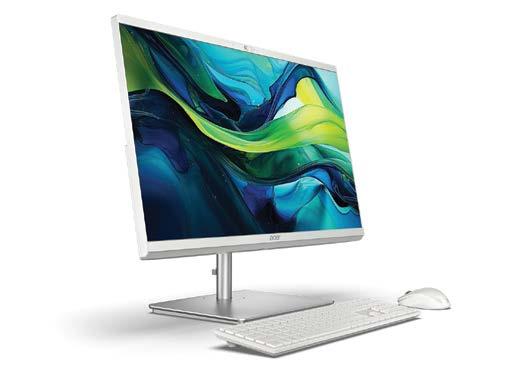



The Major V wireless on-ear headphones, the latest drop from music pioneer, Marshall, is making waves with its impeccable sound and nostalgic design. Major V features the classic Marshall look, and it is built to withstand everyday wear and tear, with the foldable design making it easy to pack away and carry. With over 100 hours of wireless playtime, you can be gone for days and never be left without a soundtrack. With wireless charging, it’s simple to give Major V a boost—just rest your headphones on a charging pad, and you’re good to go. Plus, the customized M-button allows you to enable in-app features like Spotify tap, EQ switching, and voice assistant. Major V also features Bluetooth LE Audio—this future-proof technology will deliver superior sound quality, while also opening a new world of audio sharing possibilities.
Field 7
The Sony ULT Field 7 speaker is designed for durability and delivering powerful sound on-the-go. Built to withstand the elements, the speaker is IP67 rated, making it water, dust, shock, and rust-proof. Compact yet mighty, the ULT Field 7 boasts Sony's signature audio technology for rich, bass-boosted sound. With a battery life of up to 30
hours and three hours of playing time with just ten minutes of charging, this speaker is perfect for long trips and extended gatherings. ULT Field 7 features a compact design and a multiway strap, making it easy to carry and attach to backpacks or bikes. This blend of portability and durability makes it an ideal choice for an active lifestyle.
TAMARA CLARKE, a former software development professional, is the tech and lifestyle enthusiast behind The Global Gazette, one of the most active blogs in the Middle East. The Global Gazette has been welcomed and lauded by some of the most influential tech brands in the region. Clarke’s goal is to inform about technology and how it supports our lifestyles. Talk to her on Twitter @TAMARACLARKE theglobalgazette.com
From better goods to better wardrobe bests, every issue, we choose a few items that make the approved executive selection list. In this edition, our picks are from COS, TAG Heuer, Christian Louboutin, and Carolina Herrera.

STAR POWER → COS Autumn Winter 2024
Academy Award-nominated actor and playwright Colman Domingo, singer Aidan Bissett, and actor Christopher Abbott are just a few of the many stars making an appearance in the COS Autumn Winter 2024 campaign, which sees the Londonbased fashion brand embrace its timeless aesthetic, characterized by innovative design, precise craftsmanship, and unexpected modern touches. The menswear collection features modern twists on traditional styles, including a contemporary wool herringbone coat designed for day-to-evening dressing. Experimental layering highlights innovative and well-proportioned fits, while relaxed, loose-fitting suiting and textured knitwear contrast with the sharp, clean lines of elegantly tailored shirts. Fluid trousers are worn with oversized leather jackets, while casual denim sets feature statement topstitching. Woven leather accessories, neckties, and winter scarves complete the COS menswear looks this season. cos.com

Billed as “the most expansive and romantic fragrance” of Carolina Herrera’s Confidential collection, Burning Rose is said to have been inspired by the floral compositions created by the eponymous designer herself during her stays at her family’s historic residence—Hacienda La Vega—in Caracas, Venezuela. Combining the timeless beauty of the Damascene rose with an alluring blend of spicy and mysterious notes, it sees pepper, ginger, cinnamon, patchouli, and myrrh intertwine to create a scent that embodies sophistication and intrigue. carolinaherrera.com
With the captivating names of Neon Sunset, Rose Paradise, Rouge Louboutin, and Crystal Show, Christian Louboutin has come out with four chic new shades of its iconic Loubibelle lip oil. But beyond the beauty of glowy, oiled lips that you can expect from them, there is a level of nourishing care that over time, visibly

moisturizes the lips. Swipe on for soft and lasting hydration, infused with a delicious floral fragrance with hints of pear and vanilla. Housed in a crystal-clear casing featuring a mermaid tail pattern, this precious oil can be applied generously any time, any place. christianlouboutin.com

TAG HEUER CONNECTED CALIBRE E4 45MM X ORACLE RED BULL RACING EDITION ↓

Having embarked on a partnership in 2016, TAG Heuer and Oracle Red Bull Racing have now come together again to create the TAG Heuer Connected Calibre E4 45MM x Oracle Red Bull Racing Edition. Made with a black diamond like carbon (DLC) coating grade-2 titanium 45-millimeter case and a bezel made of black ceramic with a 60-minute scale, this timepiece will appeal to those who appreciate both high-end racing aesthetics and functional design. Its ultra-light caseback features a photoplethysmography (PPG) sensor, and it is made from black DLC grade-2 titanium, making it the perfect connected watch off, and, most importantly, on the racetrack. The distinctive and exclusively made strap features a bi-material composition (a black rubber base with a blue leather inlay, accentuated by a red line), as well as and refined stitching with light grey and blue tone-on-tone for the harmony. While the blue leather sports a unique asphalt grip finish inspired by the racetrack, an additional black rubber strap is included for those who prefer a classic look. tagheuer.com

It’s easy to forget about the humble shirt. Somehow, it doesn’t hold quite the same gravitas as an impeccably tailored jacket, or a flamboyant silk tie. But while it might be the most innocuous garment in your wardrobe, a good shirt is also an unsung hero—versatile, hard-working, and essential.
From the boardroom to the ballroom, the right shirt can elevate your look or tone it down. And with countless options on the market, your choices are, quite literally, endless. Gone are the days when you could get away with a Don Draper-style white shirt every day. Now, there are crisp oxfords, playful prints, sleek linen, bold stripes, button-downs, and spread collars to consider. Whether you’re suiting up for a black-tie event, a casual Friday, or a summertime soirée, mastering the art of shirting is crucial. So, let’s dive into the fine art of shirting, and uncover the dos and don’ts of this wardrobe staple.
The first rule of shirting might surprise you: less is more, especially when it comes to ties and cufflinks. These accessories, though small, pack a serious sartorial punch, so use sparingly. Ties are a must for formal occasions, professional settings, and any event where you want to make a lasting impression. A crisp, well-knotted tie signifies respect, power, and a nod to tradition. Pair a silk tie with a spread-collar shirt under a well-tailored suit, and you’re playing in the big leagues. Business meetings, weddings, and high-profile dinners are prime occasions for ties.
Ditching the tie is a powerful statement in itself. If you’re aiming for easy breezy smartcasual, going sans tie is the way to go. A button-down shirt, maybe with a blazer and chinos, can give you a polished but approachable look. First dates, casual Fridays, or an art gallery opening? Leave the tie. Just be sure your shirt collar is structured enough to stand on its own. There is never an excuse for a limp collar. Cufflinks follow the same rule of
TIES ARE A MUST FOR FORMAL OCCASIONS, PROFESSIONAL SETTINGS, AND ANY EVENT WHERE YOU WANT TO MAKE A LASTING IMPRESSION. A CRISP, WELL-KNOTTED TIE SIGNIFIES RESPECT, POWER, AND A NOD TO TRADITION.
formality. They’re the epitome of elegance, so save them for when you’re in a double-cuff shirt, and resist the temptation to wear them to the office. Think black-tie events, weddings, and high-stakes meetings. In fact, we would go as far as to suggest wearing an unbuttoned cuff in the right situation to avoid that “middle management” look. But beware–cuffs should fit your wrists perfectly. Too long, and you risk looking like you’ve raided your dad’s wardrobe.
Now, onto fabric. This can drastically change the look and feel of your entire outfit, especially when paired with a suit. Whether flannel or worsted, wool suits call for shirts that provide a smooth contrast, such as cotton poplin or broadcloth. Lightweight with a fine weave, these give a sleek finish that complements the rich texture of wool in cooler months.
Pair linen with equally breezy fabrics like a linen or cotton-linen blend shirt. The relaxed, breathable nature of these fabrics complements the casual
cool of a linen suit, perfect for garden parties, beach weddings, or any occasion where you want to keep your cool–literally. Meanwhile, tweed’s heavy, textured nature pairs best with a more substantial shirt. Oxford cloth, with its rougher texture and thicker weave, is ideal.
The wing-tipped bib front dress shirt, designed for white-tie and black-tie events, is the big gun in your
shirting arsenal.
For white-tie events, your wing-tipped shirt should be paired with a white vest, white bow tie, and a tailcoat. This is the most formal dress code there is–think royal and public ceremonies, weddings and balls. Anything less would be considered, well, undressed. When it comes to black-tie, the same wing-tipped bib front shirt can be worn, but with a black bow tie and a tuxedo. Black-tie is slightly less formal, but it still demands sartorial rigor. The bib front adds a touch of detail that’s just enough to make you stand out, while still adhering to the dress code.
Much like trying to pull off white jeans, a short sleeve can be tricky. When done right, it can look effortlessly cool; when done wrong, it smacks of 90s boy band reunion.
As a general rule of thumb, short-sleeved shirts are best suited for casual, warmweather occasions. Think summer barbecues, a day out on the boat, or a casual dinner by the beach. Stick to light fabrics like linen or cotton, and keep the patterns minimal. Avoid wearing them in formal or professional settings, no matter how hot it is.
Instead of reaching for a short-sleeved shirt, roll up your sleeves. The most stylish way to do so is with the “master roll.” Unbutton the cuff, flip the cuff back and inside out, fold it over once (hiding the cuff behind the sleeve fabric), and leave it there. Remember, your elbows should only ever be on show if you’re going to be working. Avoid bunching your sleeves around your forearms as it gives a sloppy impression.
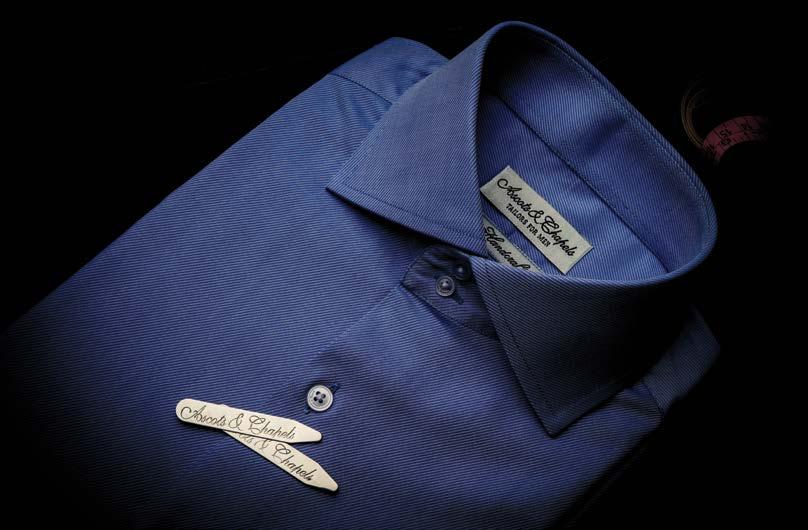
Once you’ve mastered the fundamentals of fit, you can start getting creative and play with patterns for an instant punch to your wardrobe. If you’re a confident chap and like to express your personality through your clothes, there’s no reason to hold back. Go for checks, stripes, or even florals if you’re feeling particularly bold. Just make sure to balance the rest of your outfit: if your shirt is loud, keep everything else subdued. Richer, muted tones in autumn and winter pair perfectly with dark business suits, whereas raised color palettes work better once the temperature rises.
That said, if you feel uncomfortable with a pattern, there is absolutely nothing wrong with opting for a solid color. Remember, the goal is to wear the shirt, not let the shirt wear you. And nothing sets off a dark suit and good tan as well as a crisp, highthread count, perfectly fit white shirt.
The humble shirt is anything but. It’s a cornerstone of your style and the foundation of a well-curated wardrobe. Whether you’re opting for a crisp, formal look with a tie and cufflinks, embracing the laid-back vibe of rolled-up sleeves, or making a bold statement with a patterned piece, mastering the nuances of shirting is key to elevating your style game.
So, the next time you’re getting dressed, give your shirt the attention it deserves. Wear what makes you feel like the best version of yourself, and the rest will fall into place–seamlessly.
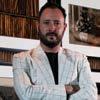
Gary Sweeney is the Brand and Style Director at Ascots & Chapels, a British luxury couturier that specializes in creating fine, personalized and bespoke garments for discerning gentlemen. ascotsandchapels.com
With Sease, Italian entrepreneur Franco Loro Piana wants to bridge the gap between luxury and performance in fashion
by DEVINA DIVECHA
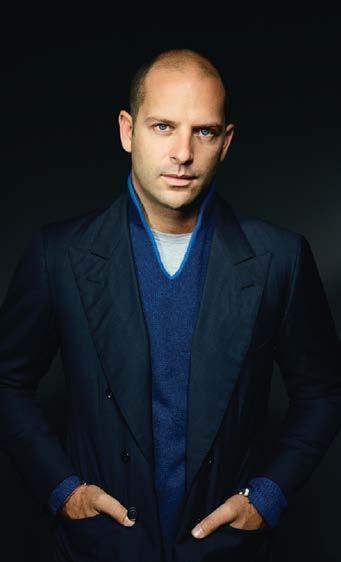
Given the legacy of his family name, Franco Loro Piana is no stranger to the world of high fashion—and that’s certainly an advantage for him in his current role as the co-founder and CEO of the luxury lifestyle brand, Sease.
}Loro Piana grew up surrounded by the finest materials and craftsmanship, thanks to his family’s business in the textile industry, which has been synonymous with quality and elegance since its establishment in 1924. “I was lucky enough to be born in an entrepreneurial family,” Loro Piana says. “We created a brand that was devoted to the highest quality, and we delivered the best product for very discerning clients. This is in my DNA; I was lucky to work in the company for more than 10 years
with my uncle and father and learn from them. I will be always thankful for the experience.”
}In 2013, the family business was sold to French luxury goods conglomerate LVMH for the sum of EUR2 billion. It was then that Loro Piana found himself at crossroads. “I felt like I had a blank canvas in front of me,” he recalls. “It’s not an easy question when you’re in your 30s, and you need to find your way.” But driven by a passion for creativity and design, Loro Piana set out to create something entirely new, and in partnership with his brother, Giacomo, he launched Sease in 2018. As Loro Piana puts it, the brand is a result of his desire to blend his love for the outdoors with his appreciation for quality and style. “I wanted to create a brand that represents my ideal lifestyle, my credo, and my values,” Loro Piana says. “I felt there was a gap in the market for a brand that spoke to the passion for the outdoors.”
}According to Loro Piana, Sease caters to the modern man who seeks adventure and sophistication in equal measure. “My clients are successful people who work a lot, but in the last 10 years, there has been a reframing and rebalancing of work/life, and how they spend their free time. This is the arena I wanted to play in.” Sease thus straddles both tradition and innovation, and it offers the best of style and quality along with high performance. “I saw an opportunity to bridge the gap between luxury and performance,” Loro Piana explains. “In the past, performance brands lacked style and sense of elegance, while luxury brands were focused on the style and the
quality, but not on performance. I wanted to bridge these two components and create a hybrid brand that blended elegance and craftsmanship with innovation, design, and performance.”
}The Sease product line is thus designed to be versatile, combining the functionality needed for outdoor activities, with the sophistication needed for city life. “I wanted to create a kit which gives you everything you need to live your passions to the fullest—and it ended up being a wardrobe,” Loro Piana says. He further reveals his lifelong passion for sailing and skiing as being the inspiration for Sease’s product line. Indeed, Franco describes the brand’s approach as “design for skiing meant for the city,” with pieces like a cashmere ski jacket that transitions seamlessly from the slopes to the streets, or a linen sailing jacket that’s perfect for Dubai’s urban environment. This versatility, naturally, comes with a price tag—but those who appreciate an avant-garde approach want what Sease offers.
}Expanding the brand globally has been a strategic move, and Sease’s entry into Dubai’s luxury market in May 2024 marks a significant milestone. While it’s still early days, Loro Piana is optimistic about the brand’s future in the Dubai and its surroundings. He believes that Dubai’s young, affluent population, who are well-educated and deeply connected to global trends, represents an ideal market for Sease. Loro Piana is
particularly excited about the brand’s flagship store in The Dubai Mall, with him describing it as a sign that the brand is “really heading to the Champion’s League.” The venture was made possible through a partnership with Khalifa Almarri, the Managing Director of Almarri Investments, which has interests in sectors like real estate, retail, and food and beverage. The partnership came about after one fortuitous day when Almarri walked into Sease’s Milan store, and then fell in love with the brand and its values. One year after this meeting, the doors to the Sease store in The Dubai Mall opened.
}“Dubai is extremely important for the growth of the brand,” Loro Piana adds. “We feel really blessed about this opportunity, because it’s an incredible matching of two young entrepreneurs who have the same values to develop something special.” Loro Piana points out here that while the brand has been focused on a resort-driven retail strategy, it is starting to change tracks in this regard. “Once we opened in Milan as a flagship store, we opened at St. Moritz, and then we went to Gstaad and Courchevel. Now, we have Dubai and Geneva. We also opened in Forte dei Marmi, a seaside town in Tuscany, and maybe St. Tropez will be on the cards soon. This is a consolidation of our position of Europe.” And as Sease continues to grow, Loro Piana envisions further expansion into key markets such as Saudi Arabia, Abu Dhabi, the United States, and eventu-

ally Asia. That said, he is emphatic about maintaining the brand’s core values as it scales.
Franco Loro Piana shares his notes for entrepreneurs in the luxury and fashion space
}Understand your value proposition
“You have to be pragmatic and rational in understanding what is your ‘why.’ This market is very saturated, and the barrier to entry is high. If you think about fashion as glamourous or easy, it’s very misleading.”
}Get your business basics
right “My advice is to have a light business model, and prioritize what is important. For example, you can design, and you can have someone else work on the production, and you can outsource marketing.”
}Be in tune with the market “It’s difficult to succeed at the moment, because you have to get many elements right, which include the product, the marketing, and the communication. All of these are evolving faster than before.”
}Reflecting on his entrepreneurial journey with Sease, Loro Piana acknowledges the challenges he has faced, but he also admits he finds great satisfaction in the autonomy he enjoys. “Here, it’s my project. If I do well, it’s because of me; if I do wrong, it’s because of me,” he says. That said, he owns up to the fact that his arrow didn’t quite hit the mark from the start. “I was very inexperienced on how many aspects you need to control to make a statement clear, a brand successful, a product sellable,” he shares. At the beginning, the designs were more rigid, he says, but then the merchandising strategy was tweaked, and now, he believes that Sease has an identity of its own that’s synonymous with quality. “My biggest challenge at the beginning was to create a product that would be a loyal companion during your adventures, when you’re really having fun, doing what you like when you are free,” Loro Piana says. “And once you have a garment that’s with you in those moments, it sparks an emotional connection. So, my hope is that Sease’s garments last in your wardrobe, even if they’re not used, because they will remind you of the good times.”
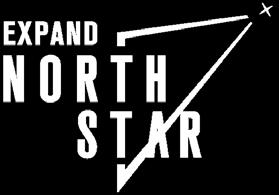




Outside of backing businesses with innovative models, and large market opportunities, venture capitalists (VCs) look to invest in great founders. The single, most critical variable in the investment decision is the quality and strength of the founders—especially for early-stage startups, where the field for funding is often crowded.
So, what makes a great founder in our markets, i.e. MENA, Pakistan, and Turkey (MENAPT)? In my role at Nuwa Capital as a venture capitalist focused on the region, I’ve had a front-row seat to observe the profiles and key characteristics of some of the most successful founders in our regions. While there is no single formula for founder greatness, certain patterns have
emerged from our firm’s analysis.
At Nuwa Capital, we analyzed the top 100 companies in the MENAPT markets over the past decade, focusing on those with the largest exits, or those with the most significant amounts of capital raised. While these metrics aren’t perfect stand-ins for success, they offer a valuable proxy for understanding the potential trajectory of success, especially given the relatively small sample size of exits in these markets.
We then examined the profiles of the founders in each of those 100 companies, identifying key attributes from publicly available data including their education, years of prior work experience before setting up the startup, industry from past work experience, previous workplaces, and previous startup experience.
The back stories of founders often reveal a lot of those individuals and their capacity to succeed.
One of the most represented—yet unsurprising—commonalities among the founders in our sample is prior entrepreneurial experience—a full 72% of them had prior startup experience, or had previously founded a company.
Talent with a track record of launching or scaling new ventures also tend to have a clearer understanding of the arduous journey ahead.
Educational pedigree, while not critical, also appears to play a role in founder success, with 59% of the standouts in our sample hailing from the top 250 globally recognized universities. Institutions like the American University of

Cairo, King Fahd University of Petroleum and Minerals, Columbia University, Stanford University, and INSEAD accounted for nearly 20% of the sample.
In addition to a high percentage of prior startup experience, our analysis also found that most successful entrepreneurs in the region tend to be seasoned professionals. Roughly 75% of the founders in our sample had over five years of work experience at the time of launching their companies, with 45% having 10 years or more under their belt. They thus perhaps have more skin in the game, and this transpires through their approach to everything from problemsolving, to managing teams, etc.
Founders with professional backgrounds also tend to have more developed leadership and management skills, which become increasingly crucial as startups move from seed to exit. They understand how to motivate and align teams, navigate organizational challenges, and make tough decisions. The most common previous workplaces, accounting for roughly 7% of all founders in the sample, were Careem and McKinsey. The most common industries in prior work experience, accounting for roughly 62%, were technology (either prior startups, or large corporations such as Meta, Google, Microsoft, etc.) and finance, specifically corporate finance, investment banking, etc. These attributes offer a snapshot of what has historically contributed to founder success in our regions. However, they are far from predictive guarantees. For example, attending
ONE OF THE MOST REPRESENTED—YET UNSURPRISING—COMMONALITIES AMONG THE FOUNDERS IN OUR SAMPLE IS PRIOR ENTREPRENEURIAL EXPERIENCE—A FULL 72% OF THEM HAD PRIOR STARTUP EXPERIENCE, OR HAD PREVIOUSLY FOUNDED A COMPANY.”
a top-tier university may not inherently make a founder more successful, but it often provides access to global networks and resources that can be invaluable during a startup’s growth phase.
Beyond these objective metrics, the most successful founders in our regions also exhibit a set of intangible but crucial qualities. These include:
Chief among these qualitative qualities is a rare clarity of vision—the ability to deeply understand a problem space, and articulate exactly how their proposed solution will effectively address it. Take Hosam Arab at Tabby, for example. He demonstrated

an acute understanding of the market, and he was also able to convey a compelling vision that resonated with stake-
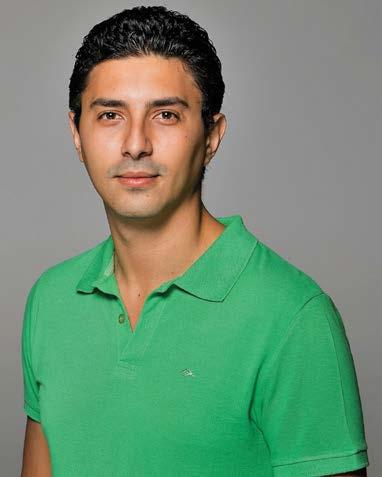
holders. It’s not just about having a solution; it’s about understanding the problem so deeply that the solution
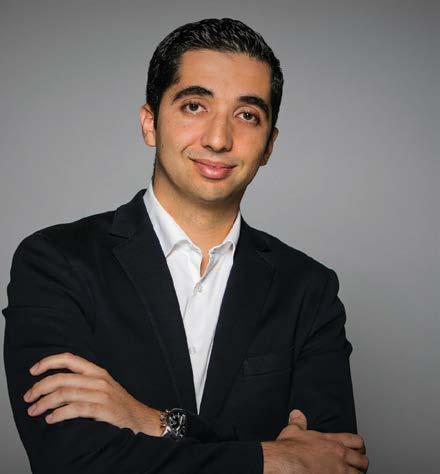
feels almost inevitable. Very often, we see founders with great products, but with unclear problems. This signals a lack of understanding of the underlying market/ problems and/or internal ability to drive towards a goal.
TEAMS The most successful startups often have multiple founders, ideally with complementary skills (e.g., a technical founder paired with a commercial one). Anass Boumediene and Mehdi Oudghiri from Eyewa exemplify this synergy. However, it’s worth noting that multiple founders can also increase the risk of internal conflict, which is one of the most common reasons for startup failure.
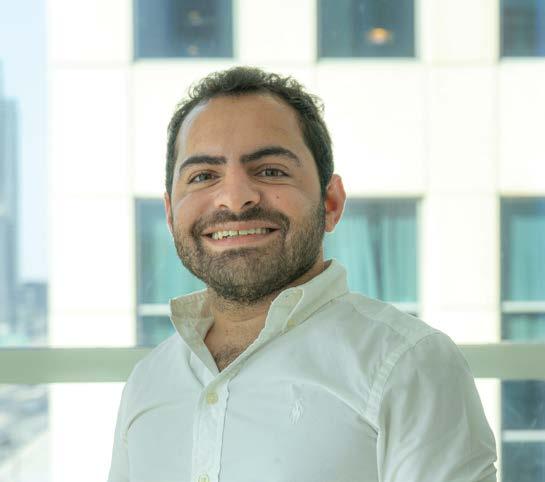
3/ CONFIDENCE Founders need near-maniacal confidence in their ability to deliver on their vision. Jad Antoun at Huspy exemplifies this trait. Founders often face detractors, whether they be clients, investors, or even team members. The ability to stay the course—despite external noise—is a critical piece of the puzzle.
4/ THE ABILITY TO PIVOT
The best founders walk a fine line between confidence and delusional thinking. They are able to
synthesize new information and make objective decisions, even if it means pivoting or changing course. Mostafa Kandil at Swvl is a prime example of a founder who successfully navigated this balance. Founders who refuse to adapt to market signals often falter.
5/ HUMILITY While there are exceptions, successful founders often possess a deep sense of humility and self-awareness. Samih Toukan, Hussam Khouri, and Ronaldo Mouchawar
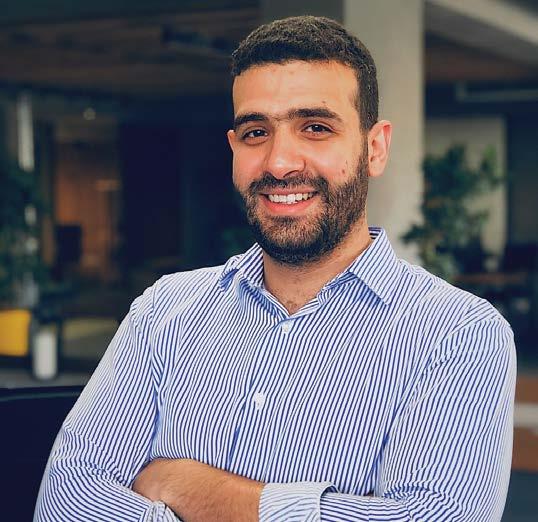
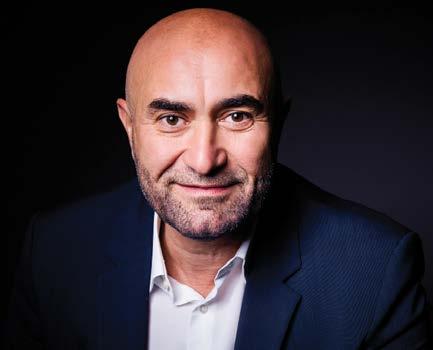
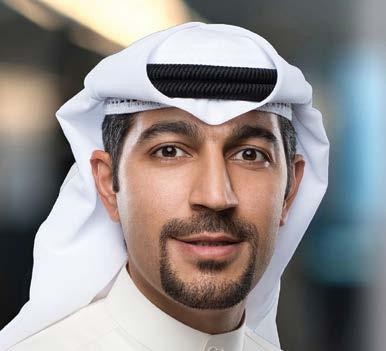
from Maktoob.com and Souq.com are excellent examples. Hubris can be a founder’s downfall; those who maintain humility and grace in both victory and defeat tend to have a longer-lasting impact.
6/ TENACITY AND GRIT
Building a company is far from glamorous. It’s a painful and arduous process that requires immense tenacity. Abdulaziz Al Loughani from Floward and Talabat embodies the grit necessary to navigate the challenges of entrepreneurship. The ability to persevere through setbacks and challenges is what often separates the successful founders from the rest.
In the end, the profile of a great founder in the MENAPT region is from both the measurable and the intangible, the seen and the unseen. As investors, we search for these qualities, knowing that no single trait guarantees success, but that together, they form the foundation upon which the future is built. The true measure of a founder’s greatness thus lies not just in their ability to build a company, but in their capacity to shape the world around them.
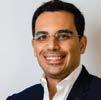
Khaled Talhouni is the Managing Partner of Nuwa Capital, a radical investment platform reshaping the relationship between founders and capital. nuwacapital.io



In today’s business landscape, companies are increasingly urged to adopt responsible practices that consider their environmental and social impact. From supply chain management to employee engagement, and from reducing greenhouse gas emissions to promoting diversity and inclusion, stakeholders demand genuine commitments. Yet, the question many businesses struggle with is: how? The journey to sustainability can seem overwhelming, and shortcuts may tempt those seeking quick results.
At MENA Impact, we chose a different path by becoming a certified B Corp, anchoring our commitment to impact in the region, and embracing a journey of continuous improvement. We believe that MENA businesses should consider the B Corp standards as a guiding framework in their journey in the environmental, social, and governance (ESG) domain—a pathway to becoming better companies. Certified B Corps, or B Corporations, are businesses that meet high standards of environmental and social impact, accountability, and transparency, balancing purpose with profit. This global community of businesses is leading the transformation of the global economic system. B Lab, the network of organizations behind the B Corp certification, was founded almost 20 years ago with the strong belief that business can be a force for good. They are on a mission to transform the global economy to benefit
all people, communities, and the planet.
As the CEO of a UAE-based company recently certified as a B Corp, I have believed in B Lab’s mission from the very beginning. My goal was to build a venture that aligns with my core values as a founder, integrating impact into our business model and making it part of our DNA. Embracing the B Corp standards can truly transform your business for the better, and here are four reasons why:
1/Get a baseline of your ESG practices Businesses often want to jump into action without first measuring where they stand. But measuring is the very first, and most fundamental step of your ESG journey. I know this firsthand, as companies in the region often request initiatives that are unrelated to their business or areas where they could make a true impact, all without understanding their current impact. B Corp standards offer practical tools, like the B Impact Assessment—a customized questionnaire that covers five impact areas: governance, environment, workers, community, and customers. Measuring your impact is the first step toward meaningful action.
2/ Define your purpose The path to B Corp certification challenges you to think about your company’s purpose from a different perspective. While businesses often define their purpose, mission, and vision, these don’t always account for the environmental and social impact they want to achieve. Ask yourself: is the world better with my business in it? It’s not an easy question, but it forces business leaders to reflect deeply. I recall a conversation on my Impact Talk podcast with the CEO of a French luxury brand, who became B Corp certified after questioning their purpose during the COVID-19 pandemic. This introspection was the beginning of their transformative journey.
3/ Develop an impact-driven business model All businesses are on a journey of continuous improvement—no one
has it all figured out. Embracing this mindset means constantly seeking ways to become a better company, and the B Corp assessment offers an opportunity to benchmark your practices against the best. At MENA Impact, this process helped us define a business model with impact at its core. For instance, we are committed to the eighth of the United Nations’ Sustainable Development Goals (SDGs) that’s centered on “Decent Work and Economic Growth,” and we are particularly targeting youth unemployment in the MENA region. We implemented a remote working policy that allows us to hire talented youth from the region, and we also partnered with a social enterprise to provide job opportunities to youth in Palestine and Jordan. Impact is not philanthropy; it’s an integral part of our business model and practices.
4/ Join a community Being part of a global community of businesses committed to transforming the economy into an equitable, fair, and regenerative system is incredibly fulfilling. Surrounding yourself with like-minded individuals on this journey, who support and challenge each other to become better, is essential. This is not a path to be walked alone; it goes against the very principles of sustainable development. Tapping into this international network of over 9,000 relentless companies, all striving to balance purpose with profit, is a game changer.
In the MENA region, the B Corp movement is in its infancy, with 25 B Corps, 12 of which are in the UAE—four years ago, there was only one B Corp in the region! The movement is growing, and at MENA Impact, we proudly serve as B Corp ambassadors, encouraging businesses to adopt B Corp standards and tools, whether or not they pursue certification.
The state of the SDGs in MENA is concerning, with only 3% of the goals achieved, according to the 2023/2024 Arab Region SDG Index & Dashboard Report. Unique challenges, such as resource scarcity, climate change, and access to employment, require urgent action. Business has immense power to address these challenges, just as we’ve seen the influence of global giants like GAFAM. Business leaders can use this power as a force for good.
B Corp stands for companies that are not just the best in the world, but the best for the world. Embracing the B Corp standards is not just about certification—it’s about joining a movement that has the potential to transform your business and the region. It’s about leading by example, driving positive impact, and showing that business can indeed be a force for good.

Nadine Zidani is a sustainability expert, impact entrepreneur, and the founder and CEO of MENA Impact. She lives in the UAE, and she is dedicated to supporting the achievement of the United Nations Sustainable Development Goals (SDGs), and driving systemic change in the MENA region through her work and public speaking. menaimpact.ae
GITEX Global 2024, running from October 14-18, 2024, at Dubai World Trade Centre, is set to feature a stellar lineup of speakers
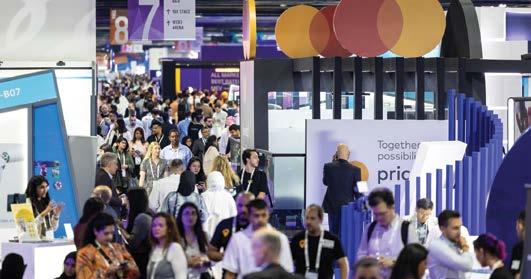
The 44th edition of the annual Dubai-based tech and startup event GITEX Global, which will be held at Dubai World Trade Centre on October 14-18, 2024, is set to feature a stellar line-up of speakers and host delegates from 180 countries.
Aligned with Dubai's ambition to be the home of 30 startup unicorns by 2030, GITEX Global 2024 will see it launch GITEX Editions, a program for accelerating scaling and global governance for high-growth companies.
The early confirmed speaker line-up includes eight fast-growing startups from eight countries, three of which three are backed by the European Innovation Council (EIC), a EUR10 billion program of the European Union (EU) to identify, support, and scale up breakthrough technologies and deeptech startups.
These speakers include Fabrizio del Maffeo, co-founder, CEO, and Board Member at Axelera AI, a startup from The Netherlands that is valued at US$500 million; Dr. Alexander Zhavoronkov, founder and CEO at InSilico Medicine, a Hong Kong-based biotech company that is currently valued at $1.5 billion; and Dr. Mazen Rizk, founder and CEO at Infinite Roots, which is the EU's largest mycelium-biotech investment.
The event will also feature Dr. Joseph Fitzsimons, founder and CEO at Singapore's biggest quantum startup Horizon Quantum Computing; Dr. Sunghyun Park, founder and CEO at Rebellions, a company that is expected to become Korea's first artificial intelligence (AI) semiconductor chip unicorn with a $1.5 billion value; and Svilen Rangelov, co-founder and CEO at Dronamics, a UK-based cargo drone airline that is on a mission to change e-commerce worldwide.
Plus, the audience will also hear from Emilio Scervo, Chief Technology Officer and Board Member at Buggati - Rimac, the first and fastestgrowing Croatian unicorn, and Philippe Notton, founder and CEO at SiPearl, a France-based high performance semiconductor manufacturer for artificial intelligence interfaces and supercomputing.
One of the key topics at this year's event will be cybersecurity, and it will be discussed by Chenxi Wang, Managing General Partner of Fortune 500 fund US-based Rain Capital, and Ekaterina Serban, Vice President of Privacy and Information Security at German automotive and services supplier Bosch.
Also debuting on the GITEX Global stage will be Michael Spranger, President of Sony AI Inc, and Chris Duffey, futurist and Head of GenStudio, Adobe, who co-authored the world's first book on AI with AI, and Isabell Gradert, Vice President Central Research and Technology for Airbus in Germany. gitex.com

Everyone’s talking, but nobody’s listening. However, your job as a thought leader is to make them listen—so, how do you do that?
As a starting point, accept that there are too many voices out there, and the world is getting crazier, noisier, and busier by the second. So, amidst the dings, pings, and rings, when it’s challenging to catch your breath, it is more demanding to grab a reader’s attention.
And who is this reader? This reader has limited rather than non-existent patience, and they are borderline caught between doom-scrolling and phubbing. The reader scrolls through both mindlessly and mindfully, and they happen to chance upon your LinkedIn post, while waiting for a cup
IRRESPECTIVE OF WHAT ASPECT OF YOUR JOURNEY YOU SHARE, DO THAT HONESTLY. BE OPEN ABOUT THE NUMBER OF COFFEE CUPS YOU CONSUME, THE MOMENTS YOU FEEL LIKE GIVING IT ALL UP, OR THE SMILES AND TEARS THAT COME WITH THE WINS AND LOSSES.
of coffee to brew, a cab to arrive, or a meeting to start.
Unfortunately, most of these readers intend not to read, but to snack on some information, wisdom, suggestions, and humor in their already highly consuming days. Now that they have accidentally found you, you need to instantly convince them to stay with you for a few seconds (minutes, if you are lucky!), and absorb in your nuggets. Shall we give it a try?
Here’s a handy list of things to keep
in mind the next time you write a post for a social media platform, prepare to deliver a speech, share your thoughts as an entrepreneur for a research paper or a magazine, or talk to your team members, colleagues, and fellow leaders.
1/ Go down the rabbit hole It’s tempting, convenient, reliable, and costs us nothing. Of course, it’s easy to fall into the trap of relying on artificial intelligence (AI) tools like ChatGPT to pen your thoughts. Who wouldn’t want
to save time, effort, and money? But let’s be clear here—whatever ChatGPT gives you won’t be original, and that is not how you want to be perceived. Original is better than copy, correct? Also, machines will never be able to express emotions like we do. A well-written piece needs a good vocabulary, and good grammar can go a long way, so if you need an assistant to do that, you may use AI as a crutch, but it can’t teach you how to walk—crawl, maybe.
2/ Tell a short story Readers have zero patience for a novel or even a novella, so stick to a short story. Why? Because facts go to our brains, while stories go to our hearts. We all grew up listening to bedtime stories; millennials may have heard it from parents and grandparents, and Generation Alpha may have YouTube or Spotify as sources; the bottom line is that the stories of your university days have better recall value versus the education you got during your Master’s in Business Development. Once you tell them a good one, they’ll come back for the sequel, and that’s when you can tell them a longer story.
3/ Be honest You were told so in value education classes, and you use words like honest, trust, and transparency like confetti when talking to juniors, clients, and more. Therefore, go back to the basics, and practice what you preach. Honest words can bring change (and business), engage minds, initiate conversations, attract good talent, and more. Irrespective of what aspect of your journey you share, do that honestly. Be open about the number of coffee cups you consume, the moments you feel like giving it all up, or the smiles and tears that come with the wins and losses.
4/ Don’t sugarcoat things Talk about your successes, the little joys of securing a trade license, the reduced office rentals, and more, but most importantly, talk about your failures—the laptop crashes, the loss of a big deal, the oversight of reading the fine print, and more. We all fail, and

it is always a good reminder when others share their failure; one feels less lonely and gets a boost to keep going.
5/ Avoid comparisons Never compare your path with that of another, uphill or downhill; each one of us is on a different journey. So, for instance, don’t advise a 20-year-old not to be upset if they have been made redundant by saying that they have a lifetime to grow—instead, put yourself in their shoes for a moment, and recall how, at that moment, it can feel like the end of a world. Similarly, don’t advise struggling businesses to look for the silver lining—let them know that you understand the challenge; so, do your homework, and offer a plan.
6/ It’s not reality television The internet loves sob stories—but remember that you are not on a reality show to gain votes, but on a platform to showcase your struggles, skills, turbulences, and triumphs. As such, you should be guided by how close you can bring your audience to your reality, making it easier for them to relate to and trust you. At the same time, know where to draw the line, be real, and don’t let the “reel” worthiness guide you.
7/ Pat yourself on the back The “I” is essential, but the “We” defines growth. Stay focused on how your team is your strength, but don’t
undersell what you bring to the table. Speak of what leadership means to you, and how you practice it or don’t.
8/ Step off the podium End your piece by letting the readers know you’re open to feedback, and asking them what more they want to hear. Tell them that their opinion is valuable to you. Interact with them. Even Netflix asks you to rate the show after you’re done watching!
9/ Don’t pity yourself You are not alone in struggling to get your voice noted. There’s a reason the dictionary now has a word for the “everybody is listening, but nobody is listening” syndrome— look it up; it is called anecdoche. And that should be your reminder to listen/read attentively when others talk/write. Learn from your counterparts.
10/ Start now. Write your first post now.Don’t pressure yourself to deliver a masterpiece as your debut. There is nothing better than being on the start line.

Purva Grover is a Dubai-based author, journalist, and creative entrepreneur. She believes in the power of storytelling and is convinced stories aren’t going anywhere. You can meet her at purvagrover.com or stalk her on Instagram @purvagr.
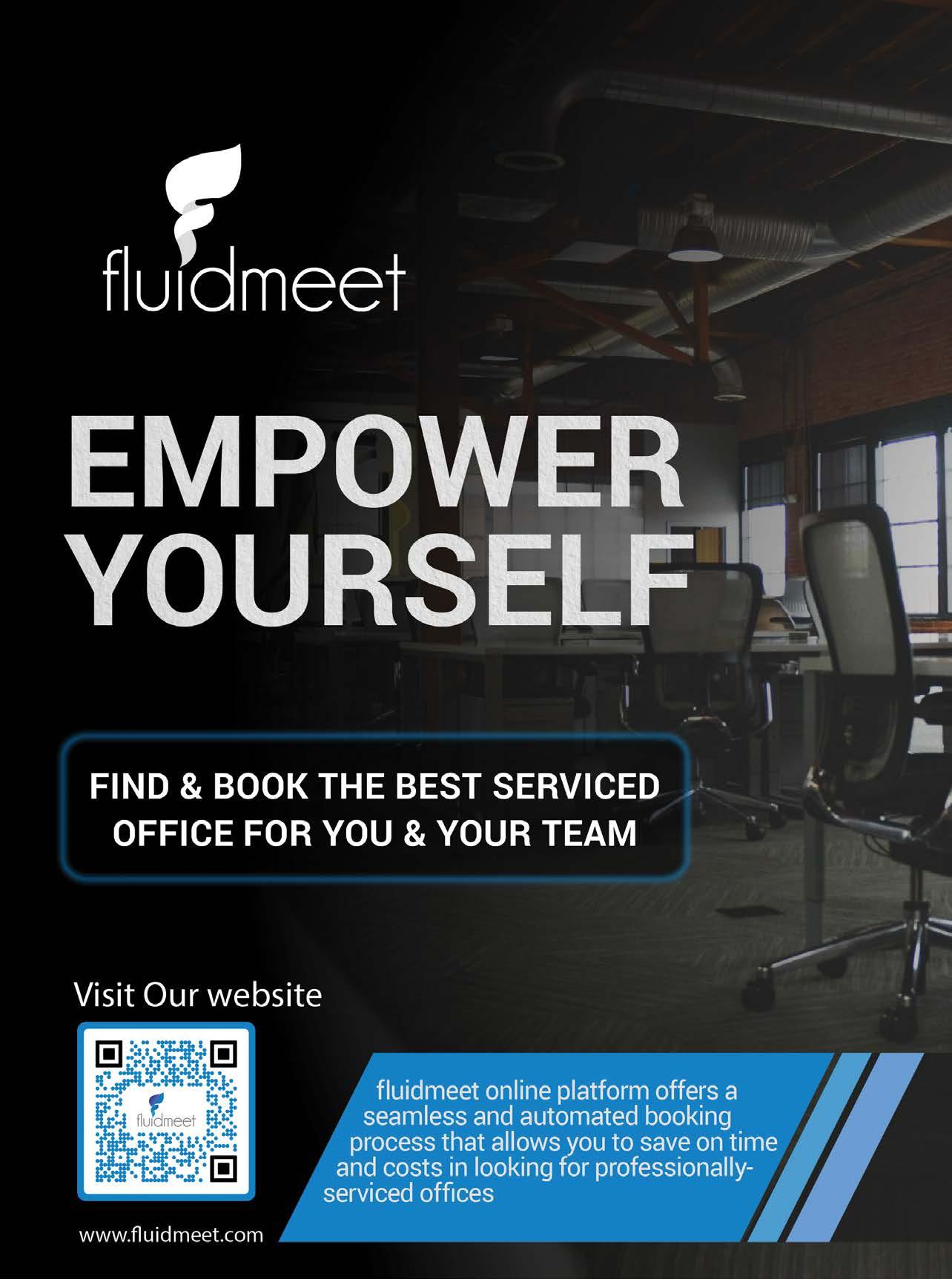
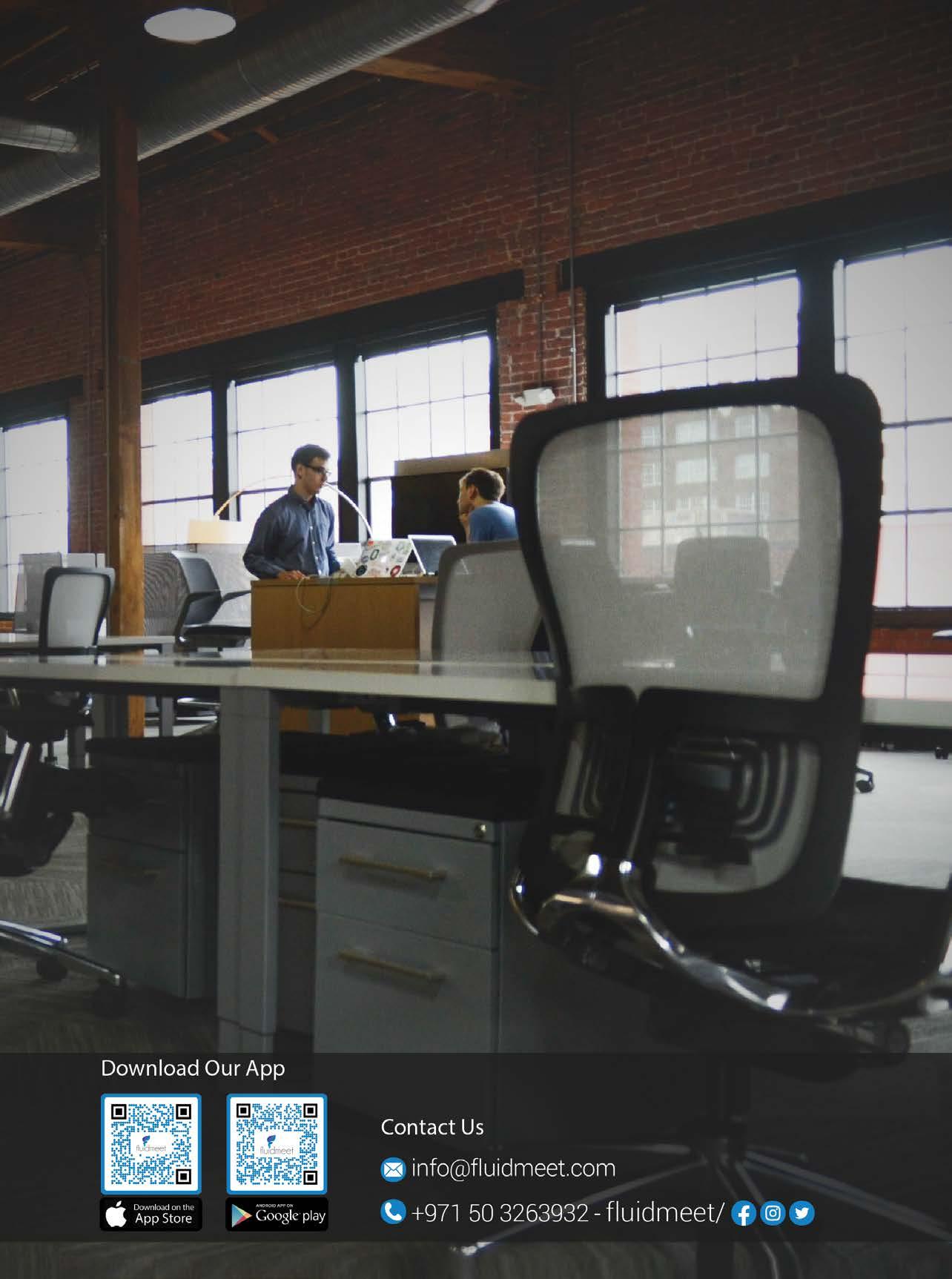



Holo co-founders Michael Hunter and Arran Summerhill believe their startup—the Middle East’s first digital mortgage platform—can transform the process of buying a home in the UAE (and beyond) by AALIA MEHREEN AHMED
When Michael Hunter and Arran Summerhill were inspired to create Holo, a UAE-based digital mortgage platform, it came in the aftermath of them having witnessed firsthand the many bottlenecks within the mortgage industry. “I knew something needed to change,” Hunter recalls. “After more than a decade in the regional banking and mortgage industry, I experienced firsthand
}What Hunter and Summerhill thus proceeded to create became a pioneering effort in its own right- Holo launched in 2020 in the Middle East as the first-of-its-kind digital mortgage platform in the region. And with free access to over 500 mortgage products from all the banks in the UAE today, the platform directly addresses pressing issues that the home buying process is ridden with till date—top of the list being some of the
more obvious concerns such as lengthy waiting times and tedious paperwork. “The first step in the Holo journey is giving buyers immediate access to live mortgage products tailored to their eligibility, providing a comprehensive cost breakdown within minutes,” Hunter—the CEO of Holo—explains. “This eliminates the traditional process of visiting multiple banks, and waiting weeks for information. Next, we offer a fully digital
the complexities and inefficiencies of the traditional home-buying process. These ranged from a lack of transparency and prolonged timelines to, well, an overall fragmented ecosystem. Driven to make a difference, we envisioned a platform that leverages technology to streamline the entire process, offering a superior customer experience. This vision became the foundation for Holo, aimed at simplifying and transforming the mortgage journey for UAE homebuyers.”
onboarding experience, allowing buyers to upload and verify documents directly on our platform, making the entire application process seamless and paperless. All of our buyers are assigned a case manager through the platform to answer any questions, and provide ongoing support. Once a property is selected, buyers can track and manage their mortgage at their convenience, until the purchase is complete.”

}Hunter also points out that Holo’s services extend beyond the mortgaging journey to helping clients choose their dream homes too. “We recognize that finding a home can be a challenge to home buyers, so we partner with agencies through an internal platform to match buyers with properties,” he explains. “This approach has helped Holo clients find their perfect home up to three weeks faster than conventional methods. By acting solely as the buyer’s representative, we eliminate conflicts of interest—a structure we believe will become more common in future transactions.” Now, consider the implications of Holo’s model in a global setting where, as per US-based credit rating agency Fitch Rating’s Global Housing and Mortgage Outlook
← The Holo team comprises experts who act as the home buyers’ main point of contact, and reach out to the banks, and carry out all the legwork. Once an ideal mortgage deal has been finalized, the Holo team gets paid by the bank, with a promise of no hidden fees involved.
2024, high mortgage rates will “continue to impact demand and discourage home sales, especially where many homeowners still benefit from low fixed-rates.” However, the situation is not necessarily as bleak in the UAE, with multiple reports in 2024 having predicted lower UAE mortgage rates during the remainder of the year which will ultimately result in more property sales.
}But the appeal of Holo’s services still remains, as the platform’s ultimate goal is to help clients find the most affordable mortgage deal, regardless of the market’s fluctuations. “Our ethos is that using our platform should not cost more than navigating the process yourself!” Hunter declares. “We have arrangements with our lenders, who compensate us for managing the process, ensuring there’s no additional cost to the buyer. In fact, we often secure better products across the market than buyers could find on their own. Our goal is thus to become the leading property platform for homebuyers in the MENAT region. We will continue to advance our operations in the UAE while expanding regionally. We are passionate about the MENAT region, and we believe we can make a significant impact here. This focus allows us to better serve the local market, compared to the highly competitive environments in Europe or the UK.”
}But all this isn’t to say that the market Holo currently operates in doesn’t present its own share of competitive-
ness. With the Middle East real estate market expected to record a compound annual growth rate (CAGR) of 6.1% from 2023 to 2030, as per a July 2024 whitepaper released by UAE-based investment platform Investopia, the region has
platform in the Middle East, offering a fully digital process from start to finish, while building strong customer loyalty and brand recognition. In contrast, many of our competitors operate on an aggregation model, where they facilitate
built using his and Hunter’s combined 15-year-long experience in traditional mortgage broker firms in the UK and the UAE. But along the way, the co-founders also ensured that they enrolled themselves in locally tailored programs that would help
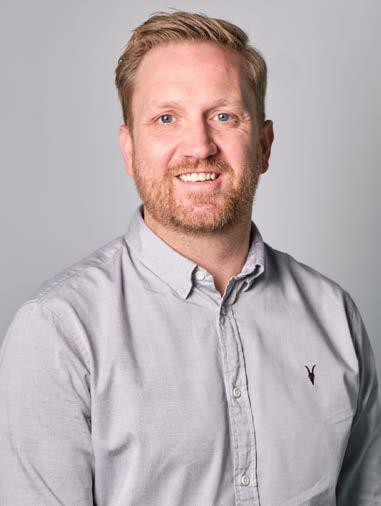
seen the birth of a number of proptech companies lately. But according to Summerhill, who’s the COO of Holo, the very foundation of his enterprise’s offerings edge out any potential competitors on the horizon. “The UAE has other digital home finance platforms, but their business models differ significantly from ours at Holo,” Summerhill states. “We pride ourselves on being the largest direct-to-consumer
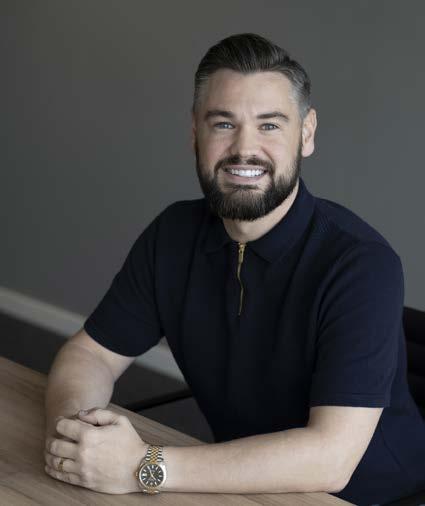
submissions to banks from other companies, and do not directly manage client relationships. Our focus for expansion is primarily the MENAT region, where there are currently few true competitors at this time. This strategic focus allows us to make a significant impact in our chosen markets.”
}Summerhill’s confidence stems, first and foremost, from the fact that Holo was
them further finetune their services. “We have participated in several prominent accelerator programs, including Wamda X in 2020 and the Fintech Saudi accelerator in 2022,” Summerhill says. “These experiences have offered us valuable insights into the venture capital and tech landscapes, revealing significant opportunities for regional expansion. Drawing on our expertise from the
UK and UAE, we are now preparing to launch the first specialized digital mortgage platform in Saudi Arabia, aiming to establish ourselves as a leading player in the market.” Indeed, this proposed move into Saudi Arabia has been another direct result of the optimism Summerhill and Hunter have shown in their venture. “We believe that Holo is ready to extend its seamless services to the Kingdom’s home-buying industry with our innovative digital mortgage solutions,” Hunter adds. “This expansion aligns perfectly with Saudi Arabia’s Vision 2030, which aims to diversify the economy and enhance the financial sector.”
}Holo’s endeavors in the regional mortgage financing industry have been further strengthened with the investments it has received. In February 2023, the startup announced the completion of an undisclosed seven-figure seed round. “We initially planned to transition from our seed funding round in 2023 directly to a Series A round in late 2024,” Summerhill reveals. “At the time of our seed raise, we had set a revenue target to achieve before Series A. We surpassed this target in the fourth quarter of 2023, prompting us to reassess the fundraising climate. Over the past 18 months, we observed a shift towards profitability, and a move away from the burn-at-all-costs mentality. Consequently, we decided to double our revenue target for the Series A round. In response, we approached our current investors with an opportunity to participate in a Pre-Series A round, aimed at reaching our newly set target. We successfully secured additional investments from our previous investors, Orxy Fund and Dubai Future District Fund, who increased their contributions, and welcomed a new investor, Aditum. This pre-Series A round was oversubscribed, providing us with additional firepower to fuel and accelerate our expansion into the Saudi market, and explore other opportunities within the MENAT region.”
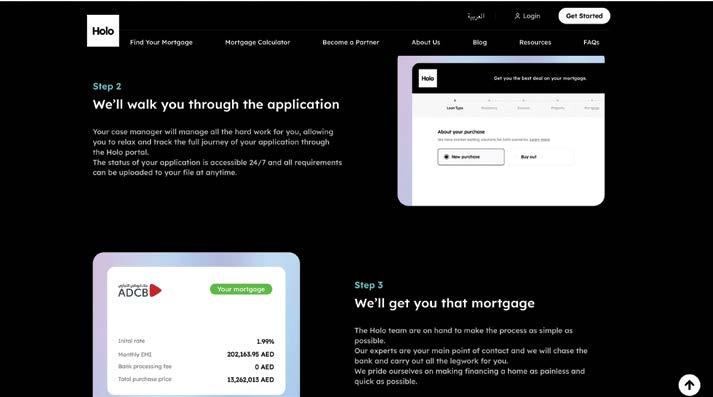
}Driving Holo’s mission forward is also a commitment to stay atop digital trends that define the mortgage financing industry. For example, two persisting challenges in the sector that multiple studies have highlighted are that of high labor costs and unsatisfactory customer experiences—both of which Holo has addressed through its operational model. “From day one, Holo has been a technology-first company, focusing on building products to minimize the need for extensive staff, while enhancing the customer journey simultaneously,” Summerhill notes. “We launched as the first digital mortgage platform in 2020, even before the COVID-19 pandemic, and we have since led the industry with our comprehensive end-to-end tracking solution. Holo allows their customers to monitor their mortgage journey from initial submission through approval to the completion of their purchase, ensuring transparency throughout the process from day one. We also provide white-label solutions of our mortgage journey to hundreds of real estate agencies, property developers, and financial advisory firms, helping them improve their customer experiences and contribute positively to the property ecosystem. Recently, we have been exploring use cases scenarios for
artificial intelligence (AI) and machine learning (ML). Instead of focusing on less impactful technologies like chatbots, we have concentrated on streamlining application processing. The AI-driven tools we built reduce application touchpoints and significantly decrease processing times, benefiting all stakeholders involved.”
}Charged with this future-forward mindset, Summerhill and Hunter are now looking forward to what promises to be a fruitful journey ahead. “We have significant plans for the remainder of 2024 and beyond, the most important being expanding our footprint across the GCC, particularly in Saudi Arabia,” Hunter says. “In addition, Holo is also refining its technology to further simplify the user journey and provide a real-time snapshot of all available mortgage offers. As we approach the close of our upcoming Series A funding round, we are also preparing to announce ambitious expansion plans across the Middle East, positioning ourselves as a leader in the digital mortgage industry. Stakeholders can anticipate more exciting developments, including potential market entries in other GCC countries, further solidifying Holo’s presence as a major player in the region’s proptech landscape.”

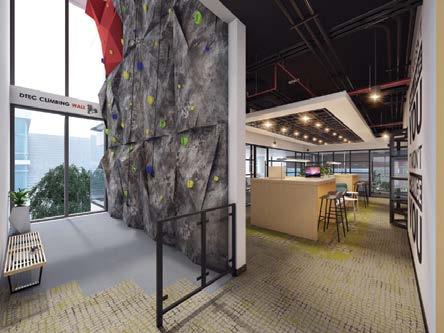
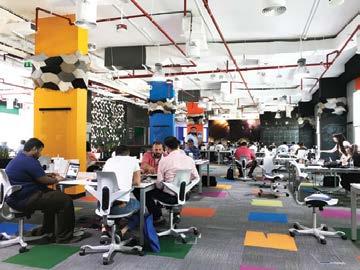
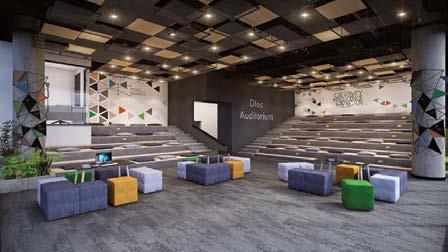
A roundup of the up-and-coming startups in the Dubai-based Mohammed Bin Rashid Innovation Fund (MBRIF) accelerator program that you should be keeping an eye on
by AALIA MEHREEN AHMED
/aqlama.ai /
With the increased assimilation of artificial intelligence (AI) into the world of business, many commercial businesses have begun to rely on tools such as virtual assistants, chatbots, and automatic speech recognition (ASR) platforms. All of these fall within the category of conversational AI—a subset of AI in which large amounts of data, such as text and speech, are processed by a given system/machine to generate language that is easily understood by the layman customer. But consider the implications of such data sets when they come from not just different industries, but also different regions and nations—as it stands, AI, in and of itself, isn’t built to accurately decipher such differences in jargon and dialects. And it is to tackle this glaring loophole that Aqlama Language Services (Aqlama) was launched in Palestine in 2019.
→ DR. FAYEQ OWEIS is the founder and CEO of Aqlama.
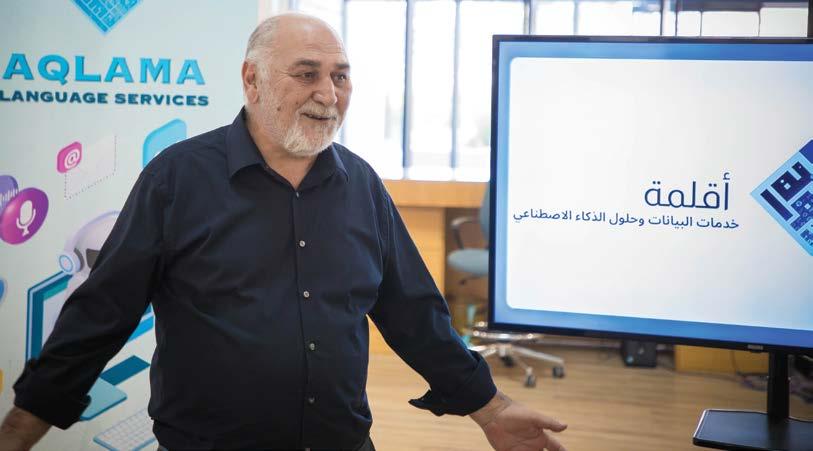
}“Aqlama essentially specializes in providing curated and structured high-quality data for AI and machine learning (ML) training purposes,” says Dr. Fayeq Oweis, founder and CEO of Aqlama. “Our services include the collection of data (voice, text, and images), transcription, annotations, localization, translation, and content development. We collect our own curated data, based on specific languages/ dialects or industries. This data can then be used to train virtual assistants, chatbots, sentiment analysis, speech-totext, and content generation models. Aqlama thus aims to resolve the problem of the lack of high-quality and structured data for AI developers, especially for dialects and specific industries.”
}Now, before further exploring Aqlama’s offerings, it is perhaps more important to first understand Dr. Oweis’ journey in this field. During his tenure as a Language Manager at Google (one that lasted 10 years), Dr. Oweis was primarily responsible for launching many of Google’s products and services in Arabic and other languages. In an overall career that has surpassed two decades, he has also managed large teams of translators and language specialists covering 45 languages. It is this wealth of
knowledge that Dr. Oweis used to get Aqlama off the ground five years ago, and it isn’t very surprising, then, to hear his response to being asked about his company’s unique selling proposition. “Our strength lies in our knowledge, experience, and the resources we use to curate and collect high-quality structured data!” he declares.
}Built as a data as a service (DaaS) company that collects and validates speech datasets for AI and ML systems, Aqlama focuses on building industry-specific virtual assistants by enhancing language, dialect, and voice-based technologies. “We have a business-to-business (B2B) business model, and our services are provided based on the amount of collected data,” Dr. Oweis explains. “For example, speech data collection is sold per hour of audio, while text collection is priced per word, or per pairs of questions and answers.” So far, this operational model has held Aqlama in good stead as a business. “We are a revenue-generating business, having generated about US$5 million in the past four years,” Dr. Oweis shares. “We have not received any investments, but have received a few grants for a total of $100,000. Currently, the Aqlama team has eight full-time employees and thousands of contract workers. Additionally, the business has been valued at $7.5 million by experts based on existing and potential revenues.”
}At the same time, Dr. Oweis and his team are also working on what they are calling the Aqlama Platform, which shall be an automated version of its existing offering. “We have been using manual processes in the data-collecting phase, but we now want to create an innovative platform to automate the process,” Dr. Oweish says. “The new platform will provide data contributors and data users with an easy-to-use process and access to high-quality and structured data.” Plus, in a bid to expand Aqlama’s services to a wider audience, Dr. Oweis is now making its way to the UAE- a move that has been aided through the startup’s participation in the MBRIF Innovation Accelerator. “We joined this program to learn more about entering the UAE market, and to hopefully get introduced to a network of potential clients,” he adds. “Our journey has been mostly in Palestine, and we want to expand and have a presence in Dubai to be able to serve the Emirati market. We believe this is the right time to enter the UAE market, especially having worked for one UAE-based client already.”
Anyone who has frequented the roads of the UAE—or any nation for that matter—must have noticed how puffs of gray or black smoke often linger in the air long after it has come out of a gigantic truck. But did you know that although heavy-duty vehicles like trucks and buses make up less than 8% of vehicles (excluding two- and three-wheelers) globally, they are responsible for more than 35% of direct carbon dioxide (CO2) emissions from road transport? ”
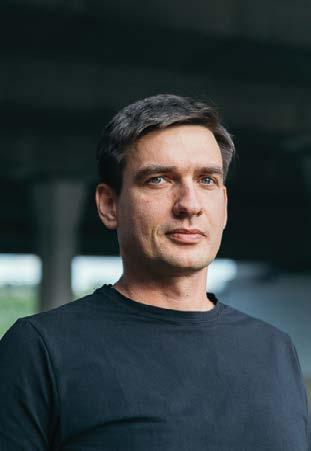
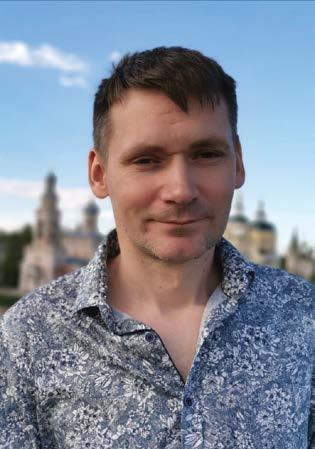
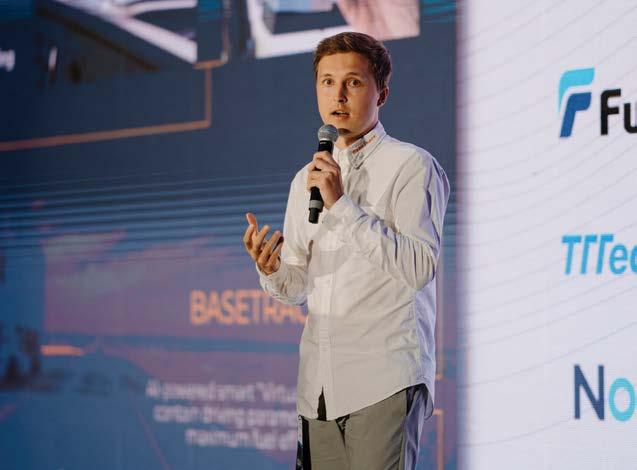
}That statistic is as per a 2023 report by the International Energy Agency (IEA), a Paris-based organization that works with governments and industry stakeholders to offer policy recommendations and analysis on the global energy sector. The same IEA report highlights how stringent carbon emission policies are required to decarbonize the trucks industry—a mission that aligns well with that of Estonia-headquartered startup BaseTrack, which offers fuel economy solutions and transport management systems that can help trucking companies reduce fuel consumption and CO2 emissions.
}“We make the trucking industry more efficient and safe by improving the [work of] the drivers behind the wheel,” explains Ilya Klyuev, co-founder and Chief Development Officer of BaseTrack. “Trucks are very important, and they offer a big market with many opportunities—over 70% of goods are moved by trucks in the US alone, as per a study by the American Trucking Association. But these vehicles are not safe, and they emit a lot of CO2. So, we found a way to improve it for a better future, giving trucking companies not just sustainability, but also financial benefits. BaseTrack offers fuel economy solutions and a comprehensive transport management system to make humandriven trucks fleet more efficient.”
}Founded in 2019, this startup offers what it calls the BaseTrack Smart Freight (BaseTrack SF) solution,
which offers real-time driving recommendations and efficient cruise-control calculations using a combination of internal and external parameters such as temperature/weather and road conditions. For example, using digital maps of roads, the BaseTrack SF tool, which is a device integrated into the truck’s system with a screen for the driver to monitor, will show optimal speed (i.e whether the driver needs to speed up or slow down on a given road) using easy color prompts which can be easily understood by the driver without focusing too much on the screen. The software also takes into account factors such as a given truck’s load and engine characteristics, and using this, the BaseTrack SF solution offers the driver suggestions on how to optimally drive trucks in a way that ensures sustainable fuel consumption while simultaneously ensuring logistics-related requirements are adhered to. “Our products make drivers more efficient, and eventually reduce fuel consumption and CO2 emissions of our customers’ fleets,” Klyuev adds. “We provide it as a service and charge clients a monthly or annual fee. For clients, the system pays off within a couple of months!”
}But the BaseTrack SF solution isn’t the startup’s only endeavor in trying to address the issue of carbon emissions in the trucking
industry. You see, the technology used in this particular device is actually a simpler version of what is used for BaseTrack’s long-term goal: autonomous truck services. Indeed, Klyuev and his team’s ultimate goal is to ensure a transition from human-driven trucks to fully automated fleets that can be managed remotely and with reduced CO2 emissions. “We are already the leading provider in multiple regions, and our automated trucks have actually delivered commercial goods on public roads,” Klyuev reveals. “But the business model topic is yet quite tricky, as we are still working on the regulations for autonomous trucking and hope to figure out how the future of trucking will look. Right now, we own our own autonomous trucks, and provide those to customers (shippers) as a traditional subcontractor (i.e. a transport company), but we are working with our partners and the government to shape the sustainable future trucking ecosystem. In the UAE, we have already performed public autonomous trucking demonstrations and test drives for clients in areas such as Ras Al Khaimah Economic Zone, Dubai South, and even in some parts of the desert.”
}Now, although BaseTrack’s enthusiasm for an automated trucking industry is a major driving factor for the enterprise, its
vision remains quite grounded in reality. For starters, the startup’s official website itself mentions that now is “not the time for autonomous driving.” To get to that final destination, Klyuev believes that BaseTrack SF is the perfect tool to induce a gradual transition. “You see, the same technology that is capable of providing partial or full automation of trucks is currently being used to focus on safety and efficiency,” Klyuev explains. “To provide fuel economy solutions, we use a simplified version of our advanced autonomous trucking technology, so we actually slowly prepare the industry for a transition to autonomous trucks.” And while it may be easy to conflate the negation of human-driven trucks with a removal of jobs, Klyuev assures that that is far from the case. “Our end users right now are drivers—we constantly interact with them, and exchange experiences,” he explains. “There is no autonomous driving without adopting the human-driving experience. We thus aim to act as a bridge that will transform regular drivers to remote operators, and then maybe to autonomous fleet managers.”
}Upon the observation that “the UAE has great potential for technology startups like ours,” BaseTrack moved not only its core team, but also its research and development (R&D) facilities to the
UAE in 2023. According to Klyuev, it has been the BaseTrack team’s initial successful run in Europe—which includes a year-long “hobby phase” from 2017-18 where they put their collective geoinformatics experience to create their own autonomous car—that has brought about the company’s confidence to scale into the UAE and the wider Middle East. This wealth of experience within its core team has also ensured that, so far, BaseTrack delivers a one-of-its-kind solution to the region. “We provide the most efficient eco-driving solution on the European market in terms of fuel efficiency, and it fits mixed fleets or older trucks as an aftermarket solution, which is unique,” Klyuev says. “Generally, our technology was the first all-weather autonomous driving technology, we demonstrated it back in 2017, when it was just our hobby, and still, we are the only company that operated in harsh weather conditions (heavy rains, snow, ice, desert). In the GCC, we are also the first company invited to make an autonomous trucking demonstration on public roads. And so, in the UAE, we don’t have competitors yet.”
}But all of this hasn’t meant that it has been a hurdle-free ride for BaseTrack in the UAE. “Some of the challenges in the UAE are related to the process of opening bank accounts, setting up the office (due to bureaucracy, and excessive unexpected fees at every stage in our case), and getting a local driving license (as usually you can’t use your national one),” Klyuev says. “We also saw that the venture capitalists are yet not ready to invest in the long-term; every investor is looking for short-term returns, and wishes to invest in software/software as a service (SaaS) or B2C solutions that are already generating revenues. Nevertheless, the UAE has business-friendly tax policy, access to funding, and a bright vision for the future and innovations.” Indeed, one UAE-based program that has shown interest in BaseTrack’s long-term goals is the MBRIF Innovation Accelerator. “It seems generally known among startups in the UAE that MBRIF is the best place for startups to grow in the country (and even outside), as they provide great support, and the program is offered at no cost for startups,” Klyuev says. “The MBRIF program is supported by the government, the team has leverage to connect startups with the best mentors or partners, and the amount of knowledge and connections is truly impressive. As we already started to participate and receive the perks of the program, we have only positive feedback!”
}Having already raised US$3 million in funds so far, the company is now looking to raise a further $5.4 million. But as BaseTrack sets out on the next leg of its journey, Klyuev emphasizes that the team will aim to achieve its dreams of an automated trucking industry while maintaining a realistic approach. “Our company has always been focusing on efficiency, and kept the headcount under 25 employees,” Klyuev says. “Nevertheless, our ambitions and technical advantage helped us to lead in the field of all-weather autonomous driving, and later, autonomous trucking. The company, in contrast to the US-based moonshots, diversified its product offering, and commercialized both short-term and long-term products. With that, we are confident that we can become a unicorn within a few years.”
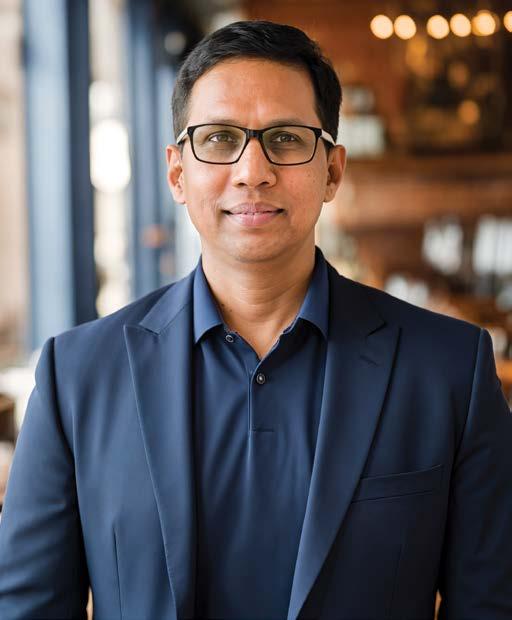
/ bigdot.ai/
Positioning itself as the “ultimate super app for small businesses,” USheadquartered BigDot was incorporated in 2021 with a mission to help small and medium enterprises (SMEs) digitally transform and grow their brands. “We empower small enterprises to break free from aggregators, own their customer relationships, and eliminate commission fees,” explains Mahesh Prajapati, founder and CEO of BigDot. “Using the BigDot platform, businesses can boost sales, and drive growth effortlessly. Our goal is to become the go-to operating system for small businesses worldwide, enabling them to thrive in the digital marketplace. Our global headquarters is in the United States, and our regional head office for the Middle East and Africa is in Dubai. We also have offices in Qatar, Kuwait, and India.”

digital transformation, through which we provide tools that help MSMEs build a digital brand, sell online, book appointments, engage non-stop with customers, and stay regulatory-compliant,” Prajapati says. “Our second offering is frictionless e-payment solutions that allow businesses to accept both card-present and card-not-present payments seamlessly. Apart from regular transactions, we integrate hitherto untapped, small transactions into the e-payments ecosystem, making digital transactions convenient for both customers and businesses. Our commitment to creating a less-cash economy is at the core of our mission. Third, and finally, we offer financial inclusion tools wherein we enable access to financial services through the BigDot Blockchain.”
}All of these services, Prajapati says, have been built by solely keeping the digital needs of MSME merchants at the forefront— which is also precisely what the founder believes is his startup’s most important differentiating factor. “From the outset, our focus is on increasing the revenues and profits of small businesses through digital transformation,” he reiterates. “With BigDot, small businesses own their customer relationships, pay no commissions, and keep all their profits. However, BigDot is not just a digital transformation platform; it also provides a strategic roadmap for small businesses to grow. We offer a suite of nine premium quality, interoperable tools, including a unique customer engagement platform that supports physical, digital, and
IS A COMPANY TO WATCH FOR ITS REMARKABLE GROWTH POTENTIAL, IMPACTFUL INITIATIVES, AND DEDICATION TO CREATING A HAPPY ECONOMY SUPPORTED BY THRIVING SMALL BUSINESS OWNERS.”
}BigDot’s decision to choose the UAE as its regional headquarters should perhaps come as no surprise. In April 2024, following a number one global ranking for the third consecutive year by the Global Entrepreneurship Monitor report for 20232024, the UAE’s Minister of Economy, H.E. Abdulla bin Touq Al Marri, renewed the government’s vow to provide support to SMEs while acknowledging “their key role in fostering a competitive knowledge-based economy.” At the end of 2022, the number of SMEs in the UAE stood at 557,000, accounting for 63.5% of non-oil the UAE gross domestic product. BigDot’s entry into this market thus comes at a pivotal time. “A happy small business [sector] leads to a happy economy,” Prajapati adds. “That’s why governments and financial institutions worldwide are focused on micro, small and medium enterprise (MSME) empowerment. BigDot is on a mission to empower small and medium businesses to run profitable operations without relying on resource-heavy aggregators, contributing to a less cash-dependent economy. Of course, serving the bottom of the pyramid is challenging, but our drive comes from the significant impact we can make on the broader economy through BigDot.”
}BigDot has thus set out to achieve its goal of SME empowerment through a three-pronged strategic approach. “The first is
social engagements. BigDot is thus easy to use, affordable, and extensible, positioning itself to become the de-facto operating system for MSMEs in the near future.”
}With this operating model, BigDot has six main streams of revenue: sales of BigDot products/services, commissions on digital payments, advertisements that are placed on BigDot’s marketplace, lead generation from its aggregator platforms, value-added services on the BigDot platform, and lastly, customization options that can tailor online interactions to meet individual customer needs. “We also leverage artificial intelligence to provide targeted and personalized recommendations and offers,” Prajapati adds. “With these six key channels, BigDot operates on a recurring revenue model, with most products and services requiring annual renewal. This diversified revenue model ensures sustainable growth and continuous support for our small business clients.”
}Having successfully onboarded 30,000 small businesses onto its platform since 2023, BigDot currently has 11,000 active clients using it, and approximately 2,000 paying customers. “To date, we have raised a modest US$1 million in investments, primarily from friends and family,” Prajapati adds. “Our team is
notably diverse, with over 50% female members in our 40-person team. Our presence spans 20 countries in the Middle East and Africa alone, and we’ve recently partnered with a premium bank in Qatar to roll out BigDot across the entire nation. Although BigDot is a global company, our current focus is on the Middle East and Africa, which present unique challenges due to their specific language, cultural demands, and developing regulatory and digital infrastructure.”
}In expanding its operations across the UAE, BigDot has found a reliable ally in the MBRIF Innovation Accelerator program. “Being a part of the MBRIF’s eighth cohort makes our association with Dubai even sweeter,” Prajapati says. “The quality of mentorship we’ve received so far has been incredible. There are three top outcomes we expect from this program: access to key partners such as telcos, MSME-focused banks, and government departments; strengthening and establishing our brand for a global launch; and securing essential financial support and access to funding for our growth.”
}With these goals in mind, and a definitive business model in place, Prajapati is assured that his startup is well prepared to create a tangible impact on not just the regional market, but beyond it too. “BigDot is a company to watch for its remarkable growth potential, impactful initiatives, and dedication to creating a happy economy supported by thriving small business owners,” he declares. “With our innovative solutions and focus on empowering MSMEs, we are poised to make a significant difference in the global market.”
/circabiotech.com/
In April 2024, a World Economic Forum report likened the circular economy model’s business impact to that of the digital pioneers in the early 1990s that were agile in adapting to internet and digital technologies. The report then goes on to declare that companies that embrace the shift towards a circular economy “will lead in innovation and market share, much as early adopters of digital technologies outpaced their peers.” It is within such an ecosystem that UAE-based biotech startup Circa Biotech has stepped up with its innovative premise. “At Circa Biotech, we transform organic food waste into valuable resources such as sustainable aviation fuel (SAF), insect protein for animal feed, and organic fertilizer, using innovative biotechnology and the black soldier fly larvae [a species of insects, completely harmless to humans, that can compost waste or convert organic waste into animal feed],” explains co-founder and COO Dr. Liudmila Prozorova. “We aim to tackle the global issue of food waste and its environmental impact by converting it into sustainable products. Inspired by the urgent need for innovative solutions to reduce greenhouse gas emissions and promote a circular economy, we strive to address the inefficiencies in waste management, and the growing demand for renewable energy and sustainable agriculture.”
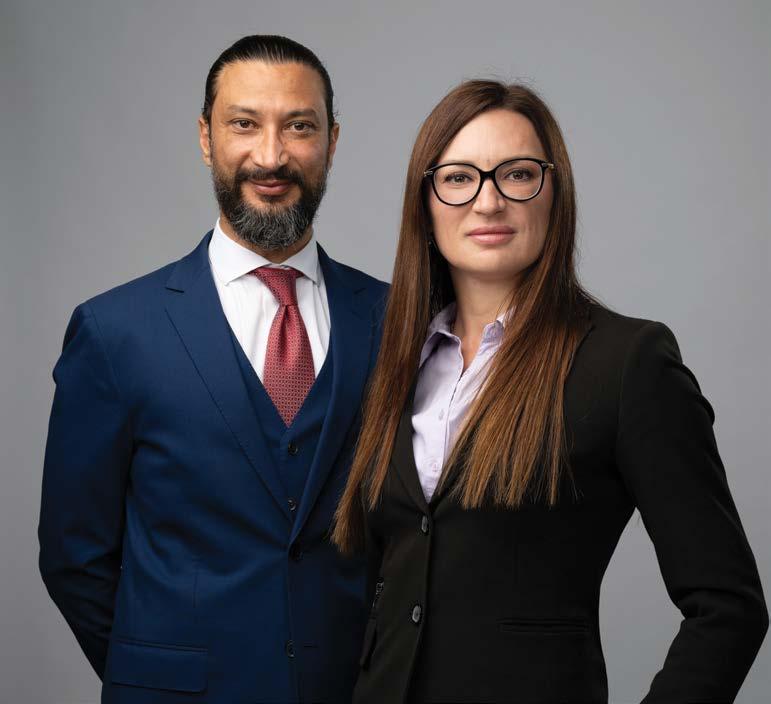
Biotech, a UAE-headquartered startup that transforms organic waste into valuable resources like sustainable aviation fuel (SAF), insect protein, and organic fertilizer.
}Launched in 2020 in the UAE’s capital city of Abu Dhabi, Circa Biotech was created with the aim to create a circular economy where waste is minimized, natural resources are optimized, and efficient environmental management is thus at the forefront. The startup has set out to do this using four main services— which are also its primary sources of revenue. “The first service is the waste processing one, wherein we receive fees from municipalities and businesses for processing organic waste,” Dr. Prozorova says. “Next, we supply SAF feedstock for SAF producers and distributors, as well as insect protein, which is primarily a high-quality protein meal that is delivered to animal feed manufacturers. Lastly, we provide organic, nutrient-rich fertilizer to farmers and agri-businesses. Our unique value proposition, however, lies in our patented processes, and in achieving a 23% cost reduction. We believe we are pioneers in insect farming in the Middle East, and we integrate waste management, renewable energy, and sustainable agriculture into a circular economy model.”


WE BELIEVE WE ARE PIONEERS IN INSECT FARMING IN THE MIDDLE EAST , AND WE INTEGRATE WASTE MANAGEMENT, RENEWABLE ENERGY, AND SUSTAINABLE AGRICULTURE INTO A CIRCULAR ECONOMY MODEL.”
}Prior to reaching such a market position, however, Dr. Prozorova notes that setting up shop in Abu Dhabi wasn’t necessarily a linear process. “It has been a journey of navigating regulatory landscapes and building local partnerships, with the biggest challenges including market penetration and scaling operations,” she adds. “However, the benefits are substantial, including access to a supportive ecosystem, strategic location, and robust infrastructure, all of which have propelled our growth and innovation.” Circa Biotech’s ambitions were also welcomed by the MBRIF Innovation Accelerator, where the startup is currently enrolled. “We chose the MBRIF program specifically for its
comprehensive support in scaling innovative solutions,” Dr. Prozorova adds. “The MBRIF offers not only funding but also mentorship, networking opportunities, and strategic guidance, aligning perfectly with our growth objectives and mission to drive sustainability.”
}Armed with its plans for the future, as well as the extra preparedness it has received through its time at the MBRIF program, Circa Biotech’s next step is set to be further expansion—which shall start with operations in a new Emirate. “Currently, Circa Biotech is in the growth phase, with a team size of seven dedicated professionals,” Dr. Prozorova says. “We have completed our seed


↑ Circa Biotech supplies feedstock for sustainable aviation fuel, as well as insect protein, which is a high-quality meal that is delivered to animal feed manufacturers. The startup also offers organic, nutrient-rich fertilizer to farmers and agribusinesses.
funding round, and we are preparing for a Series A round to scale up our operations. Our new processing facility in Al Ain, set to launch by the end of 2024, will significantly increase our capacity, positioning us for long-term impact and profitability.” And while it is a tech-driven startup, Circa Biotech is making it a priority to always remain connected to the communities it aims to serve. “Innovation is certainly central to our success, driving continuous improvement in our processes and products,” Dr. Prozorova says. “But technological advancements aside, we maintain a human connection through community engagement programs, educational workshops, and transparent communication with our customers and partners.”
/crossval.com/
Imagine if finance teams could spend less time stuck in low-impact tasks, and more on making strategic decisions!” With this singular statement, CrossVal founder and CEO Ajinkya Tanpure makes a compelling case for his UAE-based enterprise, which offers a software as a service (SaaS) platform that automates financial planning and analysis for companies. “The thing is, as much as 70% of finance team hours are lost on low-value spreadsheet tasks, with most companies in the region facing the same challenge,” Tanpure explains. “I myself was actually one of the individuals carrying out these low-value spreadsheet tasks, and the realization that I can solve the problem for myself and many others is what inspired me to take on this entrepreneurial journey. At Crossval, we thus save chief financial officers (CFOs) and finance teams over 120 hours a month, empowering them to operate as decision makers, as opposed to record keepers.”
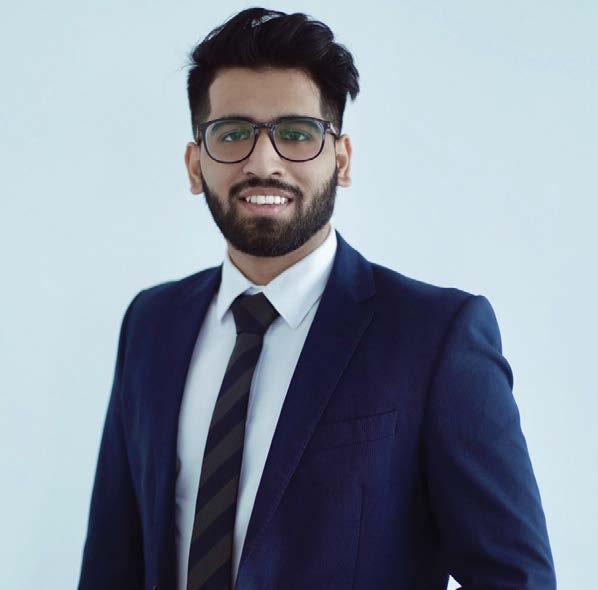
}Launched in 2021, Crossval is based out of the Dubai International Financial Centre (DIFC), and it aims to replace time consuming, manual, and error-prone spreadsheet work with easy financial modeling options. Using its platform, finance teams can quickly identify discrepancies between budgeted figures and actual results, and thus spend less time reconciling accounting numbers, and instead allocate their efforts towards gaining valuable business insights using the data they obtain. The startup also offers artificial intelligence (AI)-powered tools that can simplify and quicken the process of financial reporting, compile the latest information about investors, and also draft presentation slides for any potential pitch decks. Finally, Crossval also provides fractional CFO tools, wherein businesses can leverage the expertise of a team of seasoned CFOs that can deliver tailored solutions for a given business’ unique challenges, but without having to allocate a full-time CFO’s remuneration. “Our primary focus is on the small and medium enterprises (SMEs) that generate anywhere between US$100,000-$10 million in annual revenue, and have finance teams of two to 10 people, which form the backbone of the UAE economy,” Tanpure adds. “However, our platform is also used by a few select large enterprises that generate more than $10 million in revenue and comprise finance teams of 10+ people.”
}So far, Crossval’s comprehensive business model has ensured that the enterprise is off to a good start. “We have already signed Cafu and Unifonic as paying users of our product, and these two companies are currently our flagship clients in the UAE and KSA respectively,” Tanpure shares. “CrossVal has also been recognized by Deloitte as one of the top 50 fastest growing startups in the region. We are also proud to state that we completed an enterprise proof of concept that saved a finance team 624 hours and $10,000 monthly by implementing an automated workflow with CrossVal. Additionally, we’ve currently got a sales pipeline that’s filling up fast with companies like Zurich Insurance, Samsung Gulf, Hilti Engineering, CityMax Hotels, and more. In December 2022, we closed a pre-seed funding round of $250,000, and although our current annual recurring revenue (ARR) is at $120,000, our forecast for this year, as we unlock enterprise contracts, is an ARR of $1 million!”
}All of these achievements, of course, have played a role in CrossVal clinching a place in the ongoing cohort of the MBRIF Innovation Accelerator. But Tanpure’s association with the program goes back much further. “I’ve actually been a part of the MBRIF program as a mentor in the past, and I have always valued the hyper-tailored, supportive and resource-
rich framework,” he reveals. “The benefits of the network and hands-on support made it an attractive choice for CrossVal as we build the future of finance for the Middle East.” Having the MBRIF’s support has been vital in Tanpure’s journey in navigating the UAE’s business landscape, the founder adds. “We’ve been very lucky to have support from the ecosystem in the form of partnerships, investors, and—most importantly as a founder—good founders and peers to learn and grow with,” he continues. “Setting up in the DIFC Innovation Hub has also enabled a lot of our success, but in addition to that, the general startup ecosystem has been great too! Of course, we’ve had a few challenges: finding the right tech talent (quickly!), operational costs could be lower, and raising capital could be simpler. But these continue to move in a positive trend as we mature.”
}As he and his team at Crossval now look to the future, Tanpure says that the startup will aim to continue to leverage technological innovation, while keeping human connection at the heart of it all. “Although humans are great at what we do based on our intellect, emotion and drive are things AI can’t do (yet)!” he continues. “That’s how we see our product too. It automates the boring stuff so that finance teams have more time and energy to strategize and think creatively. All our touchpoints with end users are 100% human; in fact, that’s how we learn from our users, and build according to their needs. We’ve done this from day zero of the company, and we are obsessed with maintaining this as we scale. We’re building the future of finance for the Middle East, and the way to do that is to lead with a customer-centric approach that’s supported and enabled by tech.”
Analyzing artificial intelligence’s radical reinvention of software as a service by
JONATHAN LABIN
Is the rise of artificial intelligence (AI) putting software as a service (SaaS) on life support, or is it catapulting it to new heights?
The answer seems to depend on where you’re standing.
If you tune into the global tech conversation, you’ll hear a pessimistic narrative. Many commentators are predicting that AI will be the death knell for SaaS as we know it. This pessimism isn’t just talk though—SaaS multiples have indeed collapsed to 5.2x revenue, which are well below levels during the COVID-19 crisis, and even before it.

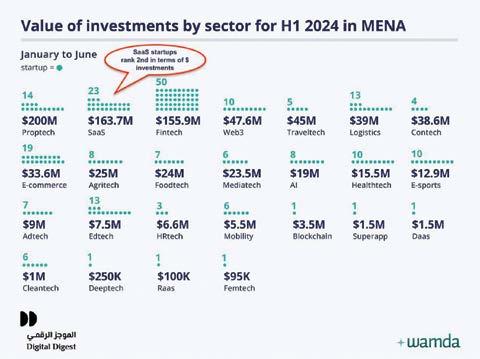
↑ Ci caption pplz
Yet, in the Middle East and North Africa (MENA) region and other emerging tech markets, SaaS is one of the hottest startup categories, with founders and investors buzzing with excitement.
How can these conflicting narratives be reconciled? If SaaS is truly on its last legs globally, what does this mean for regions like the MENA that are just beginning to build their software ecosystems? And perhaps most intriguingly, could the rise of AI in software development present an unprecedented opportunity for these emerging tech hubs?
While cyclical factors like spending shifts from “traditional software” to AI pilots, longer sales cycles, and high interest rates explain part of the cooling SaaS sentiment, two fundamental arguments make a more existential case against the future of SaaS.
The first argument suggests that general AI systems will become so proficient at a wide array of tasks that they will effectively replace specialized SaaS applications that leverage AI. This isn’t just about raw capabilities. The intuitive, conversational interface of
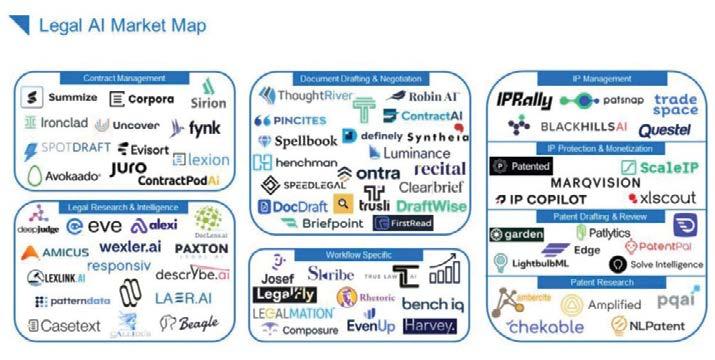
AI systems could make traditional SaaS feel clunky and tedious by comparison. However, the software industry has long alternated between specialized solutions and broader, bundled offerings for good reason. While all-encompassing AI systems have their merits, specialized offerings that effectively integrate cutting-edge AI will retain distinct advantages:
} USER EXPERIENCE (I.E. THE POWER OF LESS) Simplicity often trumps all-encompassing complexity. Many “super apps” fail because user experiences that try to do everything often excel at nothing.
} HYBRID USER INTERFACE ADVANTAGE
Natural language isn’t the gold standard for all interactions. The future likely combines natural language with purpose-built graphical interfaces, a mix that specialized SaaS products are uniquely positioned to offer. For example, Sestek, a conversational AI company, demonstrates this by blending domain-specific user interfaces with natural language interactions in customer service, thereby optimizing agent support.
} POWER OF TARGETED SOLUTIONS
Businesses prefer targeted solutions to vague, all-encompassing promises. SaaS products excel at addressing specific pain points.
} DOMAIN-SPECIFIC EDGE Effective AI solutions require more than advanced models. Domain-specific data and integrations are equally crucial. Specialized software solutions powered by AI have the upper hand here, particularly in areas not
prioritized by general-purpose AI systems.
THE COMMODITIZATION OF SOFTWARE: CAN SAAS ESCAPE THE FATE OF MEDIA?
Chris Paik from Pace Capital presented a second fundamental argument against a thriving software ecosystem in his piece, The End of Software. He contends that AI will drive software creation costs to near zero, commoditizing the industry and eroding companies’ ability to charge premium prices much like the internet did with media. Paik envisions software companies being replaced by AI-powered “platforms” that dynamically solve customer problems.
While thought-provoking, this argument misses key factors that will allow SaaS companies to thrive in an AI-driven world:
} BEYOND COST (I.E. THE TRUE DRIVERS OF SOFTWARE PRICING) Software pricing is determined by the value it creates, not production costs. Like premium media content, businesses will pay for SaaS products that solve real problems effectively and create tangible value in a differentiated manner.
Even if software development becomes commoditized, SaaS companies can still differentiate through superior product management, user experience, system architecture, and data science. Traditional software moats like deep integrations, network effects, unique datasets, customer relationships, localization, and brand trust will persist, especially in enterprise
software. These differentiators and moats will allow specialized software companies to coexist with hyperscalers and large platforms. The software industry has long adapted to the presence of these larger players by being nimbler, faster, and by offering specialized solutions that larger entities can’t or won’t provide. This dynamic won’t change in the era of AI.
While software isn’t dying, it’s poised for a revolutionary transformation. AI isn’t just another tool; it’s a catalyst that will fundamentally reshape the entire software industry. While this transformation may spell doom for laggards, it presents an unprecedented opportunity for agile players willing to reinvent themselves. This revolution goes beyond merely enhancing existing software solutions. Through cutting-edge AI capabilities, SaaS companies are poised to tackle entirely new challenges cost-effectively, penetrating markets previously untouched by software. Take the legal sector, for instance. The US has seen a proliferation of AI-powered legal software companies, with dozens of startups tackling various aspects of legal work.
This trend isn’t limited to the US. In the UAE, Specter is differentiating itself by using local templates and legal datasets to improve accuracy and relevance in the Middle Eastern context. This approach demonstrates how SaaS companies can create significant value through regional specialization, even in a globally competitive market.
The transformation extends to business models as well. We’re witnessing a shift from user and seat-based pricing models to more dynamic pricing structures based on usage and outcomes. This evolution allows software companies to align their revenue more closely with the actual value they create, opening up new avenues for growth and customer satisfaction.
Perhaps most thrilling is the democratization of software development. AI is lowering entry barriers across the globe, potentially igniting a new wave of SaaS entrepreneurship in regions traditionally underserved by the tech industry.
The Middle East, like many emerging tech markets, is experiencing impressive growth, but it still grapples with building a robust software ecosystem. However, the advent of AI-powered development tools and end-to-end software agents could be a great equalizer—and the catalyst for a transformative leap.
These AI-powered tools, which assist with code generation, bug detection, and automated testing, are lowering entry barriers across the globe. They enable Middle Eastern entrepreneurs and businesses to prototype, develop, and deploy sophisticated SaaS solutions with smaller, more focused teams of software developers. While not a silver bullet, this technological democratization will allow Middle Eastern companies to compete more easily on a global scale.
To be clear, software development is not the only skill gap emerging software ecosystems need to address. To fully capitalize on the opportunity ahead, the focus must shift from traditional coding to a broader set of critical competencies:
} STRATEGIC
Understanding user needs, prioritizing features, and crafting intuitive experiences become paramount.
} AI-AUGMENTED ENGINEERING The emphasis moves towards system design, AI or
machine learning integrations, and effective collaboration with and oversight of AI systems.
As AI drives more decision-making, the ability to work with and interpret data becomes crucial.
Future software professionals must evolve from code writers to strategic architects, excelling at conceptualizing needs and solutions, and orchestrating AI to bring innovative ideas to life. They’ll need to become adept at using AI-powered development tools as force multipliers, allowing them to compete effectively in the global SaaS market.
We should focus on fostering these skills through education initiatives, startup incubators, and public-private partnerships. Creating a supportive ecosystem for AI-driven SaaS innovation, including access to and training on cutting-edge AI tools, could position the Middle East as a
future hub for global SaaS development.
In conclusion, SaaS isn’t dying–it’s changing, and it’s changing fast.
The past couple of years saw AI core infrastructure providers reaping the initial benefits of the AI revolution. As recent developer conferences from Apple and Microsoft have shown, we’re now entering the edge AI phase, with AI-powered smartphones and PCs on the horizon.
However, we’re approaching another inflection point. The coming years will witness a significant shift towards the AI software applications phase, with increasing value accruing to the software layer.
This integration of AI into SaaS is not just an incremental change; it’s catalyzing a new era of innovation, promising software solutions that are more efficient, intelligent,
and accessible than ever before.
Equally excitingly, this evolution could democratize software development on a global scale, allowing regions like the Middle East to more easily become major players in the SaaS economy.
The future of SaaS is AI-driven, globally distributed, and brimming with potential. It’s time to embrace this change, and shape the next generation of software solutions. The AI SaaS revolution is just beginning–and this time, everyone’s invited.
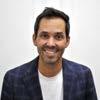
Jonathan Labin has over 20 years of leadership experience as a tech executive, advisor, board member, and investor. Currently, he serves as a strategic advisor to Unifonic and as a board member at Sestek. Previously, he was the President of Unifonic, and the Managing Director of Meta in the MENA. unifonic.com
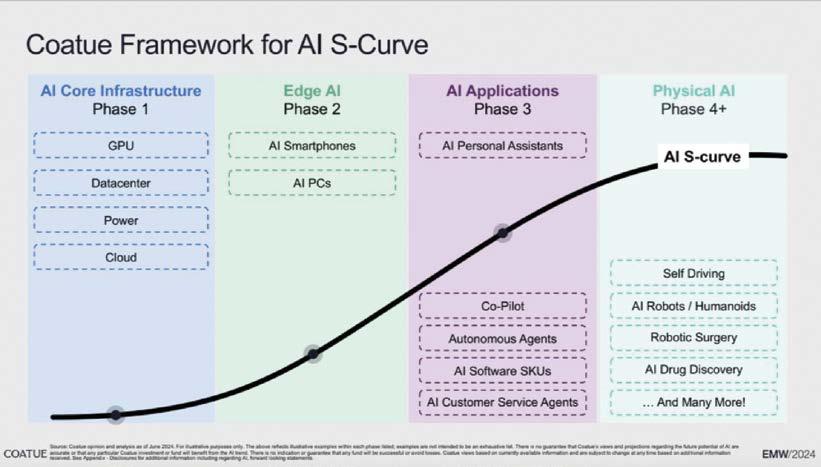

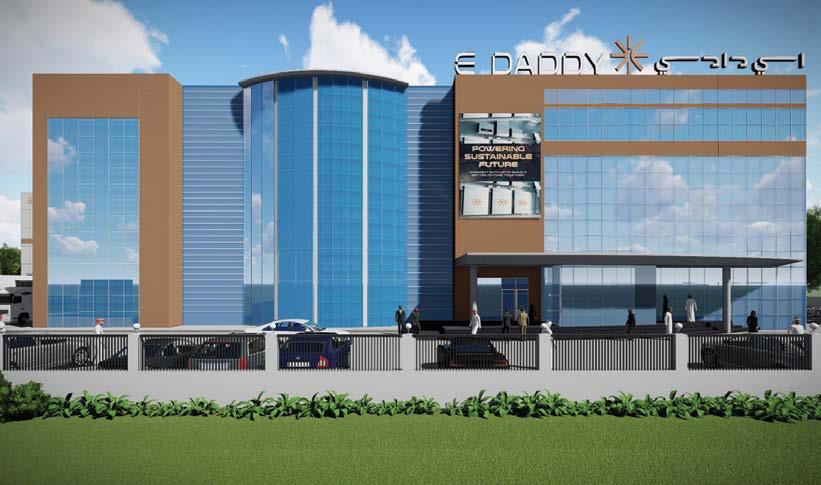
EDaddy, a UAE-headquartered business that manufactures two-wheeler electric vehicles (EVs) in Dubai, has raised US$15 million in a funding round. The investment is set to accelerate E Daddy’s endeavors towards becoming a recognized EV manufacturer in the UAE and the wider GCC and Africa regions.
The key investors who participated in the round were Kabeer Khader and Kabeen Khader -Chief Exective Officer and Chief Operating Officer, respectively- of Euroblast Middle East LLC, a UAE-based design engineering and solution provider that caters to the blasting and coating industry.
Founded in 2023 by Mansoor Ali Khan Abdul Buhari and Yasmeen Jawahar Ali, E Daddy aims to make sustainable urban mobility an accessible option not just for corpo rate industries, but for the general public as well. The company has already set up two Dubai-based state-ofthe-art facilities in this regard- one in Dubai Industrial City, and the other in National Industries Park.
In the first quarter of 2025, E Daddy will officially debut its purely electric motorcycle, a vehicle that has been engineered to emit zero tailpipe emissions, and is thus expected to reduce annual carbon emissions by 0.6 million tons. “Our





